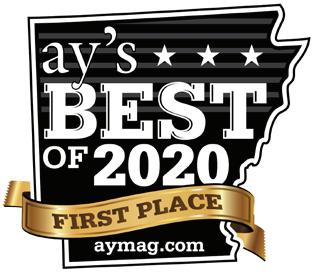TYSON CFO
JOHN R. TYSON

TYSON CFO
JOHN R. TYSON
For Tyson Foods, ‘best is yet to come’
INSIDE: Poultry Palooza | Most Admired Companies | Real Estate


















As a rm built on relationships, our handshake matters. It means a warm greeting, the privilege of doing business together and knowing you can count on us. A handshake between two brothers, Witt and Jack Stephens, provided the foundation for a family-owned legacy that Jack’s son Warren upholds today. Under Warren’s leadership, Stephens continues to grow as one of America’s largest privately held independent nancial services rms, with of ces throughout the United States and in Europe. Our performance builds relationships with our clients, many of whom have become old friends. It’s why shaking hands with us means just a little bit more.

111 Center Street




Little Rock, AR 72201

(800) 643-9691









FEATURES JUNE 2023
REAL ESTATE
Developers have taken an interest in reviving Little Rock’s Capitol Avenue corridor as well as the city’s most iconic retail destination, Park Plaza.

The poultry industry is one big family, its members insist, where business is good. And Arkansas is a prominent member of the family.

OUTDOOR REC
Arkansas, its northwest corner in particular, continues to climb the ranks of the world’s most prestigious biking destinations.

Jimmy Moses and Rett Tucker, developers extraordinaire, are a couple of hometown kids who didn’t forget their roots when they grew up.
We asked, you answered. AMP readers voted for the companies they admire most in a host of industries, from architects to office supply.
PRESIDENT & PUBLISHER
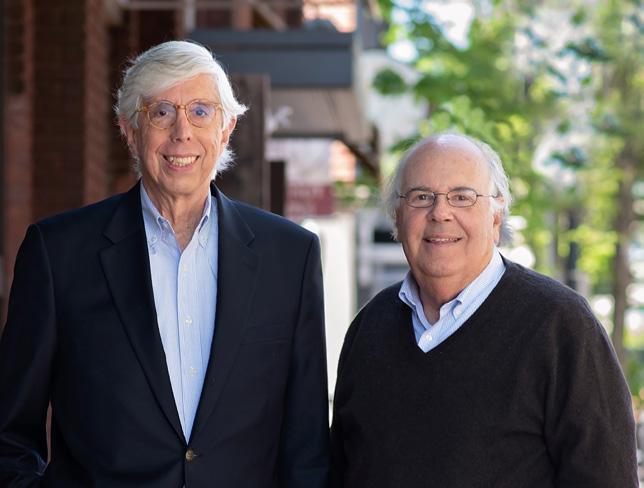
Heather Baker | hbaker@armoneyandpolitics.com
SENIOR EDITOR
Mark Carter
EDITORIAL SERVICES
Ya!Mule Wordsmiths | Little Rock
ASSOCIATE EDITORS
Sarah Coleman | scoleman@armoneyandpolitics.com
Mak Millard | mmillard@armoneyandpolitics.com
STAFF WRITERS
John Callahan | jcallahan@armoneyandpolitics.com
Katie Zakrzewski | katie@armoneyandpolitics.com
MANAGING DIGITAL EDITOR
Kellie McAnulty | kmcanulty@armoneyandpolitics.com
Southland Casino Hotel has completed its massive expansion, and the new 20-story hotel is helping make West Memphis its own destination.
ONLINE WRITER
Kilee Hall | khall@armoneyandpolitics.com
PRODUCTION MANAGER
Mike Bedgood | mbedgood@armoneyandpolitics.com
GRAPHIC DESIGNER
Lora Puls | lpuls@armoneyandpolitics.com
SENIOR ACCOUNT EXECUTIVE
Greg Churan | gchuran@armoneyandpolitics.com
ACCOUNT EXECUTIVES
Tonya Higginbotham | thigginbotham@armoneyandpolitics.com
Mary Funderburg | mary@armoneyandpolitics.com
Colleen Gillespie | colleen@armoneyandpolitics.com
Dana Rodriquez | dana@armoneyandpolitics.com
Jona Parker | jona@armoneyandpolitics.com
EXECUTIVE ASSISTANT
Jessica Everson | jeverson@armoneyandpolitics.com
ADVERTISING COORDINATOR
Bethany Yeager | ads@armoneyandpolitics.com
CIRCULATION
Homegrown Tyson Foods, one of the world’s largest protein producers, feels good about its future coming off the acquisition of Williams Sausage.
Arthur Orduna brings a wealth of experience to his new role as director of The Venture Center in downtown Little Rock, and he likes where he landed.

Ginger Roell | groell@armoneyandpolitics.com
ADMINISTRATION billing@armoneyandpolitics.com

CEO | Vicki Vowell
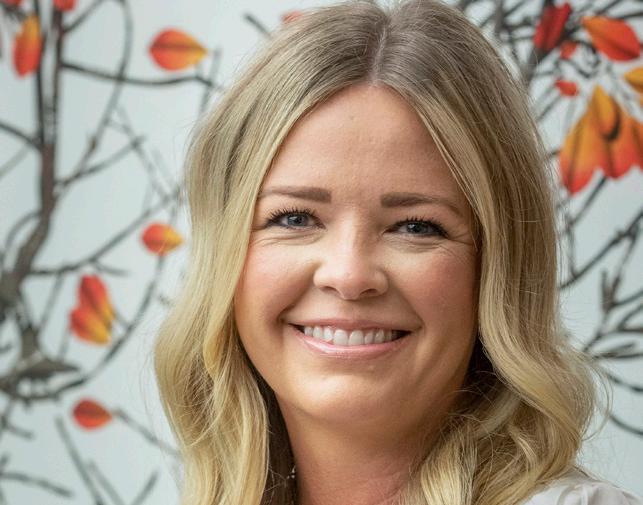
TO ADVERTISE call 501-244-9700
email hbaker@armoneyandpolitics.com
TO SUBSCRIBE | 501-244-9700
ADVISORY COMMITTEE
Susan Alturi, Scott Hamilton, Tommy Keet, Bobby Martin, Shannon Newton
CONTRIBUTORS
Michael Drager, Angela Forsyth, Becky Gillette, Drew Harris, Jamie Lee, K.D. Reep, Stephanie Williams
Long thought of as a man’s game, the poultry industry is becoming more co-ed. Women are seen more often on the plant floor, outside the chicken house and inside the executive suite.
Dean Hollis brings a unique business model to Little Rock. His growing Diventures operation aims to get more people comfortable in the water.
one year (12 issues). Single issues are available upon request for $5. For subscriptions, inquiries or address changes, call 501-244- 9700. The contents of AMP are copyrighted, and material contained herein may not be copied or reproduced in any manner without the written permission of the publisher. Articles in AMP should not be considered specific advice, as individual circumstances vary. Products and services advertised in the magazine are not necessarily endorsed by AMP. Please recycle this magazine.


John R. Tyson represents the fourth generation of the family that bears his name to serve in a leadership role at Tyson Foods, one of the world’s largest protein producers. Michael Drager photographed the Tyson CFO for AMP at company headquarters in Springdale.

Page 44
DYNAMIC DUO: DANA AND JOE KLEINE
“Super kind and humble people!”
Jake Reeves
CAPITAL HOTEL MAKES 2023 TOP 25 HISTORIC HOTELS OF AMERICA LIST
“One of my favorite hotels in America!”
Tommy SwanhausGLENN GRIMES: A DAY IN THE LIFE OF THE MAN WHO DOES IT ALL
“Great write up on a great man and family!”
Slay IsheeLYON COLLEGE SCHOOL OF VETERINARY MEDICINE APPOINTS NEW FOUNDING DEAN
“This wonderful. I was just discussing vet schools in the state while waiting with my dog for his check up! I didn’t realize Lyon College has a program!”
Ginger Chapman Turner
DYNAMIC DUO: ROBERT EASON AND KEVIN KEEN
“Absolutely the best team!”
Kim Brown

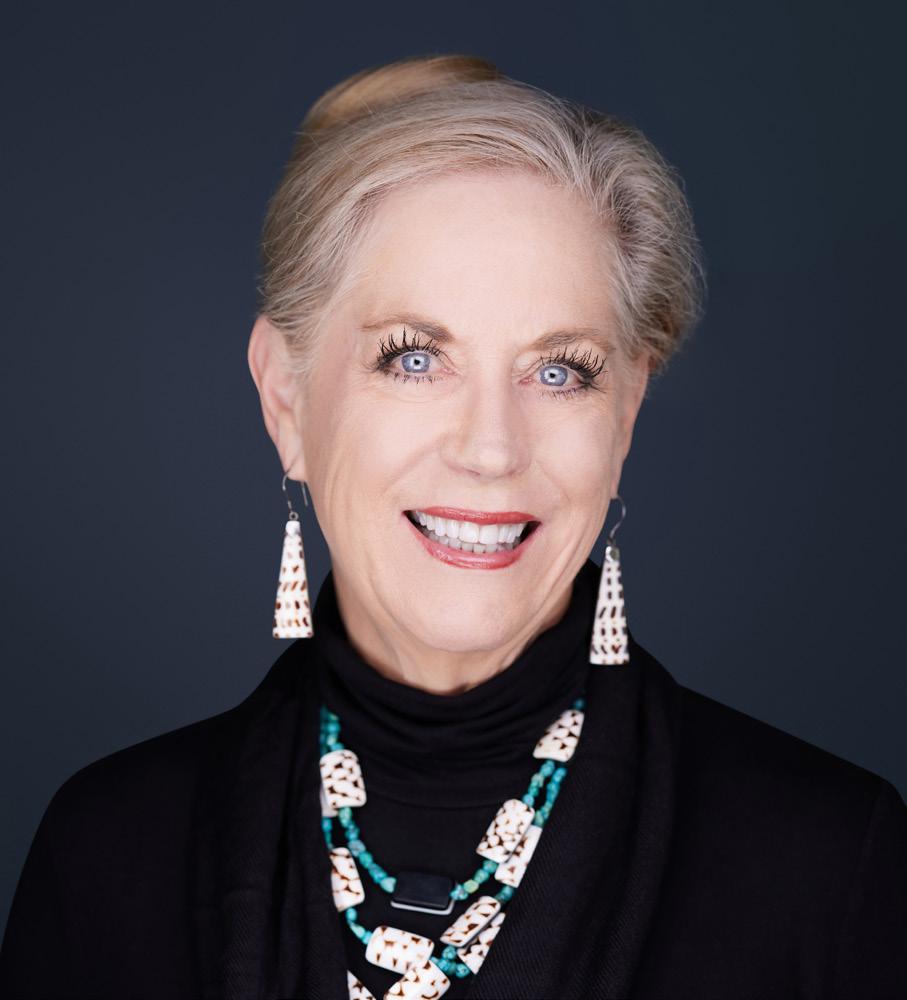
DYNAMIC DUO: ERICA AND COREY DUNN
“Fantastic fundraisers
Christy Low
Most Endangered Places in Arkansas as of 2023 7 Garver Opens Office in Downtown Little Rock
It dawned on me the other day, as early summer flirted with heat — real heat — that we’ve got it pretty good ahead of the humidified oppression that awaits in a month. And as thoughts tend to do, mine wandered to the heat-oppressed dystopian world of Harry Harrison’s 1966 novel, “Make Room! Make Room!”
I haven’t read the book, but the 1973 movie it inspired? Oh yeah. It’s a favorite. For me, “Soylent Green” represents post-Apes Charlton Heston at his best, not to mention providing one of the greatest lines in the history of film: “Soylent Green is …. !”
Well, let’s not spoil it. I’ll just advise extreme caution when the next green “protein” bar hits the market.
Harrison’s book and the subsequent movie depict a dystopian future — set in 2022 — in which the world is depleted of resources by greenhouse gases. (You know you’re old when you’ve outdated dystopian lit.)
The resulting year-round humidity is made more oppressive by massive over-
population, composed of “haves” and the proletariat. The former affords the luxury of what natural food remains, and the latter lives in squalor, relying on processed wafers from the Soylent Corporation as its primary food source.
You get the picture. And in the picture, Heston’s protagonist, an NYPD detective (if only New York cops could get more screen time), spends most of the film’s 97-minute run time brushing shoulders in overcrowded streets, wiping sweat from the back of his neck and slowly solving a murder mystery that leads to that famous closing line.
Aside from the landscapes of dripping sweat — and cautionary tales of responsible stewardship, environmental and otherwise — “Soylent Green” raises an interesting question. Is it far-fetched to imagine the rise of a single corporation that evolves to own the global market? Think Buy n Large from Pixar’s “WALL-E.”

Or perhaps a corporate Four Horsemen will emerge to frame our own dystopian future. One representing pharma, maybe another technology, others the distribution of staples like food and throw pillows, and finally, entertainment to placate the restless sheep … Pfizer, Apple, Walmazon and Disney, perhaps?
Of course, as convenient as it sounds, the sacrifices required to realize such a scenario are much too expensive. Here’s to the messages of “Make Room! Make Room!” and “Soylent Green” remaining distinctly dystopian. And temperatures in the summer of 2023 staying south of 90.
By Heather BakerReal estate represents one of my favorite industry focuses. Real estate is everywhere and plays a part in all business, remote working be darned.

The pandemic may have exacerbated a trend toward employees working remotely, and I believe remote working will remain an important part of the work experience. After all, in today’s digital world, all you need is a smartphone or a laptop, and you can work almost anywhere.
But I’ll always prefer the in-person experience of interacting with co-workers or clients in an office setting. Email and texts are great, but they can’t replicate the face-to-face experience.
Office space may be changing, downsizing, but we’ll always need it.
Watching how businesses adapt to
the marketplace’s changing criteria has been fascinating. Employees are looking for, and expecting, different things from employers than they did when I started my professional career, just a few years ago.
The drive to the office each day reveals just how commercial real estate is adapting, and inside this issue, CRE professionals provide their perspectives. Brick-and-mortar retail may be bouncing back from the pandemic’s shutdown, but e-commerce isn’t going anywhere, either.
Also inside this June issue, we’ll look at the poultry industry in Arkansas. We even visit with John R. Tyson about what the future holds for the meat-producer giant that bears his family name.
As always, thanks for reading. Hit me up with any questions or story ideas at HBaker@ARMoneyandPolitics.com.
Northwest Arkansas’ retail sector is in a strong position, and the future looks so bright you might want to wear your shades.
Commercial projects are at an all-time high and better than most comparable markets in the nation. Several significant developments have caught the eyes of regional and national retail brands. From north to south, and not in any particular ranking, here is why Colliers | Arkansas’ retail experts believe that the next five to 10 years will enhance the consumers experience, boost the economy and make Northwest Arkansas an outlier in the future of retail.
Just a few additions to the city of Bentonville include the Alice Walton School of Medicine, a 100,000-square-foot addition to Crystal Bridges Museum of American Art and a 350-acre, public friendly, on the new Walmart Home Office campus.
Years in the making, this exciting, world-renowned project will be an attraction for all kinds. The campus will house roughly 14,000 employees and will include a hotel, retail shops, biking trails and, of course, offices (with windows — locals will understand).
The excitement around the new campus has sparked significant growth with the arts corridor crowd and major retail corridors within the city. The revitalization of North and South Walton Boulevard is a prime example. In fact, Colliers redeveloped what was formerly an empty 8-acre empty car dealership and developed a retail strip center and Splash Car Wash, and also sold lots in a matter of months to Culver’s and Sterling Bank.
“Our retail team is excited to continue this new trend of pumping life back into old properties, whether they are redevelopments or renovations,” said Alan Cole, principal and executive vice president of Colliers | Arkansas.

Bentonville isn’t the only submarket on Colliers’ radar. When I think of Rogers, I think of cell division. It started as one and then subdivided in smaller micro markets, which is what needed to happen. I appreciate the old and the new, and love that the city will not forget its roots, which we see in the revitalization of Historic Downtown Rogers presently.
There is fun in every corner, and that includes the entertainment and shopping district of Pinnacle Hills and Uptown, which has been deemed the “downtown of Northwest Arkansas.” Colliers has landlord representation in the future Pinnacle Springs project, anchored by Whole Foods, and has signed leases with Tupelo Honey and Firebirds, both new to the state. The site for this project will replace a 15-year-old office building; if this isn’t a prime example of investing in the future retail success, what is?!
Costco, major competition for Sam’s Club, saw so much potential that it snagged a few acres in Pleasant Grove. Now, that’s a disruption outside the norm.
“Retailers are strategic in site selection,” said Steve Lane, managing director of Colliers | Arkansas. “Once we are able to explain the rapid population growth of around 1,000 people per month and lack of supply for those consumers, the decision to enter the market becomes easier.” Trying to paint a picture of Northwest Arkansas and its future in the next five years is difficult if you are not up for a visit. Otherwise, you’ll need to set your Google alerts to read the numerous positive articles with accolades and rankings published on the daily.
Have you ever heard of the Care Corridor? Springdale has a master plan, and it includes more than a mile of multimillion-dollar medical facilities adjacent to the 500-plus acres of George family-owned land.
Retail has taken off west of Interstate 49 with The Crossings development, anchored by a future Toasted Yolk Café concept. The future 180,000-square-foot UAMS Sports and Orthopedics Medicine facility will be a grandiose addition to Gene George Boulevard along with the newly announced Arkansas Children’s expansion. All this is to say that more retail in the surrounding areas is in high demand to support the medical workforce and residents in the upcoming years.
Fayetteville is in a league of its own, and no, we aren’t talking about the Razorbacks. (Or are we?) The uptick in demand for student housing is unreal. The University of Arkansas is at max capacity in its student housing availability and most likely will look to expand vertically or redevelop within the campus corridor.
In addition, downtown’s Cultural Arts Corridor is gaining Civic Plaza, a 134-room Ramble Hotel and new parking deck with ground-floor commercial space. An abundance of new multifamily and office developments is in the pipeline all over Benton and Washington counties with a huge demand for retail to support them.
There’s no denying that we should all be skeptical of what the future may hold for the state of the economy, but if Colliers was to say, “Place your bets,” we would put it all on Northwest Arkansas.
Arkansas’ scientific contribution to cost-effective biofuels is rooted in a plant not commonly associated with energy: tobacco. A landmark $206 billion settlement from the nation’s leading tobacco companies triggered the Tobacco Settlement Proceeds Act, dispersing funds to states that included Arkansas.
A portion of those funds led to the creation of the Arkansas Biosciences Institute (ABI), a collaboration of scientists from Arkansas Children’s Research Institute, Arkansas State University, the University of Arkansas and the University of Arkansas for Medical Sciences.
Located on the Arkansas State campus in Jonesboro, ABI is a spearhead of impactful science in Arkansas. ABI collaborative research has led to many successful collaborations, projects, discover-

to the DOE, which has helped fund Xu’s research into plant cell wall biomass, specifically in a common and plentiful plant known as switchgrass, a lignocellulosic biomass.
“Switchgrass bears all the traits of an ideal source of biofuel,” Xu explained. “It’s abundant. It’s renewable. It grows well in poor soils. It requires very little fertilizer. Basically, I’m saying switchgrass is cheap.”
However, what’s not “cheap” is the biomass-to-biofuel conversion processes, which includes pretreatment, saccharification and fermentation. The cost is the largest barrier to the commercialization of lignocellulosic biofuels.
To address this challenge, Xu and his team at ABI are employing genetic engineering techniques to remodel the structure of the plant cell wall. The aim is to significantly reduce the cost associated with the biomass-to-biofuel conversion process by facilitating the breakdown of the recalcitrant cell wall structure (pretreatment) and aiding the saccharification process, thereby enhancing the economic viability and competitiveness of biofuel production.
As an added benefit, the technology goes beyond switchgrass and offers the capability to engineer the cell wall of any plant species.
The United States currently is the world’s largest producer of biofuels, generating $21.6 billion in economic output. While Arkansas is currently without an ethanol production plant, the state biodiesel production capacity totals 115 million gallons annually, the fifth highest of any state. Xu’s research is significant in that it can reduce the cost of producing biofuels, giving renewable energy another edge over fossil fuels. It’s not difficult to imagine innovation from ABI sparking biofuel production companies in The Natural State.
ies and more than $800 million in new research funding. A portion of that funding is from the U.S. Department of Energy (DOE), supporting breakthrough biofuel research from ARA Academy member, Dr. Jianfeng Xu.

“ABI is incredible,” said Xu, who joined the College of Agriculture at A-State in 2008. “All the equipment and resources I need are here. And it’s a great facility for my students, particularly undergraduate students. They are offered the remarkable opportunity to conduct real, world-class research here.”
Xu’s research centers on genetic engineering of plants for both biomedical and biofuel purposes. The latter is of great importance
“Launching a startup biotech company in Arkansas is one of my goals,” Xu said. “Arkansas State and ABI are creating collaboration that is building a biofuels research community from the ground up. That’s makes us fertile ground for commercialization.”
Discovery Economics is a monthly feature highlighting the work of the ARA Academy of Scholars and Fellows, a community of strategic research leaders who strive to maximize the value of discovery and progress in the state. ARA recruits, retains and focuses strategic research leaders to enhance the state’s competitiveness in the knowledge economy and the production of job-creating discoveries and innovation. Learn more at ARalliance.org.








124 West Capitol Ave
124 West Capitol Ave
Little Rock, AR
Little Rock, AR
unionplazabuilding.com
unionplazabuilding.com
Available suites range from 200 - 12,534 SF
• Available suites range from 200 - 12,534 SF
Move-in ready office space
• Move-in ready office space
High-rise views of downtown Little Rock and the Arkansas River
• High-rise views of downtown Little Rock and the Arkansas River
Tenant improvement allowance available the heart of the financial and legal distrcit, Union Plaza Building sets the standard for Little Rock’s business community

• Tenant improvement allowance available
• In the heart of the financial and legal distrcit, Union Plaza Building sets the standard for Little Rock’s business community
For Leasing Information Contact:
For Leasing Information Contact:
Chris Moses | cmoses@mosestucker.com
Chris Moses | cmoses@mosestucker.com
Chris Monroe | cmonroe@mosestucker.com
Chris Monroe | cmonroe@mosestucker.com
Greyson Skokos | gskokos@mosestuker.com
Greyson Skokos | gskokos@mosestuker.com
George Friedmann | gfriedmann@mosestucker.com
George Friedmann | gfriedmann@mosestucker.com
200 River Market Ave, Suite 300 Little Rock, AR 72201
200 River Market Ave, Suite 300 Little Rock, AR 72201
501.376.6555 | mosestucker.com
501.376.6555 | mosestucker.com
By Dwain Hebda
The city’s core is Gabe Holmstrom’s workplace, his playground and his passion. A few minutes of conversation yields observations that speak to his trained eye: the proliferation of murals and outdoor art here being one positive, the mish-mash inconsistency of street signs posing a maddening distraction.
Mostly though, it’s people the head of the Downtown Little Rock Partnership notices, especially the ratio of people who only come to work or play, versus the ones for whom downtown provides office, residence and recreation in one. The latter group is far outnumbered by citizens who take their downtown experiences more piecemeal — holding a meeting, having dinner or attending a show, then heading home to other neighborhoods — and it is by this barometer that he gauges the overall health of the urban district, like a patient slowly on the mend.
“It’s density; it all starts from there,” he said. “By continuing to add more people to the urban core, a lot of other things follow. The people who are in the grocery store business, they’re going to follow rooftops, the people that are living down there. In five years, this is all going to look different just because of the stuff that is in the pipeline and the way the growth is already occurring.
“You have the veterinary and the dental schools that are going to bring over 1,000 new people downtown. You drive around East Village, you see a lot of new home construction. Same in the Pettaway neighborhood; you see a lot of people building there on empty lots or renovating old homes. It shows the desire. People want to be in a walkable area in a close proximity, and this is what they’re doing.”
The kind of vitality Holmstrom envisions for downtown doesn’t happen quickly nor does it turn on one event, but
the revitalization of two of downtown’s most iconic office towers is a giant step in the right direction. As announced last summer, Regions Center and Bank of America Plaza gained new owners, one local and one not, both of whom have pledged to return the buildings to their glory days. It was news that downtown advocates such as Holmstrom longed to hear, given the promise such projects hold for the neighborhood at large.

“I think this is exciting. Both of those buildings had seen challenges that have been written about in recent years,” he said. “It is going to take those buildings being reimagined and additional capital infused into both of them for the necessary upgrades, but the potential is just amazing to think about. You can easily see a Little Rock five years from now where the two empty towers on Main Street are reworked and have people

“You can easily see a Little Rock five years from now where the two empty towers on Main Street are reworked and have people utilizing and living in them”.
utilizing and living in them. Having willing, engaged owners is a positive, and I’m nothing but optimistic and excited to see what the future brings for both of those.”
Jay Chesshir, president and CEO of the Little Rock Regional Chamber, visits often with his counterparts across the country about what to do with excess office space.
“Lots of articles are being written on ideas, especially in the redevelopment area of housing, and all of those are obviously part of the answer,” he said. “I just think it’s really indicative of what people believe the future of our economy is to have both existing investment and new investment from outside of the market coming in here at the same time.”
Beyond the square footage each building provides — 550,000 of it in Regions Center, about 291,000 more in Bank of America Plaza — the revival of the buildings represents something even more valuable, a bullish attitude about the direction downtown is heading as measured in multiple millions spent to purchase, update and ultimately reimagine two of its sentinel skyscrapers.
“It’s very dear to me being local, where my kids go to school and everything I’ve done,” said longtime real estate developer Keith Richardson, who bought Bank of America Plaza for $8 million last summer. “I’ve watched Main Street through the years, as it grew with the restaurants and how vibrant it is now. We’re going to see one or two, three more restaurants in the area and more walking traffic further down Capitol towards Main.
“We’ve also got the new hotel right
across from our building as well, and we’re hopeful that will also start bringing people back to downtown and back out at nighttime. That’s the ultimate goal.”
Richardson came to prominence in the local real estate market by developing multifamily residential projects. The office tower, renamed 200 West, is not the first commercial project of his career, but it is by far the largest.

“The biggest difference for me is when I do multi-family, it’s ground-up new construction,” he said. “With this, we’re talking about a 50-year-old building, and there’s a learning curve that comes along with trying to figure out what’s been done before this when we start renovating the building. Some of the mechanical systems are different on a 25-story building versus a three-story or four-story apartment building.
“So that’s been the biggest challenge for me — going from a rehab building and trying to make it new again. With any kind of renovation, when you tear into the walls, you’re always going to find some surprises.”
So far, Richardson said, renovation work on the elevators and replacement of chillers and blowers has been completed, as has most of the rehab work on the 375-space parking garage and waterproofing the structure’s 500 windows.
“The next big improvement we’ve got is on the fourth floor; we’ve got a 26,000-square-foot exterior courtyard that is our next big capital improvement,” he said. “The ninth floor, we’re doing a fitness center, and then we’re
going to relight the whole exterior of the building with LED lighting. If it’s gameday, we’ll do Razorback red; if it’s St. Patty’s Day, we’re going to have green on the building.”
In the midst of all this, Richardson said there has been brisk interest in the building from prospective tenants wanting to get a look at the space, located at 200 W. Capitol Ave.
“It’s amazing; without us doing any kind of marketing, the phone has been ringing,” he said. “We’ve shown the building to several groups. We’ve got a big group coming in Friday that’s wanting multiple floors. It’s going great.”
The current optimism surrounding the property is something unfamiliar here, given the exodus of office workers from the city’s core over the past couple of decades and a string of failed developers whose lofty promises of renewal ended in foreclosure. In the case of 200 West, the property had been in the hands of a California-based investors group since 2006.
In late 2021, First Security Bank of Searcy sued the owners for defaulting on an $8.4 million loan and $150,000 line of credit, recovering the property at a foreclosure sale in April 2022 for a credit bid of $7 million. As reported by AMP, Richardson then acquired the 24-story tower, the third tallest building in Little Rock, in a deal announced in June.
No one enters a project this big on pure nostalgia, especially a market-savvy veteran developer like Richardson. But he acknowledged a native Arkansan’s jolt
of pride over being the one to bring the building back to its former prestige.
“I looked at some office buildings downtown, some of the taller ones, through the years, and it seemed like the right time, right place for me. That’s in essence how we ended up with the Bank of America building,” he said. “A broker showed us the building about three or four years ago, and one of the things that really attracted me to it is just the bones of it. It’s a solid building. When First Security Bank got it back, they asked me if I’d be interested in purchasing it. Timing happened to be right, and within 30 days we made a deal.”
In the case of Regions Center, the refrain follows a similar tune. In 2006, the bank sold the property — which when opened was the tallest in the state — to NNN 400 Capital, through a group of more than two dozen limited liability companies. A decade later, Wells Fargo Bank filed a foreclosure lawsuit claiming owners had defaulted on its loan, owing about $30 million.
In response, the owners filed for Chapter 11 bankruptcy in 2016 and in 2017 in U.S. bankruptcy Court in Delaware, with the apparent intent of reorganizing debt and paying off the note.
Wells Fargo countered in court, convincing the judge to convert the bankruptcy filing to Chapter 7, allowing the building to be sold.
In June 2022, just a couple of weeks ahead of Richardson, New York hedge fund Taconic Capital Advisors announced it had purchased the 30-story building at the corner of West Capitol and Broadway for an undisclosed sum. In a press release, the new owners proclaimed the deal “a vote of confidence in the future of the [downtown] sub-market and the building itself.”

Matt Legge, principal with New Yorkbased Polaris Properties Group, which is
an ownership partner, is directly involved in the building’s redevelopment. He said the opportunity presented by Regions Center, the owners’ first Arkansas real estate holding, provided intriguing possibilities including the introduction of unique building amenities.
“It’s no longer as impactful just to have really great space. We’re planning on doing a number of things that will make for a differentiated experience, so people actually are happy to come to work,” he said. “Both in this market and other markets, a good baseline is nice space, but having nice space alone isn’t enough to be differentiating. We really believe in

complementing those space services, and when I say services, I mean hospitality services, in this case.
“We’re able to do that via a publicfacing hospitality feature, like the dining program that we’re intending to implement here. It enables us to have an on-site hospitality staff, and that on-site hospitality staff can be extended across the entire building to serve the building tenants. As an example, if you’re a tenant in this building when the dining program is implemented, there will be the opportunity to order vertical catering to your premises, pantry-stocking services, catering for meetings and depositions and conferences that you’re hosting on-site.”
Legge said the extensive design work for the project is nearing completion with construction slated for the second half of the year. Everything from building systems and elevators to the parking garage to the various internal spaces are targeted for sweeping improvements. While he declined to disclose specifics on what’s being spent on the project, Legge said “Suffice to say, it’s a really ambitious and robust amount of capital.
“We’re really pouring equal attention and capital into the back-of-house platform as we are to the front-of-house platform to make for not only a really appealing amenitized environment, but one that’s enhanced for the long term from a capital investment perspective.”
Legge echoed an optimistic view held by others as to the direction of downtown and the prospects for its future as a key element in entering the market in the first place.
“I think [Little Rock’s downtown] is not all that different from what’s happening in a lot of downtowns,” he said. “There’s been a challenge in bringing workers back downtown due to COVID, but also due to the ongoing work-from-home dynamic and offering. We’re very cognizant that part of our job as the landlord and owner is to create a compelling environ-
ment people to want to work in. So that even if you have the choice to work from home, we’re offering an experience that exceeds the experience they’re going to have at their home office, and that it’s a place that’s exciting, convenient and appealing to be.
“We’re hoping that we can help companies who want to be more competitive in attracting talent, retaining talent and encouraging the talent that they have to work from the office. We’re planning on doing a number of things that will make for a differentiated experience, so people actually are happy to come to work.”
Legge’s comments strike at the heart of recent trends in commercial real estate
lack of amenities in the neighborhood, such as nearby restaurants.
In Little Rock’s case specifically, downtown space has also been affected by large tracts coming online outside the city’s core. One of the most noteworthy was the repurposed former Alltel headquarters, which lured several large state government tenants out of office buildings to the nearby Riverdale neighborhood campus.
Another trend taking hold is companies’ willingness to build their own headquarters abutting residential areas and shortening commutes. Bank OZK, the state’s largest institution, would in previous eras likely have been a prominent tenant in downtown’s financial district. Instead, the bank is still breaking in its sprawling 248,000-squarefoot headquarters, the first phase on its 44-acre compound far to the west on Cantrell Road. Arkansas Federal Credit Union and AT&T also occupy multistory office space in the vicinity.
that have steadily drained office buildings of their tenants from coast to coast. Starting with COVID closures and workfrom home restrictions, companies have reexamined their space needs given the success many have experienced in remote work arrangements. And while occupancy rates are rising in many areas, as commercial real estate adviser CBRE reports, the overall office vacancy rate nationwide reached 17.3 percent in the last quarter of 2022, a 30-year high watermark.
The firm also identified the common attributes of so-called “hardest-hit buildings,” which have added the most vacant space since the pandemic. Though representing a mere 10 percent of total office buildings, HHBs accounted for 80 percent of total occupancy loss by square footage between Q1 2020 and Q4 2022. Among these shared characteristics, HHBs tend to be larger, between 100,00 and 300,000 square feet, and suffer from
But talk to any of the growing list of downtown boosters — from property management firms to the chamber of commerce — and they’ll say the goings on in the city’s core neighborhood have it poised for a major comeback. Projects like the office towers, located just two blocks apart, are a big endorsement of this view, they say, as well as potential catalysts for an entirely new concept in how downtown looks, moves and functions.
“With what’s happening in Little Rock, you look at the I-30 corridor project opening up 17-plus acres of green space that can be programmed from a park perspective, providing ingress and egress both from a vehicle perspective but more importantly from a walkable perspective between east Little Rock and downtown,” Chesshir said. “Then, with the potential of the deck park between Sixth and Ninth Streets that we’re now in the planning process of, you add that to MacArthur Park and the Arkansas Museum of Fine Arts reopening in amazing
It’s not just going to be a weekend entertainment scenario. It’s not just going to be a special event scenario or an 8-to-5 office scenario. It’s going to be all those things and more.
transformation.
“Now, all of a sudden, people think, ‘Wow, not only do I have the opportunity to work there, but now I can live there, now I can play there, now I can have a family there.’ What that will attract, in my opinion, is a whole host of things, services that truly will create a 24-hour economy. It’s not just going to be a weekend entertainment scenario. It’s not just going to be a special event scenario or an 8-to-5 office scenario. It’s going to be all those things and more. This renaissance of downtown Little Rock is happening right before our very eyes.”
Holmstrom is quick to point out that in addition to improvements being taken by the city and individual developers today, lawmakers across the board need to think more proactively about the kinds of incentives that would make additional development more attractive, thereby luring additional investment.
“While there have been some improvements that the legislature has made in recent years to the incentives avail-
able for historic structures, Little Rock and Arkansas as a whole still have a lot of possibilities there, and challenges,” he said. “One of the things that many other cities and states have at their disposal is the ability to abate property taxes and use that as an incentive. Arkansas is currently prohibited from doing that by our state constitution.
“Tax increment financing structures, while available in Arkansas, are not nearly as effective as they are in some of our neighboring states and in large part due to a Supreme Court decision of 2004. At some point in the future, that could possibly be looked at again.”

Holstrom also noted incentive ideas at the federal level, if formalized, could have a direct and lasting impact on the redevelopment of office space in Little Rock’s urban center.
“One of the conversations that is occurring at a national level in cities as well as on the federal level is an incentive program that would provide a tax credit for these large commercial office
buildings to convert them to residential,” he said. “In the last Congress, there was a bill introduced that did not pass but the conversation is ongoing.
“The people at the International Downtown Association are working and lobbying on this because this is not just impacting towns in Arkansas, downtowns across the United States are still feeling the effects of people working from home and the lack of use of some of this previously used office space. Policymakers are continuing to talk about what is the best way to address this and incentivize the building owners to look at additional uses for the property.
“It would be fascinating if that is able to happen on a national level or at the federal level. Then if states mirror that legislation and offer an additional state tax incentive at the local level, it could really offset some of those costs. The challenge is creating the solution from a policy standpoint that will address the needs of the property owner and the developer as well as the potential residents.”
Meanwhile, the work continues as two of Little Rock’s most significant buildings find their way to a new chapter. Linked by their common past struggles and a shared orbit with the Stephens Inc. building as moons of the Simmons skyscraper, the city and state’s tallest, the two properties represent a bold new plot twist in the story of a resilient neighborhood.
“It just needs some TLC and some capital improvements to bring it back to life,” said Richardson, talking about his building — but he could just as easily be talking about downtown as a whole. “It’s not going to happen overnight, but it’s certainly my intention to renovate things and bring it back to what it can be.”
aren’t permanent, but change is. So goes the powerful opener to Rush’s underappreciated 1981 album, “Moving Pictures.” Adaptation was a theme for lyricists Neil Peart and Pye Dubois in that percussion-fueled anthem titled, “Tom Sawyer.”
Of course, those words ring true still, and adapting to change — real change — has become job one in the commercial real estate game.
AMP visited with a few of Central Arkansas’ top CRE brokers about current trends in the Little Rock market and what change might look like in the decade ahead.
AMP: Is retail truly back, and if so, will it last?
Jessica Flake Dearnley, CEO and co-founder, Flake & Company:

Changing demographics and online shopping are still hurting traditional retail. This can be seen with the recent bankruptcies and store closings of Tuesday Morning; David’s Bridal; Bed, Bath and Beyond; Christmas Tree Shops AND Party City!
Some retailers have adapted by adding services to get people into their stores. The mixed-use tenants can cut very favorable deals to absorb big-box space, so yes, the trend will last until there is no economical method for them to lease or purchase space (the empty big boxes run out, and there is no new construction).
Chris Moses, principal, president and CEO of Moses Tucker Partners:


I think so. I think brick-and-mortar developments will need to have a true senseof-place feel that’s walkable and with a heavy emphasis of mixed-use with great connectivity to major linkages.
Kris Upton, president and CEO of RPM Group:
Certainly, redevelopment of retail, entertainment, and notably, office in areas that better serve suburban households have good momentum. Commonalities among these examples are that they are located with easy access to I-430 or I-630 and generally proximate to more dense and suburban footprints.
And I would quickly add that there is a dwindling and finite supply of undeveloped land at or near these interchanges, so demand will increasingly outpace supply.
AMP: What does a resuscitation of Park Plaza mean for the market, midtown Little Rock in particular?
Moses: I think Park Plaza needs to be totally rethought. The new owners need to be very considerate of Dillard’s, but need to really push for heavy density of housing, outdoor spaces and specialty retail/food/beverage.
Upton: Increased occupancy and activity in this space is good for the midtown ecosystem as a whole. In particular, businesses with good access along the North University corridor will benefit disproportionately.
Dearnley: As we own Pavilion in the Park, which was 100 percent occupied and hit by a tornado, we believe there is strong demand for locations in Midtown. We have the opportunity to re-create the space and create an environment that is relevant, full of energy, with luxury fashion, aesthetic services and medical. Plaza West is 100 percent occupied.
New ownership of Park Plaza is a step in the right direction, but the mall needs a lot more than a banner that says ‘Under new ownership.’ Does the new ownership have a vision and plan that they are going to implement to change the desirability of the mall? If not, I predict more of the same.
AMP: Office vacancy in Central Arkansas is down once again this quarter. Given the staying power of hybrid work schedules, do you expect this to last?
Upton: We have likely flattened out on average office vacancy rates, although the overriding trend of displacing office occupancy — and accompanying retail and entertainment consumer spending — from urban to suburban areas will continue to highlight strength in suburban offerings.
Dearnley: “Work from home” is a nationwide phenomenon, and that is all the next generation knows. Companies that require collaboration are returning to work. I believe that productivity plummets when working from home and am a strong return-to-the-office proponent.
However, there needs to be a change in the office environment. Even before the pandemic, we saw companies wanting
smaller personal work spaces, more open meeting areas and overall smaller footprints. When you do have an office, it needs to sparkle and invite energy. The Class B/C, commodity product, building-block-style office is not going to work anymore.
Little Rock may be able to absorb this space since there has not been new construction, but larger cities like San Francisco, Chicago and New York are seeing more space converted to multifamily.

Moses: I think office space will always be needed, but the type that will probably have the highest occupancy going forward will be buildings and spaces that offer a more open and collaborate spaces in areas that have some sort of vibrancy.
AMP: What factors are causing businesses to choose “second-generation” office space over new builds?
Moses: Overall, costs to occupancy (rent) is the biggest reason. Construction costs are starting to come down from all-time highs, but office buildings built during this time and ones that warrant higher rents will be challenged unless they have some type of spaces that appeal to tech-oriented companies, are walkable and have some type of connection to food/beverage/ entertainment uses. Also, mixed-use is the key here.
Dearnley: Interest rates, construction costs and the supply chain are precluding businesses from going this direction. We have met with architects and contractors about new projects/ redevelopment, and as soon as I quote rental quotes for even a sub-10 percent return to investors, the tenants go radio silent.
The risk needs to match the return, and tenants still don’t have the appetite (or budget) to pay the lease rates they are paying in Northwest Arkansas. They can still have the same business model and profit margins without renovations. The purpose of renovations or a new office space would be able to attract new talent, and that is still a problem everywhere since The Great Resignation.
AMP: The Central Arkansas industrial market is as strong as it’s been in a while, with vacancy rates at historic lows. What’s led to this increased demand?
Dearnley: We had low inventory to begin with and a need for more fulfillment centers. However, nationwide, industrial is underperforming and overbuilt, as everyone was racing to build it. The continued dominance of Amazon and other online retail is pushing demand, along with big-box stores such as Walmart, Lowe’s and Home Depot offering free home delivery.
Moses: Covid, low cost of land and Arkansas’ great linkages
AMP: Will the Port of Little Rock continue its momentum with more new tenants throughout 2023?
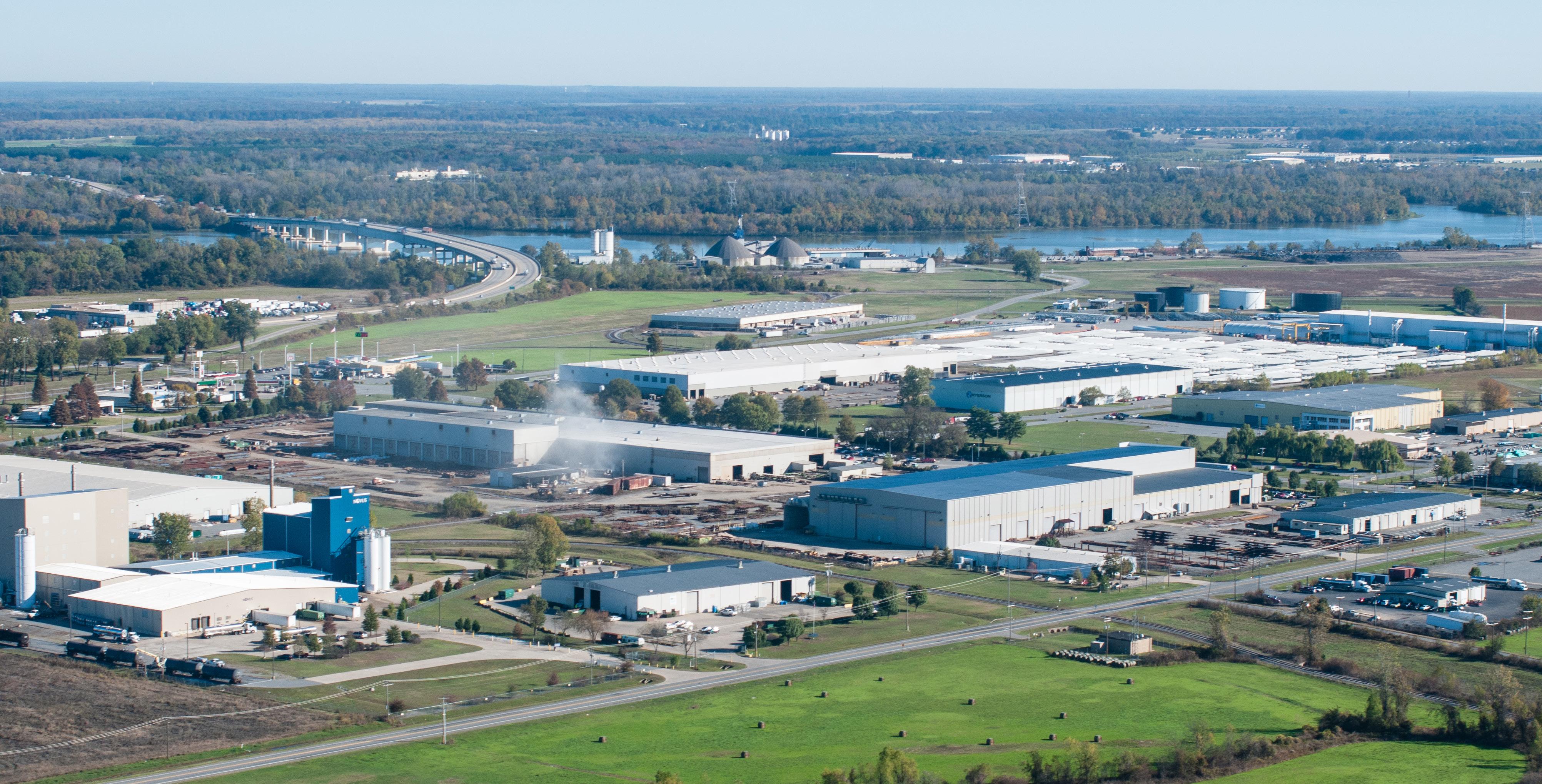
Moses: I think so.
Dearnley: The Port of Little Rock has been a great success story for Central Arkansas. Having a dedicated area for large industrial users that has access to river barge and rail traffic has proven to be a success in drawing investment dollars to the region. Mayor [Frank] Scott has been a visionary to make this a priority.
AMP: Where’s the next big growth spot in the Central Arkansas market?
Upton: While we have much more work to do, significant interstate and infrastructure improvements on I-40 north to Conway, northeast on Highway 67 and I-30 south to Hot Springs present superb growth opportunities.
Dearnley: Financial institutions have made a considerable investment in the Chenal and Rahling Road areas. With all the bank headquarters and multi-family under construction, this will bring more density to that area. We purchased Village at Rahling in November 2022 as a mixed-use development with multiple restaurants and accessible office space.
Moses: East Village has a lot of momentum with the new Lyon College veterinary and dental schools. This is a massive win for all of Arkansas, but think it’s huge for downtown Little Rock and Central Arkansas.
AMP: What does the Central Arkansas commercial real estate market look like in five years? In 10 years?
Moses: Think the next couple of years might be a little difficult, but Central Arkansas’ low cost of living, abundance of land, decent population growth and low unemployment is a good thing.
Upton: Artificial Intelligence will reshape business models and create a premium for skills beyond those that can be replicated.
Over the next few years, I suspect the market will reflect more projects stalled as a function of monetary policy or properties that are forced to change hands in light of tighter underwriting criteria. Of course, potential rotation in these assets presents opportunities on the buy side, and we are positioning accordingly.
Additionally, migration from concentrated urban centers to more disperse suburban areas will define the post-pandemic decade for office and accompanying day-time consumer spending. Dearnley: Due to construction costs and the supply chain, we have not seen much new product come to market. Once we get through this looming recession, the office vacancy levels off, properties that can’t be refinanced turn over and capitalization rates increase, we will begin to see more new development.
There has not been a major new development of office or retail space in years. The commercial real estate market in Central Arkansas continues to thrive and show why Little Rock is the capital city. Medical continues to be a driving force along with state government. Plus, regions such as Bryant and Benton continue to boom, as well as Conway.
We are not growing the way Northwest Arkansas is, but I believe that when you combine the new developments with the redevelopments throughout the region, you will see the Central Arkansas commercial market continue to grow over the next five to 10 years.




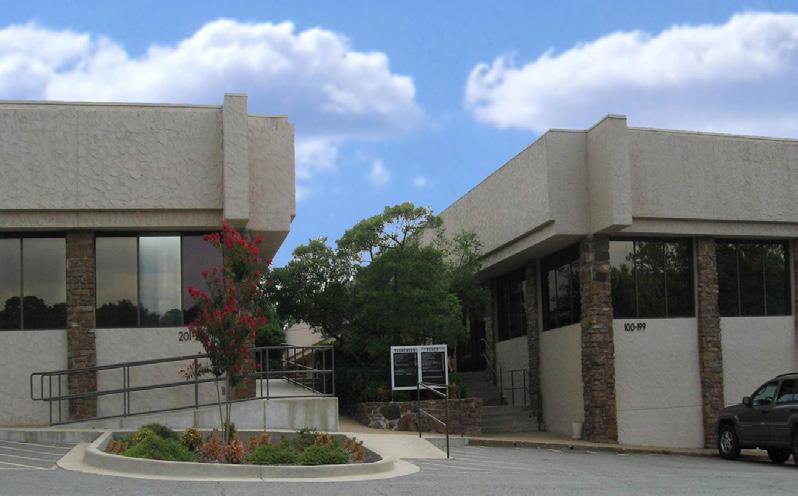
Park Plaza as it can be seen today, a mix of high-end retail and whatever it can get to fill space.

Park Plaza, Little Rock’s most iconic retail space and the state’s first mall-like shopping center, has a new lease on life following a decade or more of evolving retail trends that led consumers elsewhere and the mall ultimately to foreclosure.

The new owners plan to make sure Park Plaza, opened in 1960, is around for at least another six decades. Howard Levine and Camilo Varela, managing partners and co-founders of Florida-based Second Horizon Capital, saw opportunity when the mall was placed on the market two years ago. Deutsche Bank acquired Park Plaza at auction for a mere $100,000 after previous owner, CBL Properties of Chattanooga, defaulted on its loan and the mall went into foreclosure in 2021.
Though no official figure was released, Second Capital paid the bank between $25 million and $27 million for the 268,000-square-foot property, as reported by CRENews.com.
Founded in 2021, Second Capital specializes in “reinvigorating challenged commercial real-estate projects,” according to its website. Park Plaza represents the firm’s second addition to a fledgling portfolio. A year after its launch, Second Capital announced the acquisition of Stony Point Fashion Park, a 680,000-square-foot mall in Richmond, Va. And in Park Plaza, the firm found another former retail juggernaut that its leaders believe can shine again with a little TLC.
Much more than a new coat of paint appears to be headed the mall’s way. Levine told AMP in an email interview that Park Plaza offers opportunity for “tremendous revitalization and activation.”
In the month following Second Capital’s March purchase, the firm’s leadership team went store to store to meet with tenants and assure them of its commitment to Park Plaza.
“We saw a central retail core with a great location and longstanding market presence,” he said. “We also recognized a community with a desire for updated retail offerings and more entertainment options. Through additional investment, incremental resources and dedicated focus from new management, we are excited to work to transform Park Plaza into a destination that better serves the local community.”
Varela said it was important as “long-term operators” to connect with tenants from day one.


“We are active, engaged and invested in the future of Park Plaza, and hope that our attention and involvement demonstrate that commitment,” he said. “Our tenants, our shoppers and our community are the life and future of the center, and spending time listening to them helps us define how we can best
apply our energy, resources and time to build toward the long-term success of Park Plaza.”
Second Capital’s plans for the property include new entertainment options. Levine said he and Varela envision a retail-centric hub with an updated mix of entertainment, dining and traditional shopping options.
“At the moment, we are working to revitalize the center’s existing infrastructure to support this transformation,” he said. “We have already started our initial capital investments and operational improvements, as well as enhanced our on-site management team, and are now focusing our efforts on activating the property with new offerings.”
New offerings in Central Arkansas are trending towards entertainment — Top Golf, Main Event, the planned entertainment venue at the former Wild River Country property among them. Local commercial real estate developers agree that any rethinking of Park Plaza should include a heavy dose of it.
Compared to other markets, Little Rock has been underserved in family entertainment, said Jessica Flake Dearnley, CEO and principal broker at Flake & Company.
“New ownership of Park Plaza presents an opportunity for imaginative thinking; the mall needs a lot more than a banner that says ‘Under new ownership,’” she said. “The incoming owners should understand that they need creative partnerships to offer art walk-throughs and experiences like other innovative malls have created with the popular series ‘Stranger Things.’ Try unique activities and a variety of shopping experiences to attract customers to the center. The environment needs to be special, interactive and engaging.
“We keep seeing about pickleball
“We are active, engaged and invested in the future of Park Plaza, and hope that our attention and involvement demonstrate that commitment.”Carmila Varelo
courts coming to malls. The successful big-box retailers have pivoted towards offering services or recreation at their stores. Malls will need to do the same.”
Dearnely further noted that stores like Petco and PetSmart have veterinary services and grooming in-house, Staples has added TSA pre-check; and Ulta stores include a salon in addition to the makeup they sell.
“They are doing things to get people into the store that they can’t buy on Amazon,” she said.
As a former asset manager for regional enclosed malls, Dearnley appreciates how expensive malls can be to operate.
“They are beyond capital intensive. Malls are like operating a small city or town. Ultimately, if the rental rates can’t correlate to the cost to remodel, it doesn’t make economic sense for traditional investors and needs to be a public/private partnership.”
But taking on such “risky” projects and turning them around represents Second Capital’s calling card. The firm’s website describes the company as an “impact investment real-estate company that partners with communities to reimagine large-scale, underutilized commercial properties as vibrant destinations and local economic engines.”
Second Capital will have its work cut out for it. Though Dillard’s has remained committed to Park Plaza, mall traffic has deteriorated significantly over the past two decades. Many factors have contributed — the rise of e-commerce, the city’s westward expansion, a pandemic, even questions about patron safety. But Varela stressed that his team is less concerned with the mall’s past than it is about the future of Park Plaza.
The University Avenue corridor in Little Rock’s midtown remains relevant, and he thinks Park Plaza will adapt to meet the needs of the market.

“Businesses evolve and adapt, and retail centers are no different,” he said. “For Park Plaza, our focus is less about the specific design of our center and more about what solutions can fulfill the needs and desires of our Little Rock community. We are excited to be part of transforming Park Plaza into a dynamic space that offers renewed relevance to our tenants, our shoppers and our neighbors.”
The new owners are mum, for now, on specific plans, outside a renewed commitment to security.
When Second Capital bought Park Plaza in March, local news outlets reported that at least 10 of 62 storefronts inside the mall were vacant, higher than
the 5.7 percent national shopping-center vacancy rate reported by Cushman & Wakefield for the fourth quarter of 2022.
Hometown Dillard’s anchors each end of the mall and these days accounts for most of the mall’s foot traffic. The Dillard’s nameplate has adorned the Park Plaza façade since 1974 (though the Dillard’s-owned Blass department store was added to the center’s roster in 1965). In the ensuing decades, Dillard’s has become synonymous with Park Plaza, and its commitment to the mall unwavering.
Park Plaza opened in 1960 as a two-story, open-air concourse. The intersection of Markham and what was then Hayes Street (in what was then considered west Little Rock) represented the first mall-like structure in the state. Within the decade, others would follow suit across the metro — The Mall (later University Mall and later yet torn down and redeveloped as an openair center), Southwest City Mall (now the headquarters of the Arkansas State Police) and McCain Mall.
The original, open-air Park Plaza included a fountain and brook, a bowling alley and even a movie theater, the latter of which made the transition to enclosed mall before closing.
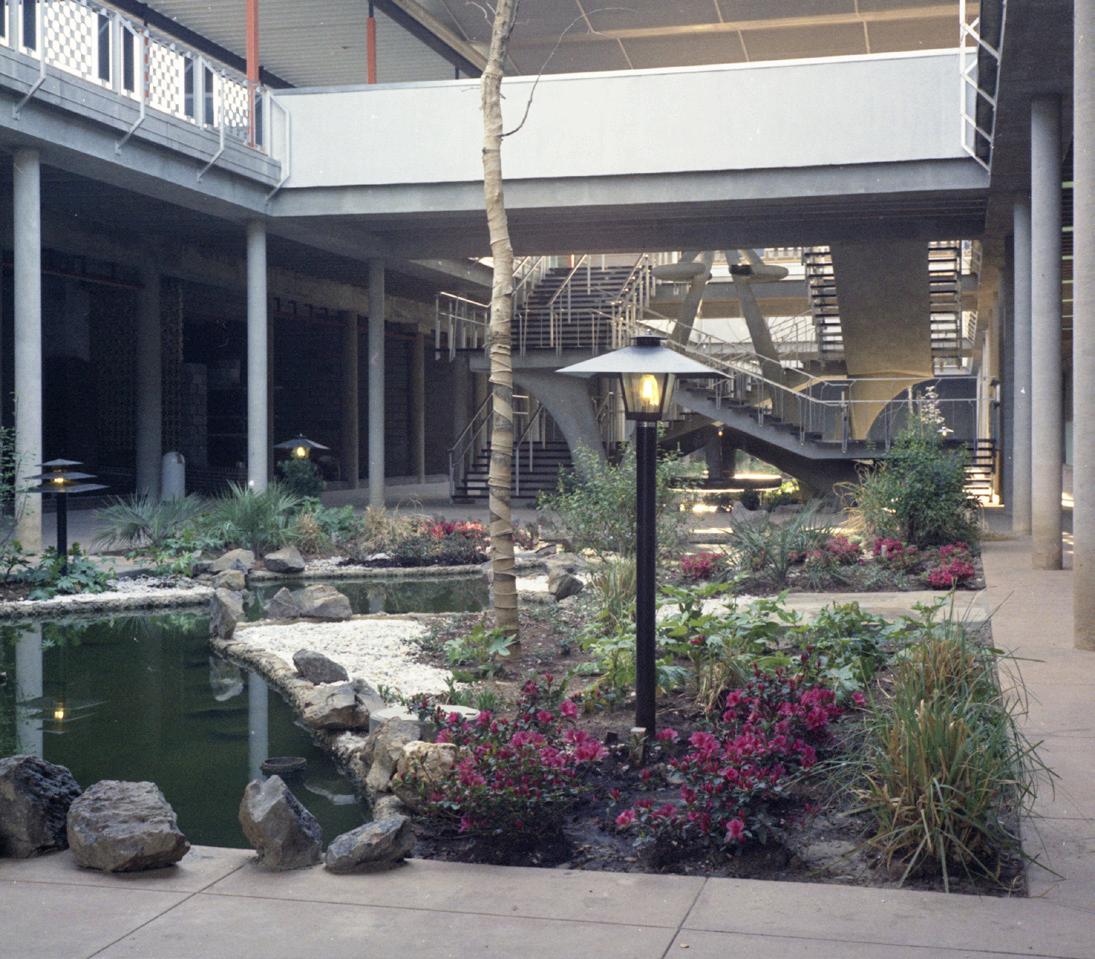
But by the 1980s, those enclosed malls had popped up across the U.S. landscape like mushrooms in a water-soaked yard and defined an era, and Park Plaza had been left behind. The original structure was demolished in 1987 and rebuilt — for what was in the late ‘80s a pricey $55 million — as the glass-enclosed building that still presides over one of Little Rock’s busiest intersections.
Ironically, open-air “lifestyle” centers represent the current retail rave. But that hasn’t dampened the optimism flowing from Levine and Varela. Prior to the launch of Second Capital in Boca Raton, the former served as a managing director in Bank of America’s global credit and special situations practice, where he did a lot of CRE investing, and as an investment banker for Sagent Advisors (now DC Advisory) and Citigroup Global Markets.
Varela was a managing director in investments at Equity International, where he led origination, deal execution and portfolio management across the U.S., Asia and Latin America markets.
Neither is new to the investment game, and both are excited about their latest. But, still … Little Rock? Varela explained, “As part of our acquisition strategy, we completed a comprehensive review of malls and lifestyle centers across the United States.
“Through that work, Little Rock — and Park Plaza specifically — emerged as an attractive investment opportunity. We were especially drawn to the city’s vibrant community, along with its steady economic environment and affordable cost of living.
“Within that, Park Plaza sits at Little Rock’s busiest commercial corridor — a hub of the Midtown neighborhood — and a clear spot for enhancing a central destination for our community and Central Arkansas as a whole.”
Of course, Dillard’s continued commitment to Park Plaza helped the mall remain a viable investment opportunity for real estate guys like Levine and Varela. But there were other nuggets, as well.
“Our attention to Park Plaza was driven by several market elements — a neighborhood retail core with healthy anchor operators, a meaningful daytime population supported by the neighboring medical campuses and a central location with reach to all of Little Rock and Central Arkansas,” Varela said. “We are excited to work with Dillard’s, along with all our tenants and neighbors, to enhance the vibrancy of our Midtown community.”
Levine said Second Capital has already begun initial capital investments and operational improvements, enhanced the on-site management team and now is focusing on “activating the property with new offerings.”
He added that his team is working with tenants and community leaders to determine the best way to serve local customers. And Levine is quick to remind them that change on such a scale as is planned will be slow. “These efforts will
take time, and we look forward to sharing updates as our work evolves.”
For Levine, the corporate TLC that had been lacking at Park Plaza will be realized through “additional investment, incremental resources and dedicated focus from new management.”
The Second Horizon team has been encouraged — and even “humbled” — by the positive response from local leaders and the community at-large about the new ownership.
“We are excited to continue to revitalize this space into a thriving economic engine and community hub that will serve the Little Rock community and

Central Arkansas for years to come,” Levine said. “Park Plaza offers a tremendous opportunity for revitalization and activation. We saw a central retail core with a great location and longstanding market presence. We also recognized a community with a desire for updated retail offerings and more entertainment options.”
Levine wouldn’t speculate on what future might have awaited Park Plaza had Second Horizon not stepped forward, but stressed that it had been sitting in a challenging financial situation for too long and needed “new energy, attention and significant investment.”
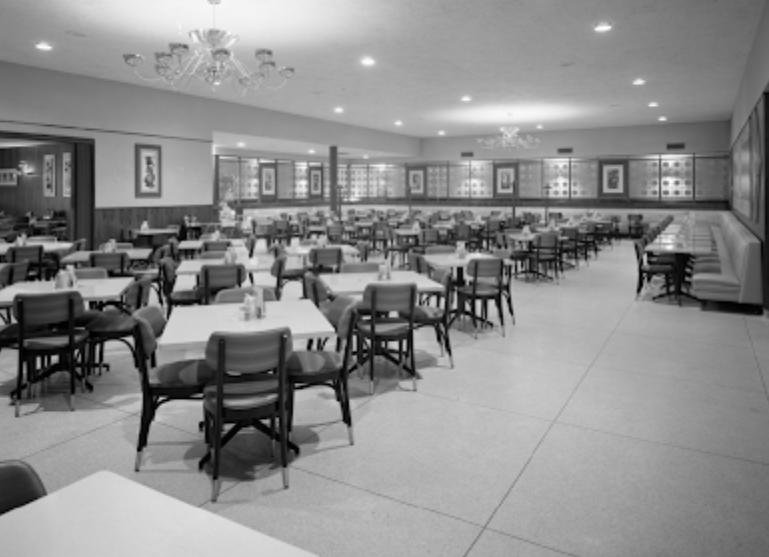
It’s early into Park Plaza’s Second Horizon stage, but the mall’s future hasn’t looked as promising in decades.
“Once the acquisition was complete, we began implementing operational and physical improvements, brought in world-class property management group, JLL, to oversee operations, and started engaging with our tenants and our community,” Levine said. “We look forward to introducing more enhancements in the weeks and months ahead and hope shoppers will come see and experience these changes.”





Owner(s)/Principal broker(s)
Number of Realtors, Brokers, Team Members
501 PROFESSIONALS REALTY
Janet Martin
7
ARKANSAS ELITE REALTY
Lacey Gramling, Susan Penn
24
ASPIRE REALTY GROUP
Jeff Scherrey, Austin Franks
5
BAILEY & CO.
Sarah Bailey
29
BASSETT MIX & ASSOCIATES
Mary Bassett, David Mix
40
BAXLEY-PENFIELD-MOUDY
Tom Baxley, Lance Penfield, Layne
Penfield
40
BETTER HOMES AND GARDENS
Real Estate Journey – Bentonville
Ben Fox 77
BRADFORD & UDOUJ
Rachel Cannava Brown 25
BURNETT REAL ESTATE TEAM
Cody Burnett
CENTURY 21
WRIGHT-PACE REAL ESTATE
Chrissie Wright 98
COLDWELL BANKER
Harris McHaney & Faucette
317
COLDWELL BANKER
RPM Group
Robin Miller
260
COLDWELL BANKER
Village Communities
Carroll Caldwell, Kevin Kercheval
78
COLLIER & ASSOCIATES
Stuart Collier
196
CRYE-LEIKE REALTORS
Bentonville
Annette Gore (branch manager) 22
CRYE-LEIKE REALTORS
Kanis Road
Mark Leggett (VP/regional manager), Johnny McKay
50
CRYE-LEIKE REALTORS
Siloam Springs
Misti Stephens
15
ENGEL & VOLKERS
Jena Selva, John Selva 20
ERA TEAM REAL ESTATE Steve Doty 123
FIRST CHOICE REALTY Jim Kellstrom
19
HEARTFELT HOMES
Amber Green
6
HOMEQUEST REALTY
Brian Curtis, Eric Eby 45
IREALTY ARKANSAS
Kristen Kennon, Austin Franks, Rachel Rushing, David Smith 164
JON UNDERHILL REAL ESTATE
Jon Underhill, Brandy Harp
22
LIMBIRD REAL ESTATE GROUP
Tara Limbird
38
LINDSEY & ASSOCIATES
Jim Lindsey, John David Lindsey
218
MAIN STREET REAL ESTATE GROUP
Dia Dixon, Jason Dixon
11
MCKIMMEY ASSOCIATES
Marilyn McKimmey, Barry Holmes
83
MICHELLE PHILLIPS & CO.
Michelle Phillips
41
NWA HOUSE HUNTERS
Jessica Yankey (team leader)
4
RE/MAX OF HOT SPRINGS VILLAGE
Clara Nicolosi
26
RE/MAX REAL ESTATE RESULTS
Kimberly Minor
41
RE501 REALTOR PARTNERS
Andrew Webre
8
SAPPHIRE REALTY
Liz Owen, David Cisneros
6
THE CHARLOTTE JOHN CO.
Charlotte John
41
THE DULEY GROUP
Cody Duley, Mike Duley
16
THE HOME TEAM
Valerie Meyer (team leader), Mike Self (team leader)
5
NWA REAL ESTATE HUB
Stephen Brooks (team leader)
5
PORCHLIGHT REALTY
Jim Knaack, Mandy Knaack
28
RE/MAX ADVANTAGE REALTORS
Rob Joyner (office manager) 31
RE/MAX ASSOCIATES
Margie Moldenhauer, Tim Moldenhauer
27
RE/MAX ELITE
Keith Pike 39
THE JANET JONES COMPANY
Janet Jones, Brock Whisenhunt
46
THE PROPERTY GROUP
REAL ESTATE
Robert Klein, Cara Hazlewood 23
THRIVE REAL ESTATE
Nina Nugent, Tina Johnson
37
TRADEMARK REAL ESTATE
Lorna Nobles 50
WEICHERT REALTORS
The Griffin Company
Brandon Long 76
Research by Mak Milliard
When Interstate 30 was laid across Little Rock’s eastern flank in the early 1960s, it brought new connections to destinations across the interstate system. Unfortunately, it also created a new barrier, cutting off the eastern sections of downtown from the rest of Little Rock. After decades of separation, plans for a new deck park stretching across I-30 in the heart of downtown are looking to help tie the city back together.
A major step toward that goal was realized with the announcement in February that the city of Little Rock had been awarded $2 million by the U.S. Department of Transportation as part of its Reconnecting Communities Pilot (RCP) program. This grant is meant only to cover the cost of planning for the project, yet it represents a long-awaited beginning of an idea over a decade in the making.
Little Rock Regional Chamber President and CEO Jay Chesshir said that in 2010, chamber officials began to hear that the state was looking at a sales tax election to fund significant infrastructure improvements across the state.
“Through a regional economic development partnership, the Metro Little Rock Alliance, which is effectively all 12 counties in Central Arkansas, we began to call a meeting and talked about, from a major project perspective, what should be our priority list,” he said.
At the top of that list was the I-30 corridor, due mainly to issues with the old I-30 bridge, which needed to be replaced due to boat strikes and other issues causing safety concerns. With discussions of constructing a new bridge came others of ways to improve the I-30 corridor through downtown. The plan ran into pushback from communities that disliked the idea of widening the interstate and making what was already an obstacle into an even bigger one.
The idea of reconnecting communities that had been separated by the interstate system came about, taking inspiration from Klyde Warren Park, a highly successful deck park in Dallas. Unfortunately, compromises had to be made to bring down the billion-dollar price tag of the I-30 project, and plans of reconnection failed to make the cut. Still, the project included a
plan to accommodate the possibility of a deck park in between Sixth and Ninth streets.

“We started down the pathway in 2015 of talking with Garver Engineers about what [a deck park] could look like,” Chesshir said. “We had some preliminary cost estimates done on what that would cost, began talking to the Arkansas Department of Transportation [ARDOT] about the possibility of including it in the 30 corridor construction and the foundational aspects of what would be needed. Instead of having to come back in and tear stuff out that was just recently done, how can we build this so that the foundations for what we would need for a deck park would already be in place?”
Several years later, opportunity came knocking in the form of the Infrastructure Investment and Jobs Act, passed by Congress in 2022. This bill contained a pot of funds set aside for the Reconnecting Communities Pilot Program, which, as the name implies, is meant specifically to reconnect communities that have previously been cut off from economic opportunities by transport infrastructure.
“We knew we would be in stiff competition with communities and metropolitan areas across the United States much bigger than us, and that we needed to be able to put as much in the application as we possibly could that would move us ahead of
others, recognizing that the project itself was truly almost as if it were targeted for this funding mechanism that that came about through the infrastructure bill,” Chesshir said.

50 for the Future, a nonprofit organization made up of Little Rock CEOs and business leaders, agreed to help the city by hiring Garver Engineers, which had already assisted ARDOT with the 30 Crossing project, to assist with the grant application process.

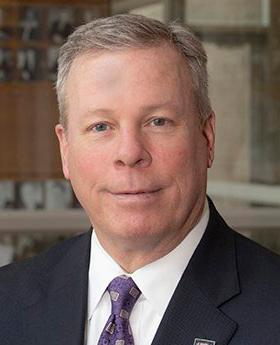
“We used historical census data,” Bob Cook, government relations director at Garver, said. “We even found several before and after photos of the I-30 project to show what the area on either side of I-30 looked like before I-30 came through. It was a fairly homogenous economic area; there was connectivity all the way through to downtown.”
Through the census data, the application was able to show that the construction of the interstate had severed that previous connectivity, resulting in a disparity between the two sides. According to the application, the percentage of families below the poverty level on the east side is 200 percent to 400 percent higher than the city, county and state averages for Arkansas, and the percentage of individuals who have obtained a bachelor’s, master’s or doctorate degree on the east side of I-30 is 82 percent lower than the Little Rock city average. The east side also has a significantly higher rate of disabilities; the percentage of households with one or more persons between the ages of 5 and 64 with a disability is 58 percent to 79 percent greater than the city average.
While plans to expand I-30 experienced significant opposition, the deck park plan has enjoyed extensive support from local communities and organizations, such as the Coalition of Little Rock Neighborhoods.
Buckley O’Mell, vice president of advocacy at the Little Rock Chamber, said support for the deck park plan has been overwhelming.
“We received countless letters and emails from church leaders who have congregations in these neighborhoods, business leaders, residents, civil rights activists who said, ‘Yes, this is a good thing.’ It helped show to the federal government that ultimately was reviewing these that we had community support, and it wasn’t just the city and the state.”
Submitted jointly by the city of Little Rock, ARDOT and the Coalition of Little Rock Neighborhoods, the application was not only successful, but won the maximum amount of funding that can be awarded for a planning grant under the RCP program. With the $2 million awarded, the city will be able to reach a level of preliminary planning necessary to be awarded construction grants, which will come with a much greater amount of funding.
The planning stage is set to begin in the near future, and though Garver assisted with the application process, any future role in the project is not guaranteed; the city will issue an RFP open for other engineering firms to offer their services.
Details on either the eventual cost or design are unavailable at this stage. The price tag could vary wildly based on a number of factors – for example, there is a particular length at which
a ventilation system would need to be installed underneath the deck park, which would obviously come at a significant expense both for installation and maintenance. Likewise, it could become much more expensive if it is decided that the deck park needs to support the weight of vehicles.
When the Little Rock Chamber announced at a press conference that it had received the grant, it showed a rendering of what the park could look like. Yet, chamber officials were careful to stress that it was only for the purpose of scale; what the park will actually look like will be decided through collaboration with the community.
“It’s really what happened with the 30 corridor process,” Chesshir said. “Yes, there were people who were against it to begin with. But going through that process helped refine the design into something that is much different than originally anticipated. But in our opinion, and I think the opinion of everyone that’s been a part of the process, much better than originally anticipated.”
Chesshir has high hopes for what the I-30 deck park will mean for Little Rock, and it’s easy to see why in the light of other recent changes to the city. Where massive spiral offramps occupy a large chunk of downtown, the park rendering shows 17 acres of greenspace. Where a large asphalt barrier now divides the community, a new deck park would connect the neighborhoods of East Village and Hanger Hill to the River Market and Arkansas Museum of Fine Arts in MacArthur Park.
“I had some younger friends who, when they first saw the architectural renderings of what the 17 acres could be like, along with the deck park, immediately said, ‘Wow, I’d want to live downtown if I can live next to that.’ And so, we see it as not only a place for recreation, but a place for life,” Chesshir said.
“So, taking into account what’s going to happen at the surface, and what the deck park can be to accentuate that, all of a sudden Little Rock becomes amazingly walkable. At the same time, people can see it as they’re either coming here or coming through here. And so, it truly is an opportunity to create a city, the core of a region, that’s unlike anything else in this part of the country.”
Just outside the stylish, sun-splashed offices of Moses Tucker Partners, the city of Little Rock hums with the sounds of reinvention and renewal. Up and down the block, one can see development and construction, as the old is stripped down to starched, bare earth to be rebuilt skyward in glass, steel and brick or carpeted over with an ocean of turfgrass and trees.
All of this newness is the latest ring grown into the city’s trunk of history, radiating from the architecture of buildings, hinting of the past even as they are repurposed for today’s generation. It’s a fascinating process, this commingling of the old and the new, and one that business partners Jimmy Moses and Rett Tucker have seen before.
In fact, if one were to distill the pair’s career in real estate, it would look a lot like what’s happening throughout the downtown district today as the city continues to evolve and morph to better embrace the future. Time and again during the firm’s history, the duo did likewise, seeing what others didn’t and more often than not, bringing their visions to life.
Today, Little Rock circulates among the buildings Moses and Tucker coaxed out of decrepitude into function, their projects having become the yeast of audacious thinking, the blueprint for what’s possible. It’s paid the bills, sure, but more than that, each brick, bulb and doorknob has improved the city, their hometown, moving it one inch closer to the place they know it can be.
RETT TUCKER ON
Don’t wait for permission! As our friend Dean Kumpuris said, ‘You’ve just got to go do it.’ Learning from failures, I think, is such a big deal for young people to get plugged in and care about making good things happen and not just making their life good.
“Every time we thought about a project, we thought as much about how it might possibly impact the community as it would us personally and financially,” Moses said with an impish grin. “We laughingly said it, but it’s the truth: ‘We have not really been overly driven by making a lot of money, and we’ve been successful at that.’ But we’ve also been able to build and build quite a bit, I think, because we were altruistic about our thoughts for and about what we could make happen here for a better city.”
“If you have the roots, you might survive
JIMMY MOSES ON NONCONFORMITY
We’re a maverick company. Up until the last couple of years, we were a small boutique development company doing very unusual projects in a community that had not seen anything like it. And many people thought we were completely nuts, and maybe we are. But I also think people have always underestimated our commitment to being really, to this day, more about our community being successful than any of us individually. Because of that, we’ve been able to deliver better projects and take on things that others wouldn’t take on because we so absolutely believed that it was the right way to go about conducting yourself.
the tornado,” Tucker said. “I’m reminded of a guy from Portland, Oregon, that came here. Lots of big talk. He was going to do some things on Main Street, and he lasted a few years, and then he’s gone, never to be heard from again. Well, we couldn’t do that. Our lives are here. We have all the family history here. I love Arkansas, but I really love Little Rock, and I want it to be something special.”
Both men are as close to Arkansas peerage as the city has. Tucker’s family tree is studded with civic mindedness, as several members of his family have held offices in state, federal and local government including his father, Edward, who sat on the local school board.
“I remember we had police protection at our house several nights,” Tucker said. “I remember answering the phone, which they probably should have told me not to do, and hearing ‘N-word lover’ screamed over the phone. I was 9 years old, and that made quite an impression.”
Moses’ family arrived here from Germany whereupon his great-grandfather, Herman Kahn, and his two sons, made their fortune in banking and real estate development. Other ventures included
To me, leadership is an interesting concept. It only works if you can get others to follow you. We’ve been able to build a group of people who generally believe in what we’re doing, who are excited about it, who get that we wanted to make our city as important and good as we did our company and our families. They bought into us by just coming here and being a part of it. If you can build camaraderie and friendship among people who are good at their job and they share your vision, you can really do a lot.
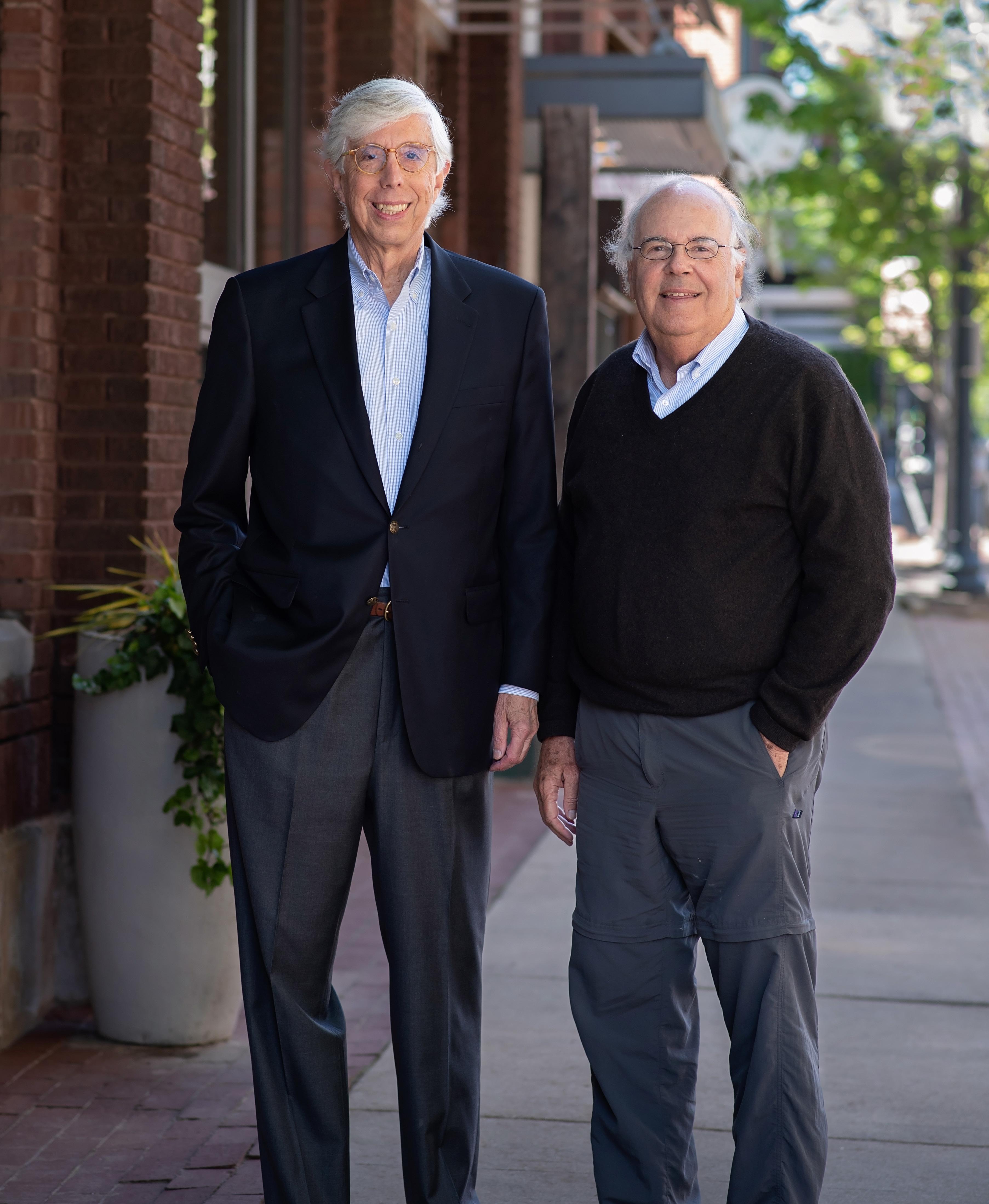 Rett Tucker, Jimmy Moses (Photo by Jamie Lee)
JIMMY
LEADERSHIP
Rett Tucker, Jimmy Moses (Photo by Jamie Lee)
JIMMY
LEADERSHIP
One nice advantage we had is lack of competition, or maybe lack of interest. We built 500 living units in and around the River Market. What if three other companies had done that? We might have just a dearth of empty buildings. I don’t know if we scared the others off or they were smarter. Either way, they were out in the suburbs making easy money and we were down here in the trenches fighting to build a better downtown and a better community. That worked to our advantage quite nicely.
the renowned-in-its-day Marion Hotel, built where the Marriott and Statehouse Convention Center now stand, and Moses Melody Shop on Main Street, a music and electronics store than opened after World War I. Both were notable in their own right — the hotel hosted the likes of Harry Truman, Douglas MacArthur and Will Rogers, while the store boasted a color TV lounge in the 1960s.

But the biggest impact the family holdings had was as a part of the glory days of downtown, an era that was already in decline when Moses and Tucker left for college, but which served as the template for everything that was to follow in their professional lives, even if they’ve had to paddle upstream against the tides of public perception and conventional thinking ever since to do it.
“We grew up in Little Rock at a time where we were pointed to from the outside as sort of the end of the earth, if you will,” Moses said. “Poor, barefoot, undereducated
and generally last at everything, the joke being, ‘Thank God for Mississippi.’
“There was some truth to that, but I think what drew Rett and I together, and what made us good partners, is we both had this burning desire, each in our own way perhaps, but collectively it’s worked really quite well, to make our city a better place. If not for us, then for our kids and our grandkids.”
Moses and Tucker were in each other’s orbits early, having graduated one year apart from Little Rock Hall High School and Washington and Lee University in Virginia. After college, Tucker quickly became a partner in one of the largest commercial real estate companies in the area, while Moses launched a small firm with Jim Nosari.
“We were small and fledgling and struggling. We were trying to do some projects in Little Rock that were exciting,” Moses said. “I got a call one day from Rett, and I thought, ‘Oh gosh, I wonder what I’ve done wrong to upset these guys?’
“Rett said, ‘I’d like to come visit with you.’ I said, ‘Sure. What about?’ He said, ‘If you don’t mind, just hold on, and I’ll tell you when I see you.’ Now I really wondered, ‘What in the hell have I done to offend these guys?’”
The two got together for lunch on a rainy day 25 years ago. Tucker laid his cards on the table; he’d been watching Moses Nosari’s projects in the city’s core and felt a kinship of purpose.
“I liked [Moses’] focus on, simply put in one word, downtown. I was at a larger company that had a much broader focus,” Tucker said. “Coming here would allow me the freedom, creativity and ambition to make a difference, to build a better city.
“You talk about how we matched up; I’m more creative than you might think I am, and he’s more detailed. A lot of people think he’s just the dreamer, but he’s also great with details. We were a good match in that way.”
The idea of two guys from the neighbor-
hood blazing their own path to save the city sounds romantic, but at the time, it looked a lot like professional suicide. Little Rock’s downtown was rotting from within in that era, comprised largely of block after block of dusty warehouses and buildings crumbling where they stood. Moses and Tucker saw something else, and while precious few people may have fully bought into their view, enough of them held properties they didn’t entirely know what do with.
Building on Moses’ first big win — establishing a three-block development called the River Market — the partners now looked to the broader neighborhood around it.
“The River Market opened in 1996, and although it met with immediate excitement and some success, if you moved a block off of what is now Clinton Avenue, which was East Markham, you were in no man’s land,” Moses said. “When Rett and I got together in the late ’90s, we were focusing on trying to put some housing in the core of downtown Little Rock; there was virtually none.
“Our first project, the Tuf Nut Building, we went to Warren Stephens. We said, ‘Warren, you’re using this for storage over here. We’d like to buy it and fix it up and put loft apartments in it.’ He looked at us and said, ‘You guys are nuts. But if you want to try, I’ll sell it to you. We can put our storage anywhere. Good luck.’ We said, ‘Oh, by the way, would you stay in and be a partner with us?’ We didn’t have any money or partners then. He said, ‘Sure, I’ll do that.’”
From there, the company’s portfolio has swelled considerably to include the Arkansas Capital Commerce Center, First Security Center, 300 Third Street, the River
Market Tower and, in partnership with Central Arkansas Library Systems, the Arcade Building, home to the upscale Cache restaurant, Ron Robinson Theater and other offices and businesses.
I always ask the young people, ‘Is your position here a career or is it just a job?’ Make it a career and you’ll do well. You’ll have higher job satisfaction and probably a better life. Caring about what you do is important; all the typical ‘treat people fairly, tell the truth, work hard,’ those are all simplistic cliches, but they apply.
In addition, the duo has worked to bring four new hotels to the River Market District, invested heavily in developing multiple historic properties in the city’s core as well as built several multifamily housing projects. The formula didn’t guarantee the unmitigated success of every project, but bonedeep doggedness ensured they’d never completely fail, either.
“I think the deep-rootedness that we both have helped greatly, particularly when we struggled the most. Our roots really played a big role to get us through those tough times,” Moses said. “There are tough times in business, and we’ve experienced them. We went for several years without any pay because we couldn’t make it. But we wanted to keep our business going, and we wanted to keep our vision going, and that rootedness drove us to places maybe others wouldn’t get to.”
Today, the proof of the partners’ vision is nearly everywhere you look, not just in downtown or around the city but throughout the state, thanks to a Northwest Arkansas presence that came on the scene a few years ago. Now both in their 70s, the partners regarded for so long as lunatic dreamers are widely hailed as icons of urban planning and real estate development.
There’s a palpable air of pride in the stories they tell about the projects they’ve
Don’t let somebody tell you it can’t happen. Don’t buy into that. My earliest efforts were failures, the biggest one being Project 2000, the Diamond Center. I put my heart and soul into that and when it fell apart, I really wanted to leave Little Rock. Ultimately, once I pushed away my feelings, it made me even more convicted that by God, we can do something great here. Have a real vision you’re passionate about but know the key to your success is not just the vision, it’s the tenacity, sticking with it long-term knowing you’re absolutely going to get curveballs thrown at you. As I’ve always said, because of that, you better learn how to hit the curveballs.
brought to life, but not necessarily contentment. There are, after all, still mountains on their horizon left to climb, including an opus project that would serve as the capstone to a long and illustrious career.
“Downtown campus for UA Little Rock,” Tucker said, flatly.
Moses said, “That’s exactly what I’d say. I think we are of the collective opinion that, if given another 25 years, which we probably don’t have or shouldn’t have, that we would do what we could to create an outstanding campus of UA Little Rock in the heart of the city.
“The two would complement each other so well; both are so necessary, and they’re so, right now, misunderstood. I would dream, and I really do dream about this, if we could create that campus downtown that it would really serve Little Rock well for the next generation.”
Whether or not that project ultimately happens remains to be seen, but those who would bet against the pair don’t have history on their side. Regardless, the duo’s body of work has left their respective signatures engraved into the bedrock of their hometown for all time.
“To me, there’s a recipe for a successful city,” Moses said. “With the building blocks we have here, Little Rock is an opportunity waiting to happen. We’ve tried to coax that along. We haven’t gotten there yet, but it’s being worked on. Little Rock is going to be truly great over the next 25 years, I think.”
Tucker said, “This comes off as a criticism, and I guess it is, but there are a lot of people that are just happy in their work and they have a good life, but they don’t get plugged into the community. You have to care about the whole city. It matters who’s the mayor. It matters how UALR is doing, it matters what the school district’s doing, it matters that we get the dental and the veterinary schools. You have to care.”
The Arkansas Game and Fish Commission offers wildlife management assistance for private land. If you want to get the most out of your land, one of our private lands biologists can visit your property and make recommendations based on your wildlife objectives.

Scan to learn more about Private Lands Programs available to you.





ACRETRADER
Name: Rolling Fork Timber Tract*
County: Sevier County
Acres: 3,209
Price: $7,412,790
*funding began in 2022; closed in May 2023
Name: Jennette Farm County: Crittenden County
Acres: 620.00
Price: $4,011,400
Name: Bucklake Farm
County: Crittenden County
Acres: 772.90
Price: $3,895,416
Name: Strohl Farm
County: Prairie County
Acres: 333.5+/-
Price: $1,801,000
Name: Mitchell Farm County: Phillips County
Acres: 314+/-
Price: $1,250,000
Name: Jerry White Estate Farm
County: Lawrence County
Acres: 160+/-
Price: $650,000
DAVIS DUBOSE KNIGHT FORESTRY & REAL ESTATE/ UNITED COUNTRY REALTY (LITTLE ROCK)
Name: La Reina Ranch
County: Sevier County
Acres: 2,201
Price: $7,712,690
Name: El Ranchos County: Cleveland County
Acres: 2,343 acres

Price: $7,675,257.25
Name: Millwood High Fence Hunting Retreat County: Sevier County
Acres: 1,330 acres
Price: $2,600,000
HABITAT LAND CO. (SEARCY)
Name: Historic Penn Bay on the Cache River County: White County
Acres: 162
Price: $2,327,500
Name: Mandt Tract County: White County
Acres: 1,655
Price: $4,072,555
Name: Arkansas River Farm County: Conway County
Acres: 1,518
Price: $3,795,000
Name: Big Slash Hunting Club County: Monroe County
Acres: 1,650 +/-
Price: $11,100,000
Name: Fletcher Farm County: Pulaski County
Acres: 2,278.73 +/-
Price: $4,557,460
Name: William and Mary Farm
County: Jefferson County
Acres: 692 +/-
Price: $3,615,000
Name: Paradise Sporting Club
County: Lonoke County
Acres: 1,500 +/-
Price: $7,500,000
Name: The Preserve County: Prairie County
Acres: 1,200 +/-
Price: $8,594,000
Name: Beauchamp Duck Woods
County: Prairie County
Acres: 1,000 +/-
Price: Undisclosed
DELTA LAND MANAGEMENT/MOSSY OAK (NORTH LITTLE ROCK)
Name: Lonoke Duck Club
County: Lonoke County
Acres: 678
Price: $8,500,000
Name: Cross Pond Hunt Club
County: Pulaski County
Acres: 2,449
Price: $4,899,740
Name: Ballenger Farm County: Jefferson County
Acres: 816
Price: $4,300,000
NEELEY FORESTRY/UNITED COUNTRY (CAMDEN)
Name: Kings Creek Tract
County: Columbia County
Acres: 393.00
Price: $800,000
Name: SE Ogemaw Tract County: Ouachita County
Acres: 187.59
Price: $485,000
Name: Pine Prairie Tract
County: Bradley County
Acres: 208.15
Price: $428,279.85
WHITETAIL PROPERTIES (PITTSFIELD, ILL.)
County: Marion County
Acres: 1,122
Price: $4,750,000
County: Miller County
Acres: 1,230.05
Price: $2,295,483
County: Van Buren County
Acres: 1,180
Price: $2,150,000
Research by Mak Milliard
It’s a problem most cities or regions would love to have — keeping up with record growth. And Northwest Arkansas continues to experience it. Such growth at such a fast rate, of course, presents logistical challenges.
Over the past six decades, the region has grown from a population of roughly 137,000 to one approaching 600,000 in 2023. Growth by decade since 1970 has come in at 35.8 percent, 38.4 percent, 17.1 percent, 46.2 percent, 35.3 percent and 24.2 percent, per the U.S. Census Bureau.
Yet, despite the influx, the region continues to be listed among national publications’ lists of best places to live.
Companies like C.R. Crawford Construction of Fayetteville have played a big role in the region keeping up with all its growth.
AMP spoke with Scott Stokenbury, C.R. Crawford’s vice president and partner, about handling such a workload. He’s been with the company since 2007 and previously worked for the Alice Walton-founded Llama Company, Walmart corporate and Ozark Assets. He received three degrees from the University of Arkansas, including an MBA, and is a Certified Commercial Investment Member and Certified Development, Design & Construction Professional.

AMP: In what areas is most of C.R. Crawford’s work being performed?
Stokenbury: The bulk of our projects are in Arkansas and, right now, there is a lot of activity in the multifamily and hospitality industries. We have also seen a focus on warehouse and distribution-type projects, especially with Amazon establishing its presence in the state. Within Arkansas, K-12 projects are also a specific focus of ours.
Our food and beverage clients have experienced strong demand over the last couple of years, which has led to expansion opportunities for them as well.
Scott StokenburyAMP: Is the region doing a good enough job of keeping up with its growth?
Stokenbury: I think the region has made efforts to manage its growth effectively. Various infrastructure projects have been implemented or are planned to help accommodate the increasing population and improve transportation networks. Our local governments, along with organizations like the NWA Council, have been proactive in planning for growth.
The growth is continuing to happen, and I don’t anticipate it slowing down anytime soon. So, we have to continue to work together and try to get ahead of the future growth as best we can.
People are still moving to NWA every day, so the area is definitely doing something right.
AMP: Which areas need the most attention in terms of building and infrastructure?
Stokenbury: I think utility planning and expansion (water, sewer, gas, electrical, etc.) is critical to allowing the desired development and growth to continue in an effective manner. Health care and workforce housing have probably received the most attention over the last 12 months, regarding some of the important and more urgent-need items.
AMP: C.R. Crawford worked on The Marshall in Fayetteville; any other student housing projects on the horizon?
Stokenbury: Yes, C.R. Crawford was the construction manager for The Marshall. Over 600 new beds were delivered to the market with this project, and on day one of when it opened, it was close to fully leased, which is why we are still seeing such a demand for housing projects near the UofA campus.
The Marshall is actually a private development and not on UofA property, but definitely caters to the student population and was designed with them in mind. We are not involved with any UofA housing projects at the time, but are working on a couple of projects in the pre-construction phase for the university.
AMP: Aside from The Marshall, what other company projects that are helping to address NWA’s growth needs?
Stokenbury: Multifamily is in demand across the entire NWA region. Some of the projects we’re involved with include City U (Bentonville), Crystal Flats (Bentonville), The Plaza at Pinnacle Springs (Rogers) and Via Emma (Springdale).
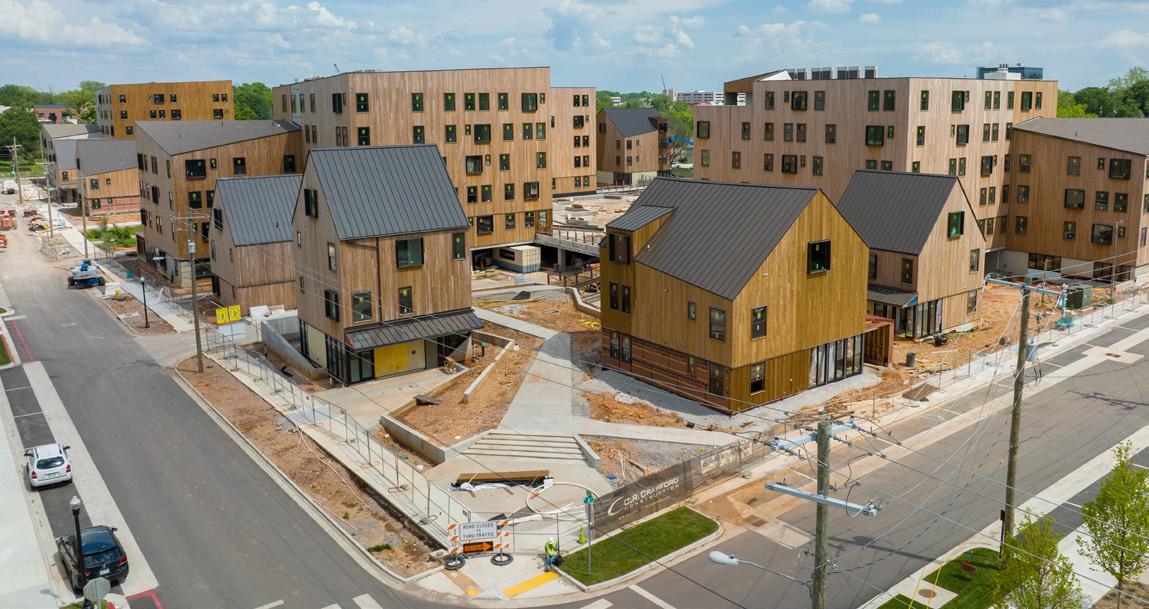
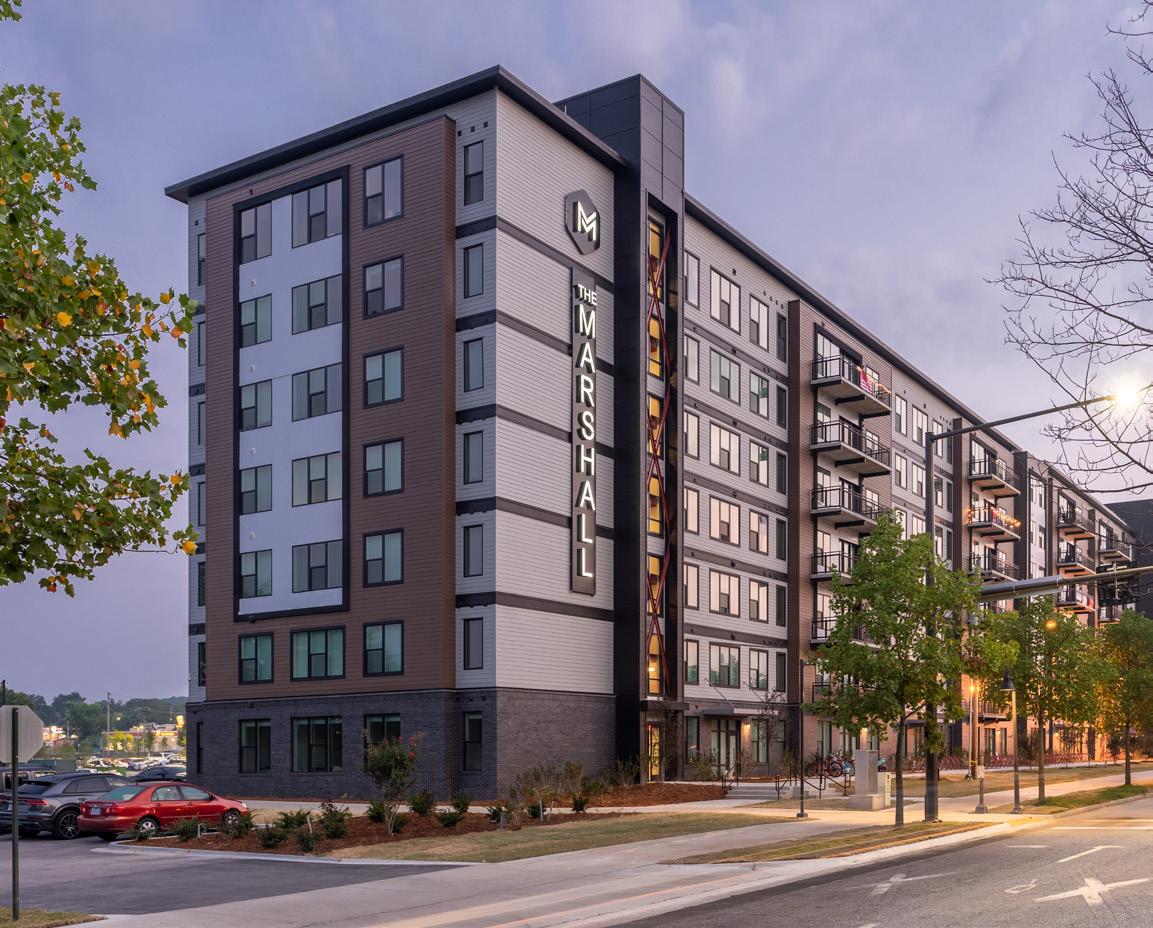
In the health care industry, UAMS and Washington Regional Medical Center have both been proactive in upgrading and expanding clinics in the area, and we’ve been thankful to have them as repeat clients. Other recent health care projects in some stage of construction include Ozark Prosthodontics, Best Start Pediatrics, Eason Counseling, McDonald Eye Associates and a couple of other medical clinic/ambulatory service type projects that are just now starting the pre-construction phase.
We are working with the UofA on a couple of remodel proj-
ects, and it seems that all the K-12 schools are growing in this area. We are about to complete our third project for the Elkins School District. And, of course, there is the need for more early childhood development services — we are in the process of building our fourth pre-K in about three years.
AMP: What does NWA look like in 5, 10 years?
Stokenbury: I think you will continue to see larger projects, with more density. Mixed-use type projects, with housing, food, neighborhood retail and proximity to entertainment or park settings will be something to look for. We are thankful that we have constructed almost 400 projects in NWA over the last 15 years. Hopefully, we can continue to be the leader in construction for the area over the next 15!
AMP: How has the general shortage of workers impacted C.R. Crawford and the construction industry as a whole?
Stokenbury: Thankfully, our relationships with the trade partners have only grown stronger over the past few years, and we have not had major impacts to our projects. I think the biggest impact on the general shortage in the trade industry has been the rising labor costs and competition created with larger projects either starting or being anticipated.
Unfortunately, that cost increase gets passed down to the owner at the end of the day, just like grocery and other consumer goods. We have been involved in several career technical projects over the past few years, and I know the educators are focused on trying to help students to be aware of the opportunities that are out there in the construction industry these days.
AMP: The supply chain ... have things gotten better?
Stokenbury: Yes, things have definitely improved, and most have normalized (or at least to the “new normal”). There are still a few items that are taking a lot of creative efforts to keep from greatly impacting development timelines, but we have an experienced group of procurement and operation teams that are constantly making sure our clients are receiving the most efficient project, and we meet or exceed any expectations they may have for the project. A couple of things still hold true … communication is still key, and each project is unique.

For those Arkansans of a certain age — the ones who still spook at the mention of Southwest Conference refs or remember Minute Man, the original Murray’s and the Mountain Inn — it’s sometimes hard to fathom the rise of Tyson Foods over almost a century from simple Springdale hatchery to protein-producing global giant.
Tyson’s recent acquisition of Williams Sausage, the Tennessee family operation that followed a similar path to the one forged by John W. Tyson in 1931, marks entry No. 35 to the company’s impressive portfolio. Tyson’s protein offerings run the gamut of meat consumption — poultry, beef, pork — and reflect a decade of robust international expansion. Last summer, Tyson acquired Saudi meat producer Supreme Foods. But it’s the well-known domestic brands now parked under the Tyson umbrella that pack a punch. Brands like Williams, Hillshire, Jimmy Dean, Ball Park, Sara Lee and State Fair.
Despite Tyson’s latest earnings report reflecting a volatile protein market, the Williams deal portends market gains in the sausage and bacon segments.
From that original hatchery in Northwest Arkansas grew a company that realized sales of more than $53 billion in 2022. A company with locations all over the world and roughly 140,000 employees. Branching out from chicken means that Tyson, the iconic Arkansas firm associated with other homegrown behemoths like Walmart and J.B. Hunt, now is the major producer of protein in the United States. Roughly one in every five pounds of chicken, beef or pork consumed in U.S. market is produced by Tyson.
And the company is on its fourth generation of Tysons serving in leadership roles. Founder John W. passed the torch to his son, Don, who passed it to his son, John, who now chairs the Tyson board with Donnie King serving as CEO. But John’s son, John R. Tyson, 32, and great grandson to the company’s founder, is following in family footsteps and serves as executive vice president and chief financial officer. Following his graduation from Harvard with degrees in economics and psychology and earning an MBA from Stanford, John R. worked as an investment banker for J.P. Morgan before joining the family business as chief sustainability officer in 2019. Outside of his work at Tyson Foods, he serves as a lecturer at the University of Arkansas Sam Walton College of Business, a board member of Winrock International and a member of the nonpartisan think thank, Council of

Though he didn’t join the family business quite as early as his father or grandfather before him, John R. always knew it was inevitable that he would.
“Growing up in Springdale around the business, I think I recognized at a young age how much of a blessing it was to have the opportunity to impact so many different people in and around Tyson Foods,” he told AMP. “This is especially true for our team members and customers. My interest in the company only accelerated in college when I started attending board meetings. Throughout my education and my early work experience, I looked for ways to build skills that would help serve me in my career at Tyson Foods. Today, I’m grateful and humbled by the opportunity to help lead it into the future.”
Aided by his work experience outside the family business, John R. understands the model Tyson Foods has used to become one of the world’s leading protein suppliers. He calls it “simple,” and it’s one that served his forebearers well.
“If we can provide exceptional service to our customers, offer highquality, safe, sustainable and affordable products to our consumers, and take care of our team members, we will win,” he said. “At the end of the day, it is and always have been the people who work at Tyson Foods who have played a pivotal role in our success story. Our team members will continue to be the secret to our success in years to come.”
Tyson Food’s expansion beyond chicken has wrought both challenges and opportunity. A volatile protein market and supply chain issues have served as thorn-in-side throughout the industry. At Tyson, 2023 sales are up slightly, yet expectations remain unmet. Don’t expect them to remain so.
Last year, the company launched a new program designed to create a more agile organizational structure focused on continuous improvement and faster decision-making. As of the second quarter, the company already had surpassed its FY2024 goal of realizing $1 billion in productivity savings.
Wes Morris, Tyson Foods’ group president for poultry, is an industry veteran who’s been with Tyson since 1999. He told AMP the company is facing some challenging market conditions, many of which are out of its control — low commodity prices, higher input costs and export markets closed due to Avian flu.
“While our poultry business is not fully exposed to commodity markets, we are not immune to their dynamics,” he said. “Commodity prices for most fresh chicken cuts are much lower than last year. What we pay for ingredients to make our feed is up year over year, and there’s certainly been a challenge with volatility in commodity grain prices.
“It’s important to remember there’s a lot we can control, and we are hyper-focused on thoughtful decisions to strategically place our business on a path to a more sustainable future.”
Morris further stressed the company’s focus on food safety, calling it
“central to everything we do at Tyson Foods.” He said the company maintains the highest standards of food safety, based on sciencebased, data-driven and of course, regulatory, frameworks.
“We work in active partnership with the USDA, and we have always advocated for policies backed by science that maintain and expand the trust of consumers.”
In the company’s latest earnings call, John R. Tyson touted opportunity — to innovate, expand and acquire into new spaces. He also noted growth of the company’s existing products and an “attractive, disciplined” approach to mergers and acquisitions.
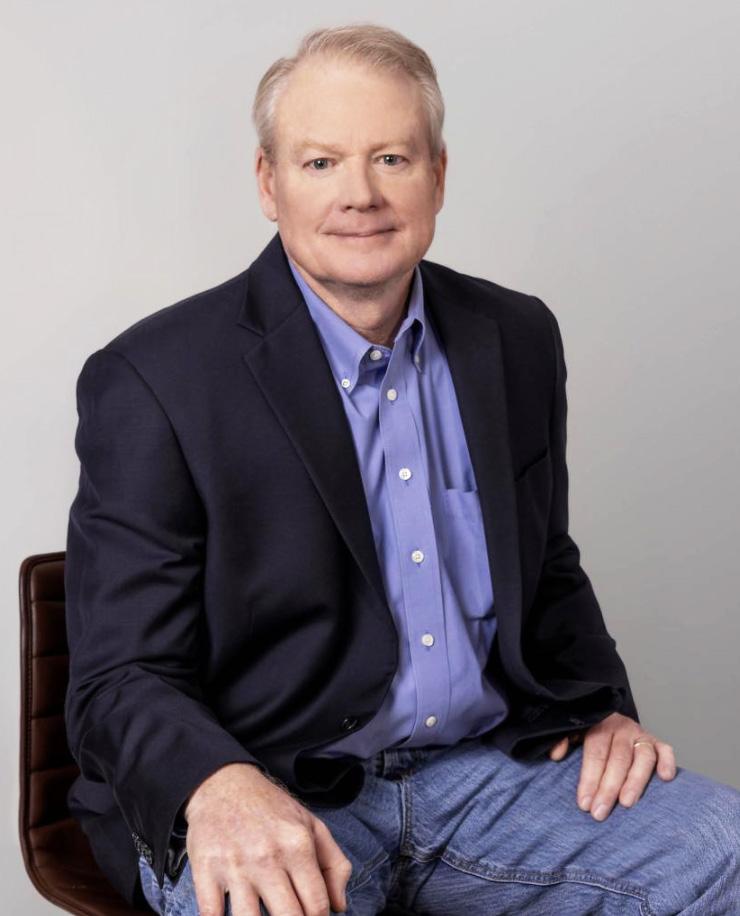
Ultimately, he told AMP, Tyson’s approach comes down to investing in its employees and the communities it serves, wherever they may be. The Tyson Foods community in and around Springdale is poised to grow following the company’s decision last year to consolidate all its corporate offices in Northwest Arkansas.
“We’re excited to bring more team members to Northwest Arkansas and share with them what makes this region so special,” he said. “We care deeply about the communities in which we operate, which today is 110 communities across the U.S. and in over 20 countries, and this especially applies to our hometown and home state of Arkansas. Tyson Foods has a history of support in the areas where we live and work.”
King, another Tyson Foods veteran who took the role of president and CEO in 2021, was bullish on the company in that 2Q earnings call, citing Tyson’s branded food performance.
John R., the fourth generation Tyson paying his dues in the family business, wouldn’t have it any other way.
“I feel confident that the best days of Tyson Foods are yet to come,” he said. “We have a strong growth strategy that builds on the foundation we already have in place. We will continue to invest in the experiences of our team members, the satisfaction of our consumers and customers, returns for our shareholders and the future of our communities and planet.”

For most Americans, subjects bringing to mind Arkansas include the Ozarks, hunting and fishing, Bill Clinton, Walmart, the Razorbacks ... One industry that should be included in the pantheon of Arkcentric subjects is poultry, actually the state’s leading agricultural industry.
More than 157,000 jobs in Arkansas are associated with poultry and more than 6,500 farms in the state produce some kind of poultry product. In 2021, the poultry industry produced $5.1 billion, or 50 percent, of the state’s total agriculture receipts. Of those, broilers (chickens raised for their meat) alone accounted for 38 percent.
The Poultry Federation, launched more than 60 years ago in Little Rock to advocate for Arkansas poultry producers, now represents farmers in Missouri and Oklahoma as well. From its Little Rock base, it has become one of the nation’s leading poultry advocates.
In 2021, poultry accounted for 2 million U.S. jobs that paid more than $125 billion in wages. That’s an economic impact of more than $576 billion.
In June, the Poultry Federation held its 63rd annual Poultry Festival in Rogers, a two-day celebration of the industry. This month, AMP takes a look at the poultry industry’s impact, its efforts to maintain food safety and let more Americans know that sometimes, chicken is what’s for dinner.

Whether one wants to chat about chicken or talk turkey, the numbers don’t lie. Poultry is coming off a big year. The industry experienced a $77 billion 2022, to be precise, according to the U.S. Department of Agriculture.

That’s up 67 percent from the $46.1 billion the industry earned in 2021. Broilers accounted for $50.4 billion of that ’22 total, about two-thirds of it, followed by egg production ($19.4 billion) and turkeys ($7.1 billion).
Poultry is a longstanding staple of the American diet, and demand isn’t expected to wane. And with that growth comes challenges and opportunities.
Marvin Childers leads The Poultry Federation, the Little Rock-based advocate for producers in Arkansas, Oklahoma and Missouri, and he sequestered a poultry roundtable —an egg-shaped oval table, if you will — of local and national industry leaders to discuss those challenges and opportunities.
Joining Childers at this digital table is an all-star roster that includes:
• Jennifer Cook, executive director of the Arkansas FFA Foundation;
• Billy Hufford, vice president of commercial operations for Aviagen, a global supplier of broiler breeding technology based in Huntsville, Ala.;
• Andrew Lekwa, manager of the Ozark complex for Butterball, the global turkey producer based in Garner, N.C.;
• Kevin McDaniel, senior vice president and general manager of fresh operations for Wayne-Sanderson Farms, based in Oakwood, Ga.;
• Lindsay Parker, senior sales manager with animal-nutrition firm Novus International, based in St. Louis;
• Todd Simmons, CEO of poultry-feed supplier Simmons Foods, based in Siloam Springs;
• Keith Smith, vice president of sales for Keith Smith Co., one of the nation’s largest independent producers of broiler hatching eggs and a third-generation Arkansas company based in Hot Springs.
AMP: What’s the biggest challenge faced by the industry today?
Cook: The biggest challenge faced by the industry today is an uneducated public. Particularly in more urban areas of the U.S. where people are so far removed from the inner workings of our food supply, we see more and more push for government control over aspects of our industry that’s driven by fear and incomplete information.

To counteract this, we must prioritize agriculture education so that we have a unified voice that protects everyone from the farm to the fork. It’s been said that out of a $100 market basket of goods, only 14 cents actually returns to the farmer for his or her hard work. The other 86 cents pays for everything else on the value chain, from research and development to marketing and transportation and everything in between. When partial and often inaccurate information is sensationalized, we see disruptions in the delivery of our food as well increase in cost.
Often, this impacts those people with the fewest resources of all. This is why educating our young people about agriculture is critical — so they know the facts and counteract the fear mongering.
McDaniel: Labor continues to be a challenge. Jobs have traditionally been difficult to fill; COVID was particularly challenging, and current government policies regarding jobless claims continue to make it difficult. We’ve responded with some success with across-the-board pay increases, signing bonuses, enhanced benefits, including on-site family medical clinics along with full health care insurance packages, retirement and training.

Simmons: The poultry industry faces many challenges, but one of our biggest challenges is telling the story of the great work our growers and our team members do to grow a healthy, safe and environmentally responsible food product. Consumers are less and less connected to where their food comes from, and this makes it easier for the food industry to have misinformation spread about the health, safety, and nutrition of the food we produce.
Lekwa: Labor continues to be a challenge, especially with historically low unemployment. Attracting talent to rural settings, which is where most of our plants are located, can be difficult. However, we are making strides in the right direction, and our retention numbers are improving.
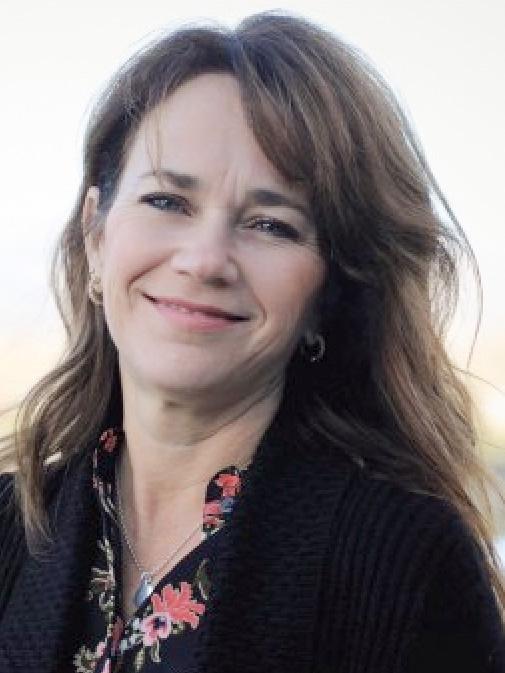
Butterball strives to be an employer of choice, offering competitive wages, bonus and referral pay, meaningful benefits and cultivating a culture of opportunity. We offer team members career advancement with training, online learning modules and giving front line employees a voice in continuous improvement of best practices. We also take the time to have some fun, encouraging participation in employee engagement events and community outreach activities.
Hufford: Our industry faces challenges on several fronts today, many the same as other industries. First are the effects still being felt primarily as a result of COVID. Those include shortage
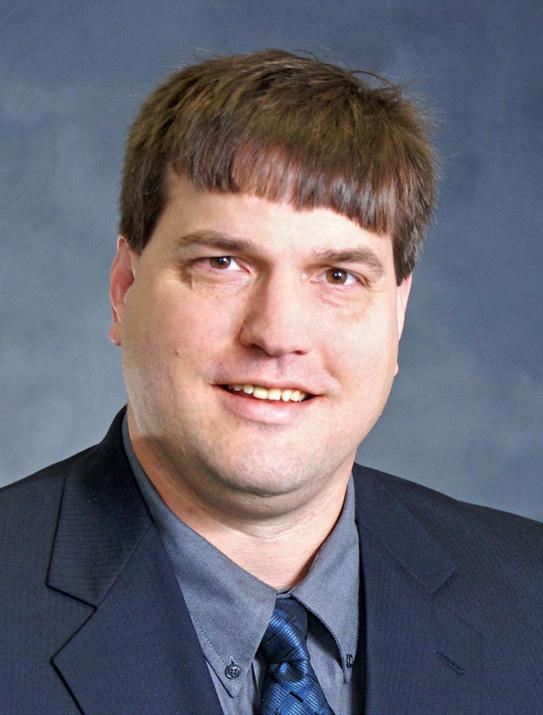
of labor and rising labor costs, record feed and fuel costs due to inflation, and we still see some supply chain issues with respect to supplies and equipment.
Of course, disease issues such as Avian Influenza are always top of mind for poultry companies, so mitigating those risks with a robust biosecurity program is critical to securing the chicken supply chain. Managing a successful poultry business in the face of these and other challenges is no small task, but our industry is resolute in its commitment to ensuring food security domestically and abroad.
Childers: The poultry-and-egg industry faces many challenges. One of the largest challenges is finding labor in certain areas. Jobs are plentiful, but many processing plants are still in need of employees. Additionally, we need employees who show up 40 hours per week. To solve this problem, many integrators are now offering four-day work weeks.
Another challenge is educating people where their food comes from. We strive to educate people, including K-6 students about animal agriculture. We know that people are not as connected to the farm as they once were, so our goal is to provide educational materials and speak whenever possible about our
food supply and how we are playing a role in feeding the world.
Smith: Our industry produces the No. 1 consumed protein in the USA, where over 150 million portions of chicken are eaten per day. The supply chain that supports this feat day in and day out is a robust coordination of farmers, producers and allied partners — an orchestra that was not formed overnight. We’re working today to engage farmers we will be working with 10 to 15 years from now, as well as helping kids in Arkansas get the skill sets we’ll need five to 10 years down the road.
Parker: Keeping consumers and producers connected. There is much opportunity for mistruth to be shared, which can create a divide among consumers and producers. This falsified information creates worry over food quality and safety, which is unfair to both parties. We should feel confident in our food supply, knowing there’s hundreds of thousands of experts who focus on safe, wholesome and affordable food, and that the constant focus on advancing these factors is always top of mind.
AMP: What should consumers know about the industry’s efforts to ensure worker and food safety?
Childers: The industry prioritizes food safety at the top. We strive to hire the best, train all employees and use the latest in technology to ensure the safest food supply in the world. The federation is fortunate to have members like Shane Acosta with Cargill–Springdale, who chairs our Food Safety Planning Committee. Shane has led the committee for the past 10-plus years, and it continues to provide the industry with one of the best food safety conferences in the nation.
The industry does not look at food safety as proprietary, and we share solutions to food safety issues across the board. We know we must continue to provide the most abundant, safest and affordable food supply, and we work at this every day.
Lekwa: Food safety is an uncompromising priority for Butterball as well as everyone else in the poultry industry. Our involvement with The Poultry Federation and other poultry-centric agencies, as well as Butterball’s internal work incorporating scientific
methods, allow us to make the best health decisions possible for our turkeys while ensuring we are doing our best to maintain a safe and strong food supply chain.

Parker: I feel the drive to succeed and advance the industry is prevalent because so many of us truly believe in what we produce. As parents and fellow consumers, we want our children and families to consume wholesome food and know truths of where food comes from.
Smith: USDA’s Food Safety and Inspection Service works with poultry producers to monitor and inspect processing with the ultimate goal of ensuring a safe food supply. Food safety is not a trade secret — we work with academia, state/federal resources and some of the best food-safety experts around the world to continuously improve processes as well as educate and inform consumers.
There aren’t any shortcuts in food safety. But, most of the basics are taught at home and haven’t changed in 40 years or so — refrigerate poultry products; wash hands, utensils and surfaces after handling raw poultry; cook to an internal temp of 165 degrees Fahrenheit and enjoy.
Hufford: Throughout the poultry industry’s supply chain, farmers/producers, drivers, administration, processing, and personnel in every area worked diligently as essential workers through the pandemic to ensure the public had a safe, accessible and healthy supply of protein. All did so to protect our way of life as stewards in animal agriculture.
McDaniel: Food safety standards did not change during COVID, and our approach continues to be effective. As a vertically integrated company, we’re able to scrutinize our operation from farm to production relative to food safety. A robust system of both visual and microbiological monitoring, combined with constant quality assurance, helps us ensure our products are safe and wholesome for consumers.
During COVID, we also put robust safety programs in place, including social distancing/increased workspace to minimize proximity; plastic shielding in areas where proximity is a concern; and personal protective equipment including masks, gloves, etc. We established and followed CDC and health department protocols around observed or confirmed illness, incubation periods, testing, etc., and made vaccinations available at no cost to every employee.
Recognizing the emotional impact of the pandemic on our employees, we launched our “Amazing Starts with Me” campaign to engage employees and recognize opportunities and achievements that directly impact our business and our four pillars of responsibility — People, Planet, Animals and Food, which includes food safety.
Simmons: The poultry industry has a great record of food safety. We are innovating constantly to find new ways to grow and harvest food in a humane and food safe manner. We work with the University of Arkansas and other research institutions to improve technology in feeding, growing and harvesting the animals to ensure a healthy and safe food product. I think the average consumer would be very pleased with the steps we take and the cleanliness of the facilities that produce their food.
McDaniel: Poultry’s popularity continues to climb, so meeting demand will be an ongoing challenge and an opportunity at the same time. We serve both the retail and restaurant/food service side of the business, so we’re constantly working with our industry partners and customers to stay on top of consumer trends and preferences in the marketplace.
Changing demographics and modern lifestyles continue to drive preference for convenience in meal preparation, and our R&D and customer innovation center are designed to tap into what customers and consumers are looking for in new products. We’re innovating at a faster pace than ever before; applied technologies like automation and production robotics are becoming commonplace, and we will see more advances going forward.
Simmons: The opportunities in the future are to continue to provide rewarding and great paying jobs, where team members can grow their careers and provide for their family’s needs, while also providing quality, safe, nutritious meat protein and




an amazing value to the consumer. It has been a challenging time since the pandemic has subsided, as we work to navigate the supply chain and inflationary impacts that we are all seeing.
Lekwa: The poultry industry will continue to be a significant force in feeding the world, but it will continue to face challenges. We are confident that partners like The Poultry Federation will help us rise to the challenges and solve for smart solutions that will benefit the greater good.
Hufford: All industry is facing the same challenges to train, attract and keep talent. There are opportunities in our industry to continue to innovate with technologies to make us more efficient as well as sustainable. For example, the processing segment of our industry has embraced more automation to improve efficiency and lower costs, and in live production, the advent of new augmented reality goggles increases accessibility to experts no matter where they are located to troubleshoot issues in the field.
And through our balanced breeding approach, our industry is addressing sustainability by enhancing feed and water efficiency and improving bird gut health and disease resistance. We also see opportunities to educate and encourage the next gen-
eration of poultry professionals by engaging with students. Ours is a great industry with an important responsibility to help feed the world.
Cook: Our food supply will continue to be a source of national security, and I believe we will see more agricultural interest from those in urban areas. The largest FFA chapter in America is the Chicago High School of Ag Sciences. People can relate to plants and animals in a way that makes learning relevant.

Instead of that occasional trip outside of the city limits where they pass row crops, instead they may have a new appreciation for the GMO-free soybeans grown in Lake City, Arkansas, by Delta Farms for George’s Poultry. As they hear things like “carbon neutral” and “renewable energy,” they will understand how the agricultural industry and the poultry industry specifically are here for whatever the future demands.
Broiler growth is prolific with less feed demands than ever before, resulting in a healthy source of protein that our world demands. We will continue to see our young people step up to the plate, offering the solutions we need to keep the world fed, and I’m glad that high school FFA members will be first in line to tackle whatever comes.

Childers: We believe there are many opportunities for us to help the industry with their challenges. As for labor challenges, we plan to invest more in 4-H and FFA programs; we continue to raise scholarship dollars to provide college scholarships to
to our people. We work together to serve our communities with great care and great chicken. From investing back into the areas we serve to providing a great place to work for our dedicated team of 26,000 employees and 1,900 family farmers, Wayne-Sanderson Farms is committed to delivering a great quality of life that Arkansas can count on for the long haul.


students who may end up in the poultry and egg industry; and we plan to expand our scholarship program and include trade schools and two-year schools. We want students to know there are opportunities that will provide them a long career in the industry, and we want to be their partner.
We also see opportunities in robotics and technology in the industry, and this requires us to be innovative and ready and willing to adapt to change. This will require skilled employees and lots of training and we are excited about this opportunity.
Smith: There are some big opportunities in automation, robotics, information systems and applied technology on the horizon. We’re already seeing high demand for these skill sets in the workplace, and the exciting thing is…they don’t require a fouryear degree.
We are working with industry and local schools to get students plugged into technical skills, many of which are available at technical colleges that are readily accessible to most Arkansans. Our company is excited about where technology will take the industry and our team members in the future. We also place a great deal of importance on the human side of agriculture like the importance of family, showing respect to each other as well as the environment and the animals we are entrusted with, keeping promises and continually getting better. The role we have in feeding others is an important part of the human condition — one we are very proud to participate in.
We are thankful for support from The Poultry Federation.



Then build with us... experience the C.R. Crawford DESIGN-BUILD di erence
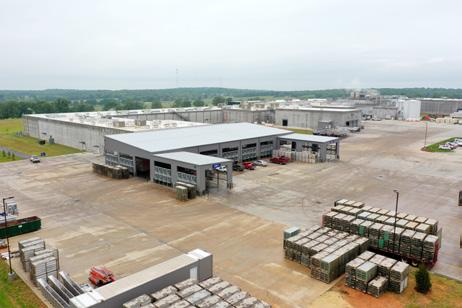
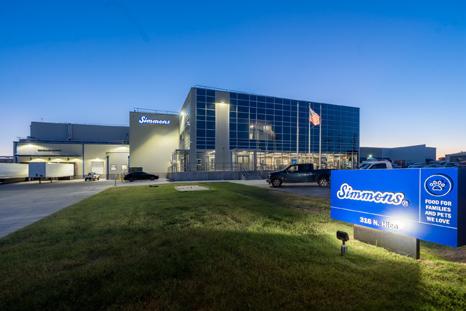



Today, we work together to feed the world.
According to the National Chicken Council, broiler production got its start in Arkansas, Georgia, New England and the Delmarva Peninsula, on which the state of Delaware sits. Today, the top three producing states are Georgia, North Carolina and Arkansas, which combine to produce about a third of U.S. sales, per USDA data.
The Poultry Federation, launched in 1954 as the Arkansas Poultry Federation, was rebranded in 1998 and now advocates for poultry producers in Arkansas, Oklahoma and Missouri. And it’s become one of the industry’s strongest voices, its reach extending far beyond the three states it serves in an official capacity.
Kevin McDaniel, senior vice president and general manager of fresh operations for Georgiabased Wayne-Sanderson Farms, considers TPF an invaluable national resource.

“The Poultry Federation makes sure our voice is heard and our priorities are taken seriously by the people and organizations who influence decisions impacting our industry,” he said. “It helps us stay engaged with our industry partners, state organizations and local communities while also representing our interests as it relates to legislative matters, government agencies, regulatory entities, state and local governments.”
That last part is especially important. So, it helps that a former Arkansas state representative, Marvin Childers, is at the TPF helm as president. Childers and his team work with legislators and state agencies in Arkansas, Oklahoma and Missouri to educate on how the industry works and the challenges it faces.
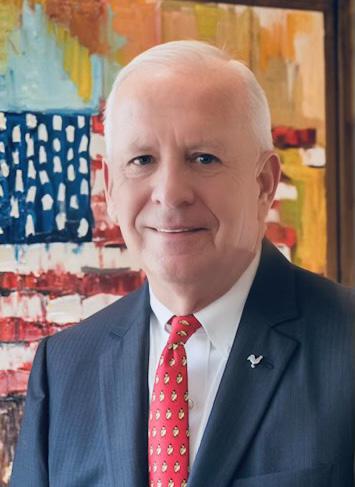
The organization is critical in advocating “from the farm to the table,” said Simmons Food CEO Todd Simmons. “This allows those legislators and agency personnel to make decisions in an informed manner on new legislation and regulations that are being considered.”
Childers downplays his role, but concedes that, “We act as a conduit and do our best to share solutions to problems that are occurring within the industry.”
One of TPF’s partners is Aviagen, a global supplier of broiler breeding technology with locations around the world but based in Alabama. Billy Hufford, its vice president for commercial operations, said TPF makes a lot of things possible across the industry, including its support of scholarships for students who want to enter the industry.
By Mark Carter“The Poultry Federation is an advocate for our industry with the government, providing a unified voice across multiple states to protect the interests of our industry,” he said, noting as well the networking opportunities and continuing education it makes available for the entire industry.
Known for its advocacy, The Poultry Federation also has become renowned for its events. TPF’s annual Food Safety Conference is considered among the best in the country, and the federation also hosts a nutrition conference and symposium for production and processing each year. And then there’s the annual two-day party and celebration of the industry known as the Poultry Festival, which draws thousands to Arkansas.
Keith Smith, vice president of sales for Hot Springs-based Keith Smith Co., one of the nation’s biggest independent egg producers, said his family company works through TPF to work with local 4-H, FFA and college groups to spark interest in the poultry field.
“Besides working with our state and federal agencies, a big part of the federation’s activities is focused on best practices and trends in food safety,” he said. “Which, by the way, the federation hosts the largest and most respected annual food safety conference, held here in Arkansas,” he said. “Our goal is to start conversations with students who might one day be the next world-renowned food safety expert.”
Jennifer Cook of the Arkansas FFA Foundation said The Poultry Federation affords her — fittingly — a bird’s eye view of the opportunities available to the more than 16,000 members she serves.
“It has been said that without agriculture, there is no culture,” she said. “Anything I can do to steer students towards a career that supports the agricultural industry makes me happy.”
Andrew Lekwa, manager of Butterball’s plant in Ozark, where pre-packaged fresh and frozen turkeys are produced, hires many of those students looking to advance in the industry. He believes they have no better advocate than TPF.
“It works tirelessly to better the business environment for poultry producers and is a champion for problem solving pain points in the industry related to supply chain issues, food safety, labor and regulations,” he said.
Arkansas ranks 3rd in the nation in the number of broilers produced.
• Number of broilers produced: 1.1 billion
• Pounds produced: 7.4 billion
• Value of production: $6.3 billion
• The broiler industry creates and supports 143,078 jobs in the state.
• In 2022, the industry was responsible for as much as $35.03 billion in total economic activity throughout the state.
• Jobs in the industry pay an average of $57,100 in wages and benefits
Arkansas ranks 7th in the nation for egg production value.
• Number of eggs produced: 4.2 billion
• Value of production: 912 million
• The egg industry creates and supports 1,162 jobs in the state.
• In 2022, the industry was responsible for as much as $327.84 million in total economic activity throughout the state.
• Jobs in the industry pay an average of $43,000 in wages and benefits.
Arkansas ranks 2nd in the nation for the number of turkeys produced.
• Number of turkeys raised: 26 million
• Pounds produced: 556 million
• Value of production: $593 million
• The turkey industry creates and supports 13,399 jobs in the state.
• In 2022, the industry was responsible for as much as $3.36 billion in total economic activity through the state.
• Jobs in the industry pay an average of $51,700 in wages and benefits.
Over 6,500 farms in Arkansas produce some type of poultry.
• Benton County is the number one poultry producing county.
• Other top production counties in rank order: Washington, Madison, Carroll, Yell, Hempstead, Howard, Sevier and Logan.


The Poultry Federation (TPF) is a multi-state trade organization representing the poultry and egg industry in Arkansas, Missouri and Oklahoma.

The purpose of The Poultry Federation is to promote and protect all poultry interests relating to production, distribution, merchandising and consumption of poultry and poultry products; to disseminate information relating to the various phases of the poultry industry in order to improve and expand markets; to increase efficiency in production and marketing; to encourage and support research in production and marketing of poultry; and to encourage and support youth programs in poultry work.
Learn more about us at thepoultryfederation.com
That old barnyard rogue, Foghorn Leghorn, helped carry Warner Brothers’ cartoon franchises from 1946 through 1964. And through syndication, seemingly will do so into perpetuity.
The bombastic rooster with the thick Southern accent surely ranks among the most recognizable and iconic cartoon characters of all time. In animated shorts that opened for feature films in theaters across the country throughout the mid-20th century, Foghorn gallivanted across the barnyard, self-confidence usually outweighing good judgment.

And the image of that preening rooster running the barnyard is ingrained in our cultural consciousness. Therefore, it’s easy to think of the poultry industry as a reliable men’s club. But lest we forget, it was Foghorn’s sometimes-love-interest, Miss Prissy, she of the blue bonnet, and her sisters in the henhouse on whom the farm depended. And who usually got the better of the ol’ rapscallion.
Turns out, a 2017 census from the U.S. Department of Agriculture found that 40 percent of poultry and egg producers in the United States were women, and more than half of U.S. farms had at least one female decision-maker. More recent data from private research companies suggests that the ratio of female-to-male poultry farmers in 2023 may look like something closer to 50-50.
In fact, according to the USDA, the commercial broiler chicken industry was pioneered in 1923 by a Delaware woman, Cecile Long Steele. That year, she placed an order of 50 chicks
for egg production but received 500. She kept the lot and raised the chicks, selling them for meat. Light bulb met ingenuity, and by 1926, Steele was operating a broiler house accommodating 10,000 birds.
Women have long played an integral role in poultry. In the Rural Women’s Studies blog, Margaret Weber notes that American agribusiness exploded following the conclusion of World War II, and the chicken and egg markets “had long been the province of rural women.”
Women took on the raising of chickens and production of eggs as a way to diversify the income of family farms and help them stay afloat, she writes.
Today, women can be found on the floor of processing plants, inside the chicken houses and in the executive offices of poultry producers. Not only are there more women on the ground in the industry than ever before, there is more female leadership as well. For evidence of this, look no further than The Poultry Federation (TPF), the advocacy group for producers in Arkansas, Oklahoma and Missouri.
Holly Duval, director of marketing and business development for TPF, has helped raise its profile to a national level. And former Arkansan Kendra Waldbusser, global head of food safety, quality assurance for Pilgrim’s Pride, was named the 2023 Industry Leader of the Year at the TPF’s 63rd-annual Poultry Festival, held earlier this month in Rogers.
Neither Duval nor Waldbusser have ever felt out of place in an industry they admit is still perceived as male-dominated, even if
the ratio of male to female poultry farmers is close to even. For Duvall, being a woman in poultry provided opportunity.
“Out of all the industries that I have worked in, many of which have been male-dominated, this industry feels more like a big family than anything else,” she said. “I feel respected by our board of directors, which is majority male, as well as by our committee members.
“I will candidly admit that I have had to earn my place in the room, but I feel that is the nature of any industry, especially if you are a new kid on the block.”
Waldbusser, a leader in the industry for more than 25 years, said she’s often asked about the perceived obstacles of being a woman in poultry. But her take on obstacles sounds something like former Colts head coach Jim Mora’s famous 2001 take — and now meme — on his team making the playoffs. Obstacles?! What obstacles?!
“Sure, at Pilgrim’s and in most poultry integrators, the workforce skews male,” she said. “But we all wear the same bump cap and smock every day, and therefore I view it more like a co-ed sport. I have never felt that my race, sex, age or education, or lack thereof, was ever an obstacle.”
Fortunately, other women in industry leadership positions feel the same way. Jennifer Cook, executive director of the Arkansas FFA Foundation, advises young women launching a career in any industry perceived as “male” — as she did three decades ago — simply to believe in themselves.
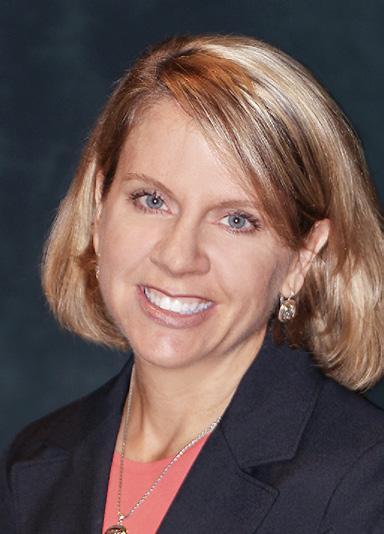
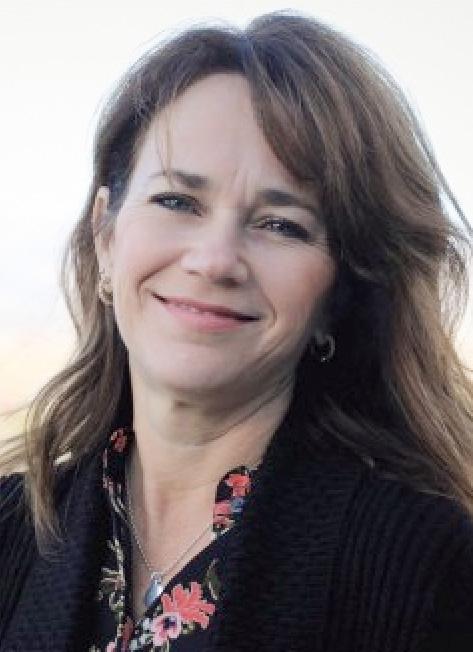
“While there may have been a few men I encountered who didn’t take me seriously,
for the most part, I was my own greatest obstacle,” she said. “I’m sure many will agree that self-doubt is sometimes the biggest hindrance in achieving success, and I sometimes questioned if I deserved a place at the table. The poultry industry is a huge component of the successful footprint that agriculture makes on our economy in Arkansas, and women often bring skills like creativity and the ability to multitask to the equation.”
Those skills add to the bottom line of the industry’s growth, she added.
“I wonder where our industry would be today if women 30 years ago had listened to the message of self-doubt.”
In the poultry game, the sense of team that permeates the industry has helped women acclimate to leadership positions. Lindsay Parker is senior sales manager for Novus, a global animal-nutrition solutions provider based in St. Louis, and works out of Fayetteville. She said opportunity outweighs any potential obstacles for women in the industry.


“While it is very male dominated, the women in this industry are respected,” she said. “There is a strong sense of family in this industry, and it allows us women to support each other. Many men are allies in propelling the success of women.”
And that includes women who launch a corporate career in the industry or their own poultry farms. Dara Martin started her own farm for Tyson Foods in 2019.
“I think there’s a misunderstanding that women either don’t farm, or that they aren’t as involved or educated in the process of farming,” she told the Tyson blog in 2021. “There are some absolutely amazing women in farming, some of the smartest and strongest women I know.”
Today, women can be found on the floor of processing plants, inside the chicken houses and in the executive offices of poultry producers.Holly Duval Kendra Waldbusser Jennifer Cook Lindsay Parker
Holly Duval admits she never saw the poultry industry on her career horizon, especially with no agricultural background and graduating from Arkansas State University with a degree in marketing.

“I have held jobs in sales, hospitality, product development and marketing, and never dreamed of the opportunities that are within the poultry industry,” she said. “It was through pursuing The Poultry Federation as a client that I found myself curious about the opportunity to dip my toe in the poultry industry. And here I am, eight years later.”
Eight years later, Duval has taken an advocacy group that existed under the national radar and helped elevate it into one of the most recognized association brands in the country — as she describes, a “flock like no other.”
And while it doesn’t hurt that Arkansas is one of the leading poultry states, TPF’s raised profile over the last decade means that industry giants like Tyson, Butterball and Pilgrim’s Pride pick up on the first ring.
“When I came on board, my role was to help TPF gain an audience across social media,” Duvall said. “They had a very small following, and I wanted to see them ranked amongst national organizations and brands. TPF also lacked brand recognition and materials to showcase the valuable work that is done across the three states that we manage.”
TPF is unique in that it doesn’t manage just a single state. But when Duval
joined the team, the organization had only a few hundred followers combined across all social platforms. Today, TPF’s Facebook, Twitter, LinkedIn and Instagram accounts have close to 35,000 followers. And all of TPF’s marketing and communications needs now are filled in-house, overseen by Duvall.
“The effort to grow our following and create an image that represents who TPF is was no small task, and it was all done without paying for any advertising,” Duvall said. “It is so important to know your audience from the inside out — that is the recipe to success and without it, we would still be small.”
Marvin Childers, the former Arkansas state representative who serves as president of TPF, has been impressed with Duvall’s ability to learn the industry and adapt on the fly when necessary.
“Holly consistently goes above and beyond in her work,” he said. “Her dedication and attention to detail are truly impressive. She has learned the poultry industry, our poultry companies and the hundreds of allied industry members, and manages to keep our members informed with newsletters, social media and direct communication.”
That attention to detail enabled her to implement processes that helped the
organization be more efficient, provide better membership benefits and create more revenue-producing programs. But raising TPF’s profile wasn’t her biggest challenge.
Telling the story of poultry, it turns out, starts with setting the record straight.
“We are constantly challenged with combating false narratives about the industry and misconceptions about animal welfare,” Duval said. “We do our best to consistently share the accomplishments of our members and showcase their work in their communities, but also highlight their accomplish-
ments in creating a safe and sustainable industry for the next generation. We also place a lot of value in making sure we are sharing facts and figures about the industry to help educate those who are following us on social media.”
And many of those facts and figures center around food safety. Duval stressed that the industry takes worker safety and food safety very seriously. After all, chicken has become a protein of choice for many Americans. Of the 150 million servings of chicken eaten daily on average in the U.S., virtually all of them are eaten safely.
Poultry companies have invested tens of millions of dollars in technology and other scientifically validated measures to enhance the safety of the protein, according to the National Chicken Council, and producers undergo continuous inspection and testing. Processing plants, by their very nature, can be messy. But Duval and her colleagues in the industry grow frustrated with any notion that
safety isn’t a top priority.
“I have seen this with my own eyes, and I wish that more individuals could see behind the curtain,” she said. “It is a hard environment to work in, but the individuals who do work in the processing plants take every step to ensure that the food is processed to the top standards. We see our members regularly receiving awards for meeting safety goals which we do our best to share across our social media channels to help stamp out any questions about our food being safe.”
Spreading that message may sometimes be challenging, but it’s also what motivates Duvall. She also takes pride in seeing TPF members succeed and grow their businesses and believes the organization could even take on more states one day.
“I see TPF as a conduit. We are here to connect others, and when you are able to provide a source for growth and business expansion, there is great reward in that. We are always leaning into who we can take next. Which state can we help that is
Pilgrim’s Pride executive Kendra Waldbusser lives in Colorado but spent some time in Northwest Arkansas back in the 2000s. And her first exposure to The Poultry Federation was at its Poultry Festival, then held in Hot Springs.
The event, which always includes a barbecue competition and an A-list concert, has become one for which industry insiders mark their calendars. This year, it was held June 9 and 10 in Rogers, with the strip connecting the Rogers Convention Center and the Walmart AMP concert venue transformed into the Vegas-themed “Fabulous Chicken Strip.”
Waldbusser said she hasn’t missed many festivals since that first one in Hot Springs.
“It is great fun and great competition,” Waldbusser said. “The donations for the scholarship auction are so generous now, and the bidding brings out the competition, too. The fun around the festival is allowing us all to get together socially and compete in golf, fishing, shooting, barbecuing and donating money, instead of competing in the marketplace. And then we dance the night away at an amazing concert.”
Holly Duval of The Poultry Federation attended her ninth festival this year. Since taking over TPF’s marketing and business development efforts eight years ago, she has elevated the organization’s national profile, and the festival has grown right along with it.

within reach? We are a small yet mighty team capable of big things, and it is exciting to be a part of that energy.”
Duval has experienced the natural ebb and flow that comes with almost a decade in an industry, and believes the industry has a bright future.
“It is ever evolving, constantly becoming better,” she said. “One thing that has always remained constant is the people that believe wholeheartedly in the industry. Those are the people that keep the industry spinning, and we need more individuals like them. Once you are in the industry, you never leave. You may see individuals go from a poultry company to an allied company and then back to a poultry company, or on to another allied company, but they never leave.
“I believe that is a strong testament to the deep roots that run through the industry. It is one big family, and I am proud that through all my experiences I ended up in a place I never dreamed I would be.”
“Looking back at my first festival to now, we have grown in so many ways,” she said. “From the activities that are offered to how we have structured our sponsorships, to how we plan out the agenda and even secure entertainment. I have only ever known the Rogers convention center and the Walmart AMP — I missed the Hot Springs days and when our festival was small enough to hold the concert in the grand ballroom of the convention center. The word is our festival is the best there is in the industry, and I think it is because we have maintained our focus on ensuring it is a celebration of the industry and the people who keep protein on the tables across the nation.”
 By Mark Carter
By Mark Carter
For Kendra Waldbusser of Pilgrim’s Pride, the story of poultry should be an easy sell.
And it is. More Americans than ever are eating chicken. In 2022, the combined value of production from the poultry industry — broilers, eggs, turkeys — hit $77 billion, according to the U.S. Department of Agriculture. That’s up 67 percent from the previous year.
Poultry is a great source of protein, not to mention a tasty one, and it’s no longer sought out solely for its heart-healthy benefits or by the parent on-the-go. From fine dining to fast food, it has permeated American culture. Chicken has joined the burger and pizza inside America’s fast-food pantheon; chicken strips are available at almost any college or pro sporting event.
The American public is sold on chicken. But there are those lingering perceptions that the industry doesn’t value food or worker safety. And that doesn’t sit well with Waldbusser, who grew up around chicken farmers in west Tennessee and knows better. As the global head for food safety and quality assurance at Pilgrim’s Pride, she takes such perceptions personally.
“Fewer and fewer consumers know how chickens are raised,” she said. “And it seems that with a void of information, misinformation comes more easily. The
industry needs more transparency, but I don’t think there is a reward for any integrator to go first in showing and telling how chickens are raised.”
Changing any such narrative starts from the inside, she said.
“Our greatest asset is our people. It should be a requirement that they must be safe. Our reputation as an industry can be changed the fastest by what our team members say when they are at home, at church or out in their communities.
“That feedback must be that they feel safe, that they would never be put in harm’s way and that they genuinely feel that if they bring up a safety concern, it is immediately addressed. Until every team member in our industry feels that way, we shouldn’t worry about what consumers think.”
Despite growing up on a farm with grandparents who ran a commercial layer operation and even taking poultry science classes at the University of Tennessee, Waldbusser never expected to see herself in the industry. And it has surprised her, from the diversity of opportunities available to the satisfaction of helping feed the world. But what truly stands
out for Waldbusser is her appreciation for what the industry represents.
“I was raised on a farm, and I learned at an early age to appreciate where my food comes from, especially when it is an animal that has given the ultimate sacrifice to feed my family,” she said. “That same love and respect doesn’t change when the number of animals processed every day increases either. My favorite aspect of my job is knowing that what I
do really does help feed the world with safe, wholesome protein.”
Marvin Childers, executive director of The Poultry Federation, considers Waldbusser a “go-to” when he’s looking for industry expertise.
“She is one of the most trusted experts in her field,” he said. “Kendra is a firm believer in transparency and promotes the idea that food safety is not proprietary and has shared food safety tips across the industry. She is the best not only at collecting data but using the data collected to improve and teach others how to improve in live production, processing and food safety.”
The industry will always place strong emphases on food and worker safety, but Waldbusser believes sustainability should be its next focus.
“The poultry industry is an incredibly efficient producer of protein, but we still have to recognize the impact our industry has on the environment,” she said. “Sustainability is what is on the horizon. We must drive efficiencies that provide returns for our shareholders, but improve our carbon footprint and reduce greenhouse gas emissions at the same time. It can be done, and it must be done.”
Waldbusser stresses that the industry also is challenged by the competition for workers and retaining those who are hired into management positions. Poultry has always been a great spot for unskilled labor, but workers have more options than ever these days, she noted.
“For our leadership, the industry must realize that management joining our ranks today don’t expect to retire from that role,” she said. “We must evolve so that we can retain our talent and remain an industry of choice. If we can’t retain them for their entire career, we must fundamentally change how we train and
grow our leadership.”
Waldbusser’s confidence in the industry’s future is secure. But it was jarring for her to see the scarcity of some items cause panic during the pandemic.
“For the first time in my lifetime, I saw people panic-buying chicken because they saw it as scarce,” she said. “I didn’t see the message change regarding food
Waldbusser said Pilgrim's Pride will always emphasize food and worker safety.
we operate. We work hard to contribute to the well-being of those communities by donating product, volunteering our time, supporting infrastructure projects, sponsoring events and teams, and of course, providing gainful employment opportunities.”
For Waldbusser, there’s never been a better time to be in the poultry industry.
safety. Consumers in the U.S. assume that the food they buy is safe. That is their expectation, and we must always deliver that.”
Another expectation is an industrywide commitment to the communities it serves.
“At Pilgrim’s, we value the important role we play in the communities where our team members live and work,” Waldbusser said. “We understand the responsibility that comes with being a large employer in often rural areas that

Within it, there are opportunities to grow, she said. And one can’t ask for much more than that.
When Waldbusser was named The Poultry Federation’s 2023 Industry Leader of the Year at the organization’s annual Poultry Festival in Rogers, it was Childers who handed her the award. And he thinks the industry is in good hands with leaders like Waldbusser at the helm.
He said, “Kendra exemplifies what it means to be a leader, an innovator and a compassionate advocate for change.”
Sustainability is what is on the horizon.



Business success is measured in many ways.
Arkansas Money & Politics asked its readers again this year to tell us which were the most admired companies in The Natural State. Using as criteria financial soundness, bold innovation, brand awareness, quality of product, outstanding people and social responsibility, they did just that in the 73 categories that follow.
We hold all businesses in high esteem, especially after the roller coaster ride of the last three years, and we tip our hat to those owners who managed to adapt, navigate and survive. But this particular year, readers told us who they admired most. And here they are. Enjoy the 2023 list of AMP’s Most Admired Companies, which follows a pair of Most Admired features.

Just a stone’s throw away from the Big Dam Bridge, nestled among the laboratories, consulting firms and suppliers that make up the North Shore Business Park, stands the headquarters of the largest privately-held HVAC, controls and service company in Arkansas.
With specialties covering everything from building automation and air distribution to equipment, parts and maintenance, Powers has made a name for itself as a trusted leader in the HVAC industry both statewide and regionally. Recognized by customers and peers alike, the company has won several industry awards.

Powers takes its name from the Powers Regulator Company, which began in 1891. Then predominantly a controls company, Powers of Arkansas got its start as an independent field office in 1985. In the decades since, the company has expanded to include Powers of Oklahoma, Powers of Louisiana and Powers of Mississippi, in addition to the Powers Mechanical Services Company and Powers Energy Service Company.
The Powers customer base runs the gamut, as the company provides solutions for building owners, engineers, architects and contractors of all stripes. That has resulted in over 10,000 projects installed and operating today across a variety of sectors,
from educational and government buildings to commercial and manufacturing facilities.

For Alan Hope, president and CEO of “the Powers that be,” all that growth is a byproduct of the company’s success, not the reason for it.
“We’re not trying to be a big company,” Hope said. “We’re just trying to serve our customers, and they’ve fueled that growth and fueled our expansion. It’s all about them.”
At the core of Powers’ business model is the phrase, “creating customers for life,” and it’s an ethos that every team member echoes and embodies.
Scott Smith, vice president of sales, said, “At Powers, we follow it from start to finish. It’s not really about the job; it’s about the relationship. I’ve got customers I’ve been dealing with for 30plus years. Our wives know each other, our kids know each other. You really don’t know anybody if you don’t know the names of their kids.”
In addition to its growing reach outside of Arkansas, the company also is widening its footprint in the northwest corner of the state, where the rapid pace of development has increased demand for services across the board. Powers currently is involved in the construction of a new, sprawling campus for a certain Bentonville-based retailer. As part of the massive undertaking, Powers’ building automation expertise will ensure precise control, down to the air quality in individual rooms, for any one of the 30 buildings slated to be built over the next few years.
But Powers can be found all over the state, with offices in Central and Northwest Arkansas, satellites in Jonesboro and Fordyce and staff covering every county in between. The health care industry, especially, has been a productive area for the company, as it works with both major hospitals and smaller health systems on expansions, modifications and upgrades. Powers works with a number of general and mechanical contractors to pull off projects like these, and every area of the company has a role to play in its success, from supplying products and equipment to installing and implementing controls systems.
Being a key player in so many ventures has put Powers in a unique — if busy — position, even while others were stuck at home, as Vice President of Controls Ron McCarty explained.
“When COVID came, we didn’t slow down a bit. We didn’t close the doors. We’ve grown immensely through that process and continued on,” McCarty said. “We needed to provide the air quality to all those systems and everything else, [for] all of our customers, so they could be open and meet the standards that
they were trying to set up [all] at one time.”
Another, more unexpected benefit that came about during the pandemic was the emphasis it put on effective communication across the company.
“We do a thing called C3: communicate, communicate, communicate,” McCarty said. “[Alan] sends out something every week, about three or four line items, and he’s recognizing the guys that are out in the field — ‘atta boys’ and stuff like that. But that’s constant; every week that’s coming out.”
And, like just about every other company in 2020, “We got into Zoom,” said with a laugh. “That is for sure.”
Of course, the aftershocks of the pandemic can be felt in less positive ways as well, especially alongside ongoing economic and labor concerns. When asked about industry challenges, Vice President of Mechanical Service David Squires immediately pointed to supply chain and manpower issues.
“It’s hard to find enough people to meet the customer’s needs as we grow, as they request more work from us. But the biggest thing, just to be honest right now, is getting equipment in a timely manner to deliver,” Squires said. “The industry consumer
hasn’t caught up to the fact that it takes a year to get something. Our team has done a good job of sourcing from anywhere we can to try to take care of the customer, but it’s still a challenge.”
In addition to pandemic-related setbacks, changing energy standards have further complicated the company’s calculus. With certain changes, like updated refrigerant standards, scheduled to go into effect at the beginning of next year, the pressure is on to meet the demands of customers and give building owners and engineers the information they need to plan upcoming projects.
On the supply front, Powers is investing in new and bigger warehouses to try and keep products in stock and more readily available. When it comes to workforce needs, however, the company has a few different approaches.
“There’s only so many workers, especially up in Northwest Arkansas, and you’ve got several other large construction [projects] going on in other states,” Smith said. “People are pulled to the job sites that are paying the most. You’ve got to have really good benefits; you’ve got to have a very cost-competitive offer to be able to hire the right people. It’s like everybody that’s in this business is already working.”
To combat this, McCarty added, Powers is taking advantage of in-house training and developing apprenticeships to recruit more people into the industry. But even when there are plenty of prospective new hires, the company won’t settle for just anyone. Applicants need to get joy out of problem-solving, Squires said, and need to be able to work effectively with the rest of the team.
“We are pretty judicious in interviewing people, because we don’t want turnover. We want to hire the right person, give them the tools and move forward,” Squires said.
In that way, Vice President of Continuous Improvement Adam Hope explained, the company’s culture creates not just customers for life, but employees for life as well.
“[We’re] trying to create a company people want to work for,” Adam said. “For the ones who are on board with our mission, vision, core values — we’re just trying to give them an opportunity here.”
Another way Powers creates that culture is by giving authority and responsibility to its frontline employees; those employees can do what’s best for the customer and the job, knowing they have the support of management behind them.
“I don’t put my thumb on the guys. Now, does that cost me a little bit of time? Probably. But if we give them the tools to be successful, and we have a culture where they’re happy to come to work — well, the customers will see that,” Squires said. “We’ve got 240 people that are going and contacting customers on a daily basis. It’s only prudent to make sure that they’ve got everything they need, and they’re happy to go out there and give the customer a good product.”
As CEO, Hope’s business philosophy is that if Powers can take care of its customers first, the money will flow. When mistakes happen, there are lessons to be learned that will ultimately benefit the client and the company – even if that means a few dollars lost on the front end.
“We always try to take advantage of those lessons that cost us money,” Hope said.
Looking towards the future, the Powers team isn’t in the business of fixing what’s not broken. They’ll take growth whenever and wherever it comes, but in the meantime, it’s all about continuing to do right by customers and making sure the next generation is ready to do the same.
“It’s organic growth, especially in Oklahoma. We have an office in Oklahoma, mechanical and controls over there, and that’s a startup group,” McCarty said. “That’s kind of how we’ve grown here. The customers have allowed us to grow because they know you do a great job. This person tells that person, that person tells that person — they find out about it.”
Hope added, “A lot of that focus is making sure we’re staying ahead of the curve for our customers and getting better internally so we can keep serving them better.”
Thanks to that solid foundation, Powers is poised to tackle any challenges as they come, even with the industry facing unprecedented changes in the coming years and decades.
“The world pivoted trying to mitigate COVID, and now, instead of mitigating pandemics, we’re switching to planning for pandemics. Anything in health care that gets built now is going to be focused on air quality, filtration, all these different technologies that are coming out,” Smith explained. “When you step back and think about what a cellphone looked like 20 years ago versus what it looks like today, building HVAC in 20 years from now is going to be — who knows what it’s going to be?”
Squires added, “We’re ready now. The infrastructure isn’t ready, but we’re ready.”
Powers is taking advantage of inhouse training and developing apprenticeships to recruit more people into the industry.
affordable, reliable health insurance … to keep you healthy and help you heal. We’re investing in your community to keep this diverse and wonderful state strong. And looking out for your physical, emotional and social health, connecting you with resources, and helping you navigate the healthcare system — so you and the ones you love can live your best life, your whole life long. Thank you, Arkansas, for the opportunity to take good care of you.








 By K.D. Reep
By K.D. Reep
Conway Regional Health System, established in 1921, is taking a unique approach to the health care professional shortage by establishing its own medical education program.
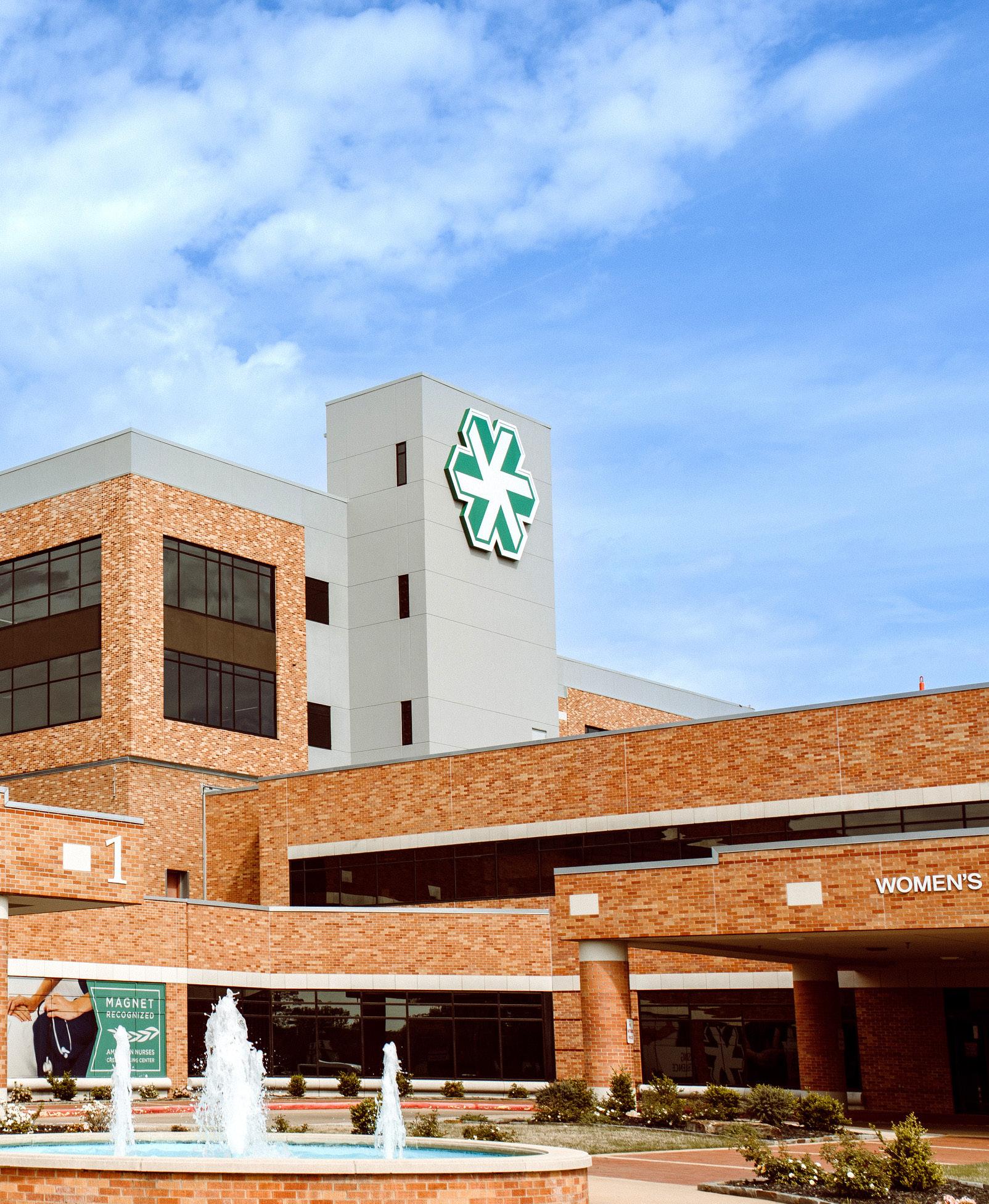
“Throughout the nation, there is a physician and provider shortage that is even more evident in Arkansas,” said Rebekah Fincher, chief administrative officer for Conway Regional. “We experience this each day in Central Arkansas and the River Valley, and at the same time, there is an aging primary-care physician population. With the emergence of two and soon-to-be three medical schools in addition to UAMS, graduating medical
students will need a residency program in Arkansas.”
Fincher explained that Conway, as the City of Colleges, has a successful history of training students from all areas of the health professions, and she believes this new program was a natural next step in finding health care professionals to fill the needs of today and tomorrow.
“It has taken years of hard work, planning, support and partnership, but Conway Regional has achieved institutional accreditation as a sponsoring institution for a graduate-medical education program through the Accreditation Council for Graduate Medical Education,” she said. “In January 2020, our family medicine program was approved as the first program for Conway Regional, and now, our graduate medical-education program is training a generation of physicians to be critical thinkers, compassionate providers, skilled clinicians and future leaders in medicine.”
In the family medicine program, residents learn to practice as effective members of Conway Regional’s health care system through a multidisciplinary, team-based approach to providing care in inpatient and ambulatory settings. This three-year program is housed at Conway Regional Medical Center, Conway Medical Group and Arkansas Children’s, and it has grown stronger with each new class of family practice residents.
“The first class will graduate in July,” Fincher said.
“We reached another milestone in June 2021 when the ACGME approved our internal-medicine residency program. The Conway Regional internal-medicine residency program encourages innovation while focusing on traditional internal medicine topics, including cardiology, pulmonology, nephrology, infectious disease, gastroenterology, hematology/oncology, rheumatology, endocrinology and geriatrics.”
In November 2021, Conway Regional received approval for its family medicine rural-training track residency program from the ACGME, and the first residents of the program will begin in July 2023, completing the first year of training at Conway Regional Medical Center before completing years two and three at Dardanelle Regional Medical Center. In addition to offering a family medicine curriculum, the program focuses on the unique health care needs of rural communities with the purpose of encouraging physicians to practice in those communities.
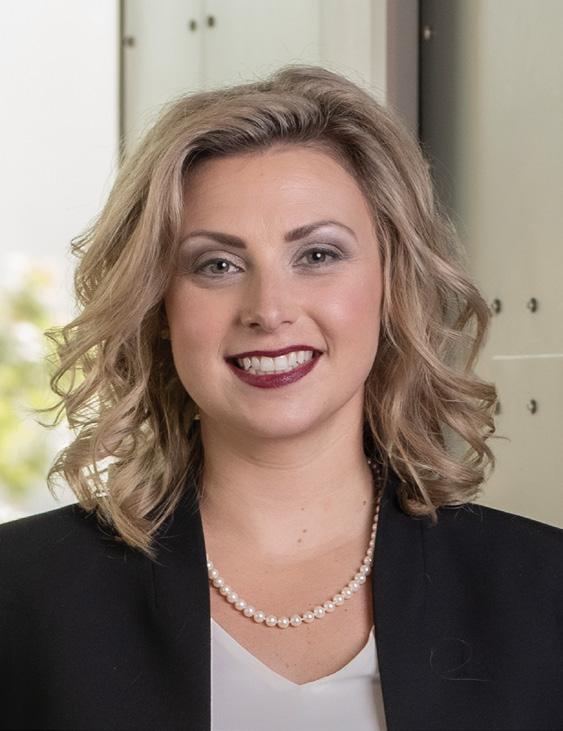
“Our goal is to provide more Arkansas medical students who graduate in our state, with the opportunity to match with an internal medicine residency in Arkansas,” said Fincher. “When all three programs are at full complement, there will be 33 resident physicians receiving their training in Central Arkansas and the River Valley through Conway Regional’s Graduate Medical Education Program. Our first class of family practice residents will graduate from the program in July, and of the class of four, three will stay in Central Arkansas to practice medicine and the fourth will pursue additional fellowship training.”
According to Conway Regional’s most recent annual report, the system has provided high-quality, compassionate health care services to the communities it serves for more than 100 years. What started in 1921 as a movement by local businesses to provide health care in the local community grew into a thriving health system centered on a 150-bed medical center.
Today, Conway Regional provides health care services to the growing communities of north central Arkansas and the River Valley, including Faulkner, Conway, Perry, Pope, Yell, Van Buren and Cleburne counties. Conway Regional offers comprehensive health care services such as cardiac care, orthopedics, cancer care, women’s health, gastroenterology, pain management and surgical services, and it is an economic force in the north central Arkansas community, totaling more than 225 physicians on the medical staff, more than 1,800 employees and 100 community volunteers.
Conway Regional’s approach to the health care shortage includes encouraging medical students to learn about the community and discover what a great place it is to live and as well as
make a difference.
“We hope many of our graduate-medical education program residents will choose to practice throughout Arkansas and help us create better access to care for all Arkansans,” Fincher said. “In turn, this means our communities will have more excellent options for primary care closer to home. This will be a tremendous benefit for our community. In addition to having a new graduate-medical education program, our health system provides scholarships to students pursuing a health care degree. In May, we provided 23 scholarships to students in medicine, nursing, therapy and other medical education programs.
“The Conway Regional Health Foundation funds those scholarships through generous donations from physicians, staff and the community. We also have medical immersion programs for high school students, residency opportunities for nursing students, and scholarship partnerships with area educators. We have a great team focused on encouraging young people to pursue health care as a profession.”
Fincher says the future of health care at Conway Regional is promising, and more initiatives such as these residency programs will allow for more growth in both the areas the system serves and the kind of health care it provides. In May 2023, Conway Regional completed its $10 million Growing Together Capital Campaign, which supported health care improvements such as expanded access, recruiting specialists to north-central Arkansas, funding the expansion of its clinical laboratory, opening a new behavioral health unit and supporting the graduate education program.
The campaign also completed a 24-bed intensive care unit with capacity for future expansion as needed.
“Conway Regional is committed to the communities we serve. Each day, we strive to be a leader in health care and bring high value at a low cost to Arkansans,” Fincher said. “Certainly, the last few years of health care are some we never imagined, but for more than 100 years, Conway Regional has evolved as the needs of our communities have evolved. As we look to a post-pandemic era, we will continue to strive to create access to care and keep high-quality health care local. We are focused on continuing to improve the health care that is provided to our community.”
“Conway Regional is committed to the communities we serve. Each day, we strive to be a leader in health care and bring high value at a low cost to Arkansans.”
Conway Regional has been the community’s hospital for more than 100 years, providing high-quality, compassionate care. As our communities grow, we are growing alongside you to ensure all of your healthcare needs are met right here in Conway. When your family needs medical care, you can trust our board-certified providers to provide you with the comprehensive care you deserve when you need it most.


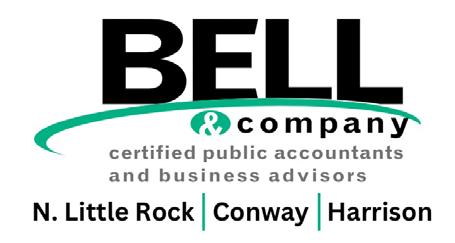
Established in 1981 by Richard and Lee Bell, Bell & Company is a full-service public accounting firm with locations in North Little Rock and Conway. As a trusted adviser, Bell & Company has provided local small businesses and individuals tax, consulting and attest services for more than 36 years. With over 40 full-time professionals and a combined 300 years of experience, no challenge is too great for the Bell team. The firm also specializes in the trucking industry, as well as estates and trusts. It has the resources, experience and depth of knowledge to deliver the services clients need professionally and efficiently in an everchanging tax and financial reporting compliance environment. The company supports numerous local organizations, with several team members serving on boards and volunteering their time, in addition to financial contributions.
longest-tenured client partnerships in the industry, attract the region’s top talent and win countless coveted awards for their work in creative, advertising, and public relations. Most importantly, Stone Ward is known for its ability to get results for its highly valued clients across diverse sectors.
and distinctive buildings. Founded in the 1880s, Cromwell celebrated its 135th anniversary in 2020. The firm has expanded nationally and internationally and continues to be a major force in the practice of architecture and engineering.

Riceland is the world’s largest rice miller and marketer and one of the mid-South’s most prominent soybean processors. Generations of Riceland farmers have planted and harvested the rice that has made the company the industry leader it is today. Riceland works closely with its 5,500 farmer-members in Arkansas and Missouri to continue cultivating the best quality of rice. On average, Riceland’s 1,500 employees prepare and market more than 125 million bushels (2.5 million metric tons) of grain. Riceland products are shipped and sold under the Riceland label, private labels, as ingredients, and in bulk. The brand is sold across the country and to more than 75 locations outside of the United States.
Blackmon Auctions, based in Little Rock, is a third-generation family business founded in 1938. Led by Thomas Blackmon, who took over from his father, Tom Blackmon Sr., the firm conducts auctions of all sizes throughout the United States. In the past 24 months, it has conducted more than 150 auctions in more than 25 states — as close to home as its own auction complex in Little Rock and as far away as Wyoming, Florida, New York, California, Ohio, Louisiana, Kansas, Texas, Tennessee, Missouri, Alabama, Mississippi, Georgia and Oklahoma. Although Blackmon Auctions has grown into one of the largest equipment auction companies in the country, it still specializes in one-owner, on-site auctions, regardless of size.

Stone Ward is a marketing company of people who are a creative force for good — building partnerships, people, ideas and community from their home cities of Little Rock and Chicago. The Stone Ward team shares a passion for creativity and a strategic focus on helping good companies succeed. And for almost four decades, the Stone Ward team has made a positive difference locally and globally through its philanthropy of volunteer time and treasure. Stone Ward’s “Building Good” philosophy focuses on servant leadership, builds lasting trust with their clients, and believes in the potential of every team member, client and idea. It’s the driving force behind everything they do, and it’s helped them forge some of the


Cromwell Architects Engineers is a fullservice architecture, engineering, and building services firm. Cromwell works collaboratively with clients to create bold, unique, versatile, sustainable design solutions. The company offers a full range of building services to see projects from initial planning and concept design all the way through construction and into occupancy. The firm’s mission is to create inspiring, high-performance buildings for diverse clients to enhance the global community. A talented team of architects, engineers and facility managers and energy services personnel deliver projects and solutions to meet a variety of client needs, all while creating beautiful
A third-generation business, familyowned in Little Rock since 1967, Parker Automotive Group is the only exclusive Cadillac, Lexus and Audi dealer in the state of Arkansas. The Parker Auto Group consists of Audi Little Rock, Parker Cadillac, Parker Lexus and Parker Automotive Restoration. The sales staff at each location has many years of experience and is dedicated to meeting the needs of their customers. Parker Auto’s dealerships


have won numerous awards and continually rank among the best in both sales and service.
a safe and secure financial position. The bank also prides itself on accessibility, as clients can reach most bankers on their cell phone at any time, day or night.
assistance. The study found that communities which needed brick-and-mortar financial institutions the most had the least. People Trust is committed to working towards the goal of making sure that everyone, regardless of race, gender or financial status, has a bank that they can call home.
Signature Bank of Arkansas was established in 2005 by a team of well-respected and experienced local bankers. That team’s vision was a bank where decisions were made locally and in the best interests of not only the bank, but customers and team members as well. Signature Bank offers a wide range of loan and deposit products and services. Deposits are FDIC insured to at least $250,000. In addition, the advisers at Signature Private Wealth Management offer investment, trust and estate planning services to fit all client needs. The bank’s executive management team and Board of Directors are committed to keeping Signature Bank in


People Trust Community Federal Credit Union is a nonprofit community development financial institution located in Little Rock. The bank is the first Blackowned bank in Arkansas that has seen significant expansions this year in order to provide important financial services to underserved communities. In 2017, People Trust Community Federal Credit Union conducted a study to see which communities needed the most financial
The Stitt Group believes that energy independence and a clean, healthy environment begin at home. The company’s team of home energy, design and construction professionals help clients build truly custom, environmentally responsible homes to fit their lifestyles and core values. Founded by Orlo and Mary Stitt, who began building energy-efficient homes in the 1970s, the Stitt Group has been a pioneer in the use of improved building materials, best building practices and common-sense strategies for new














We listen carefully, thoughtfully analyze how our processes, services and technologies impact your experience, and customize solutions to meet your supply chain needs. It’s more than just knowing your business — it’s about developing true connections, so when you need help with a problem, you know just who to call.










construction. Relying on experience, building science and collaboration with clients and local builders, the company has earned multiple national awards while contributing to a cleaner, healthier and more sustainable world.
branched out to provide services to a broad range of customers, from corporations to private individuals. Rx Catering specializes in catering hospital facilities, private and office parties, professional and corporate functions, weddings and receptions.

and more than 40 graduate programs. Committed to its metropolitan research university mission, UA Little Rock is a driving force in Little Rock’s thriving cultural community and a major component of the city and state’s growing profile as a regional leader in research, technology, economic development and job creation.
Located just 40 minutes from Little Rock, Pine Bluff’s Saracen Casino Resort is home to an 80,000 square-foot gaming area complete with over 1,800 slot machines, 40 table games, sportsbook and Arkansas’ only live poker room. Saracen’s statewide sports betting app, BetSaracen, takes about 2/3 of all sports betting wagers made in Arkansas. Dining options include four on-site restaurants, including the award-winning Red Oak, boasting premier cuts of Kobe beef alongside Arkansas-grown ingredients. When phase two of Saracen’s construction is finished — a 400,000 square foot addition — the project will put the Quapaw investment in Arkansas at more than half a billion dollars, including more than 300 hotel rooms and an event/concert center that can seat 1,600 people.

The Conway Area Chamber of Commerce has been the voice of business in Conway for more than 130 years. Economic development, government affairs, education and community vision are the foundation of its success and the core of its mission. With more than 1,600 members, the Chamber offers businesses an unmatched opportunity to engage with Arkansas’ best economy. The Chamber is the voice of economic growth in Faulkner County, facilitating a constant conversation with its members, the public and those seeking to do business in the area.
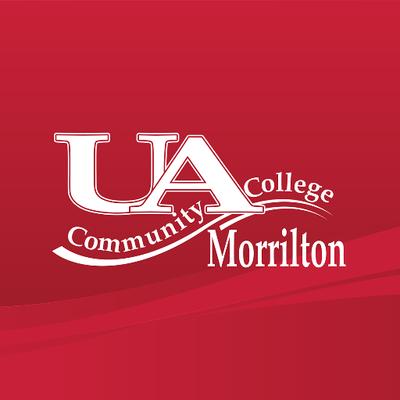

Rx Catering is a professional catering company that has been serving the Little Rock area for over two decades, providing delicious meals for meetings, conferences and more. The creators and owners of Rx Catering have over 60 years of catering experience, and the company prides itself on professionalism, punctuality and service. Rx Catering can cater events of any size in Little Rock and the surrounding areas. Originally focused on the medical field, Rx Catering has
The University of Arkansas at Little Rock is a metropolitan research university that provides an accessible, quality education through flexible learning and unparalleled internship opportunities. UA Little Rock prepares its more than 9,000 students to be innovators and responsible leaders in their fields. Alongside engaging and rigorous professors, coursework at UA Little Rock blends critical thinking with real-world experience, providing a springboard for internships and later careers in such in-demand fields as nursing, engineering, data quality, criminal justice and education. The university offers more than 60 undergraduate programs
The University of Arkansas Community College at Morrilton is a two-year college within the University of Arkansas System that offers a comprehensive curriculum of university-transfer and career-specific training programs, as well as adult education, concurrent education and training, as well as non-credit workforce training programs. The college has served west-central Arkansas since 1963 and has an enrollment of approximately 2,000 credit students per semester. UACCM’s skilled training programs offer certificate of proficiency, technical certificate and associate degree options to accommodate students with a variety of career goals. The Associate of Arts and Associate of Science degree programs allow students to complete the first two years of a bachelor’s degree before transferring to a four-year university.
First Orion, one of the fastest-growing telecommunications companies in the country, provides industry-leading branded communication and communication-protection solutions to mobile carriers and businesses. The company is headquartered in North Little Rock and has offices in Seattle, London and Dubai. Its branded communication solutions,


INFORM® and ENGAGE®, empower consumers to connect over a branded and verified call and are used by hundreds of companies worldwide. In addition, First Orion’s Communication Protection suite offers scam, fraud and spoof protection solutions to hundreds of millions of consumers and processes through more than 100 billion calls annually for T-Mobile, Metro by T-Mobile and Boost Mobile Networks. First Orion is a multiyear certified Great Place to Work and maintains a 4.7-star Glassdoor rating.
general contracting and construction management. Headquartered in Little Rock, the company also has had offices in Dallas-Fort Worth since 2010, as well as in Northwest Arkansas since 2015. It has a proven history of successful commercial, corporate, cultural, educational, health care, hospitality, mid- and highrise condominiums, industrial and retail construction projects. Focusing on the future, Clark Contractors is always looking for ways that technology on projects can be implemented, such as with drone and BIM projects. While the company was not formed until 2009, Clark Contractors is proud of the family-like bond it has created and has camaraderie that is reflected through an average tenure of 22 years in its management team, as many workers have been working with each other longer that the company has existed.
The Winthrop Rockefeller Institute is a nonprofit organization which lives out its mission of continuing Winthrop Rockefeller’s collaborative approach to creating transformational change through a combination of place, people and process. Located on Winthrop Rockefeller’s former cattle farm on Petit Jean Mountain, the Winthrop Rockefeller Institute is a proud supporting organization of the University of Arkansas System. In 2005, the Winthrop Rockefeller Charitable Trust, with the UA system, established the Winthrop Rockefeller Institute and has supported the operations and programmatic activity. The Governor Winthrop Rockefeller Endowment, managed by UA Foundation, ensures the institute’s work will continue. With The Rockefeller Ethic in mind, Winthrop Rockefeller Institute utilizes collaborative problem solving, respectful dialogue and diversity of opinion to host programs, workshops and conferences.


Visit Bentonville is Bentonville’s convention and visitors bureau, eager to make sure that visitors to the city in and out of state are able to see Bentonville’s treasures and make the most of their trip. Visit Bentonville’s goal is to share its enthusiasm and experiences with others in the community and the hospitality field. Visit Bentonville’s strategy is to create an environment that fosters tourism growth and encourages new dollars for Bentonville businesses. Under the almost 20year leadership of Kalene Griffith, Visit Bentonville has worked hard to make the city a world-class travel destination.
leading the industry of cosmetic surgery for more than 20 years as a triple-board certified cosmetic surgeon. With years of extensive study in medicine and continued education, Yee founded her practice on the principles of artistry and innovation, offering full-body surgical and nonsurgical procedures. Yee performs treatments ranging from advanced laser therapy to comprehensive “mommy makeovers,” priding herself and her practice on the ability to help patients feel comfortable in their decision to undergo any procedure. Yee offers a variety of options such as Botox, dermal fillers and laser treatments as well as nonsurgical options for weight loss and clear skin. As the first surgeon in Arkansas to offer QWO Cellulite treatment, BTL Emsella and NeoGraft, Yee has long been an innovative force in Little Rock’s cosmetic surgery community.
Founded by William Clark in 2009, Clark Contractors provides full-service

Dr. Suzanne Yee is one of Little Rock’s leading cosmetic surgeons. With passion and artistic sensibilities, Yee has been


Arkansas Federal Credit Union has been making a difference in the lives of employees, members and the communities it serves since 1956. With more than $1.5 billion in total assets and more than 300 employees, Arkansas Federal is the largest credit union in Arkansas. As a not-forprofit financial institution, Arkansas Federal invests profits back into benefits for members through higher dividends and lower loan rates. Both consumers and businesses entrust the credit union to get competitive rates and reduced fees on accounts and loans. Founded in Jacksonville but now based in Little Rock, Arkansas Federal has 18 branches throughout Arkansas that serve more than 120,000 members.
Formerly known as The Computer Hut, Pinnacle IT has been a leading Man-













aged Service Provider (MSP), serving Central Arkansas and surrounding areas for more than 30 years. Led by CEO Chris Bates, Pinnacle IT has deep capabilities in handling the cyber and data security challenges all companies face, with a special emphasis on the needs of health care organizations in maintaining HIPAA compliance. Headquartered in Little Rock, Pinnacle IT has more than 35 IT professionals with offices across The Natural State, capable of offering 24/7 help desk support and system health monitoring. Pinnacle IT’s service area stretches from Texarkana to Jonesboro, with services ranging from IT management, email spam and protection and cybersecurity, to data backup and recovery, cloud services and server support.

As a family-owned distributor of quality cleaning products, Myers Supply appreciates the challenges its customers face on a daily basis. The company is constantly adding innovative product systems supported by a professional sales team and outstanding training materials to ensure customers’ success. The experienced chemical and technical staff at Myers Supply is always finding new ways to make cleaning and sanitation easier and safer. With vast resources and facilities in Hot Springs and Little Rock, Myers Supply is in a position to supply Central Arkansas with the finest facility products at competitive prices. Since 1955, the success of Myers Supply has been the direct result of its philosophy of developing and nurturing long-term business partnerships.

Metro Disaster Specialists is a proven leader in all disaster situations, with a long history of professional approach and practical knowledge applied as an essential source for both property owners and insurance professionals. Based in North Little Rock, Metro Disaster Specialists is a licensed disaster general contractor providing 24-hour emergency service response to their clients. Metro specializes in providing rapid and reliable services, handling virtually any circumstance to secure clients’ property and contents against further damage. Metro has a proven portfolio of more than 20,000 completed projects and 275 years of combined restoration and reconstruction experience. Metro continues to constantly invest in its team by striving to uphold the industry’s top certifications and training. With two certified restorers on staff, Metro is qualified to handle a loss of any size. As a proud member of the Restoration Industry Association, Metro is an advocate for best industry practices.

For more than 35 years, Gary Houston Electric Co. has served Central Arkansas with affordable, quality and timely commercial-and-residential electrical contracting services with a strong emphasis on customer service. Constantly looking for opportunities to serve new customers, its areas of expertise include homes, retail spaces, restaurants, offices and warehouses, among others. The company services both new construction and existing structures needing electrical repair or being remodeled. The majority of its work comes from repeat customers, whose relationships the company strives to build and maintain. In addition to commercial and residential electrical services, Gary Houston offers facility maintenance and emergency electrical services.
Founded in 1999, Travel Nurse Across America was put in motion by people who believed they could change the health care traveler industry for the better. With a culture of honesty, transparency and customer service, TNAA has continued to grow in its four values: owning your relationships, simplifying the process, obsessing over the experience and defending the culture. TNAA is one of the fastest-growing health care staffing firms in the country and has partnered with hospitals across the United States to provide the most-qualified nursing and allied talent. Focused on procuring and placing skilled travelers has created tangible results for partners, with lower readmits, better HCAHPS scores and more. TNAA has a 70 percent retention rate, translating to a greater continuity of care.

Crafton Tull is a civil engineering, surveying, architecture, landscape architecture and planning firm with more than 300 employees working across Arkansas and Oklahoma. Crafton Tull’s dedication to client service began in 1963 with founding partners Bob Crafton and Lem Tull. After eight years with the Arkansas Highway and Transportation Department, Crafton and Tull set out to build their own firm. As a direct result of the firm’s commitment to its clients, Crafton Tull quickly experienced growth, adding new office locations and expanding its service offerings. Jim Tull joined the company his father, Lem, co-founded in 1993 and eventually rose to the position of CFO. In 1998, Bob’s son, Matt Crafton, transitioned from his civil engineering




role in the U.S. Air Force to the Air Force Reserve and joined Crafton Tull. Matt eventually rose to the position of COO before the Crafton Tull board of directors appointed him to the position of CEO in 2009. For more than 50 years, Crafton Tull has sought to improve communities through design, planning and surveying. That mission is carried out through the firm’s work still today across a wide variety of project types and services.
Builders team of experienced financial advisers works with clients every step of the way to identify and achieve financial goals.
With more than 50 years in the industry, the organization prides itself in offering custom financial advice to help clients achieve their goals. Services include investment management, retirement planning, tax planning, estate planning and more, and the team at Aspire Wealth Builders tailors solutions to each individual client.
Clubs aim to provide members with the greatest number of options, the highest quality equipment and the most knowledgeable staff in Central Arkansas. The Athletic Clubs offer a variety of activities and amenities to keep members engaged and further their goal of improving members’ lives through health and fitness.


Snyder Environmental has the qualified workforce, equipment and programs necessary to manage asbestos, leadbased paint, mold and decontamination projects from start to finish in the most feasible and cost-efficient manner. Snyder Environmental has completed more than 3,000 abatement, remediation and decontamination projects across various business sectors and structures. In addition to state-of-the-art environmental abatement and remediation services, it offers interior demo, dust control, cost estimates and complete project solutions. With locations in Arkansas, Tennessee, Missouri and Oklahoma, Snyder Environmental offers remediation services to residents everywhere they are located. Other services Snyder Environmental offers include duct cleaning, decontamination, underground storage tank services and environmental consulting.
Based in Little Rock, Smiley Technologies Inc. is a core and digital provider for community banks. The firm was founded in 2002 to serve a need for better software and superior service. Smiley’s mission is to be a trusted provider of security, innovative banking solutions and exceptional customer service to its valued partner banks. Smiley’s core banking platform is a vertically integrated solution, allowing bankers better access to information, simple business processes and a more secure product. With high-touch customer service and continuous innovation, the Smiley team understands core banking and how to provide value to community banks.

Since 1886, Tipton & Hurst has been committed to fulfilling its promise of “guaranteed satisfaction” with every flower, plant, event and gift it delivers. Founded by Joseph B. Hurst and David Tipton, the company is now run by Joseph’s grandson, Howard, who assumed the role of president from his father, Joe, in 1984. Consistently voted Arkansas’ best florist, this family-owned and -operated business has blossomed from a floral shop in downtown Little Rock to a full-scale, specialty retailer boasting an award-winning team and vast resources, including a wholesale warehouse and a network of premier suppliers around the world. Tipton & Hurst continues to lead the market, with locations in Little Rock, North Little Rock, Conway and Pine Bluff.



Aspire Wealth Builders is committed to providing clients with personalized and comprehensive financial planning solutions. Whether a client is just starting out on a financial journey or looking to make strategic investments, the Aspire Wealth
The Athletic Clubs consist of the Little Rock Athletic Club, the Little Rock Racquet Club, the North Little Rock Athletic Club and the Downtown Athletic Club. Since its founding, the group of fitness centers has been devoted to coupling the greatest people with the greatest resources. Each of the Athletic Clubs’ locations continually invests in improving its facilities, and each is maintained and staffed by fun, friendly people. The Athletic
As Arkansas’ oldest and largest health insurer, Arkansas Blue Cross and Blue Shield has been helping improve the health, financial security and peace of mind of the people of Arkansas for almost 75 years. The company and its family of affiliates are leaders in health insurance innovation and provide a full spectrum of health- and dental-coverage plans for individuals and groups. The company employs more than 3,200 people in multiple locations throughout Arkansas. The company serves nearly
Presbyterian Village offers everything from independent living, residential care, skilled nursing and rehabilitation. Our residents enjoy delicious southern style meals daily, along with a full social activity calendar, beautiful outdoor courtyards and transportation when needed.

And Vista at the Village is our new unit designed to serve those with Alzheimer’s Disease or other memory related disorders.
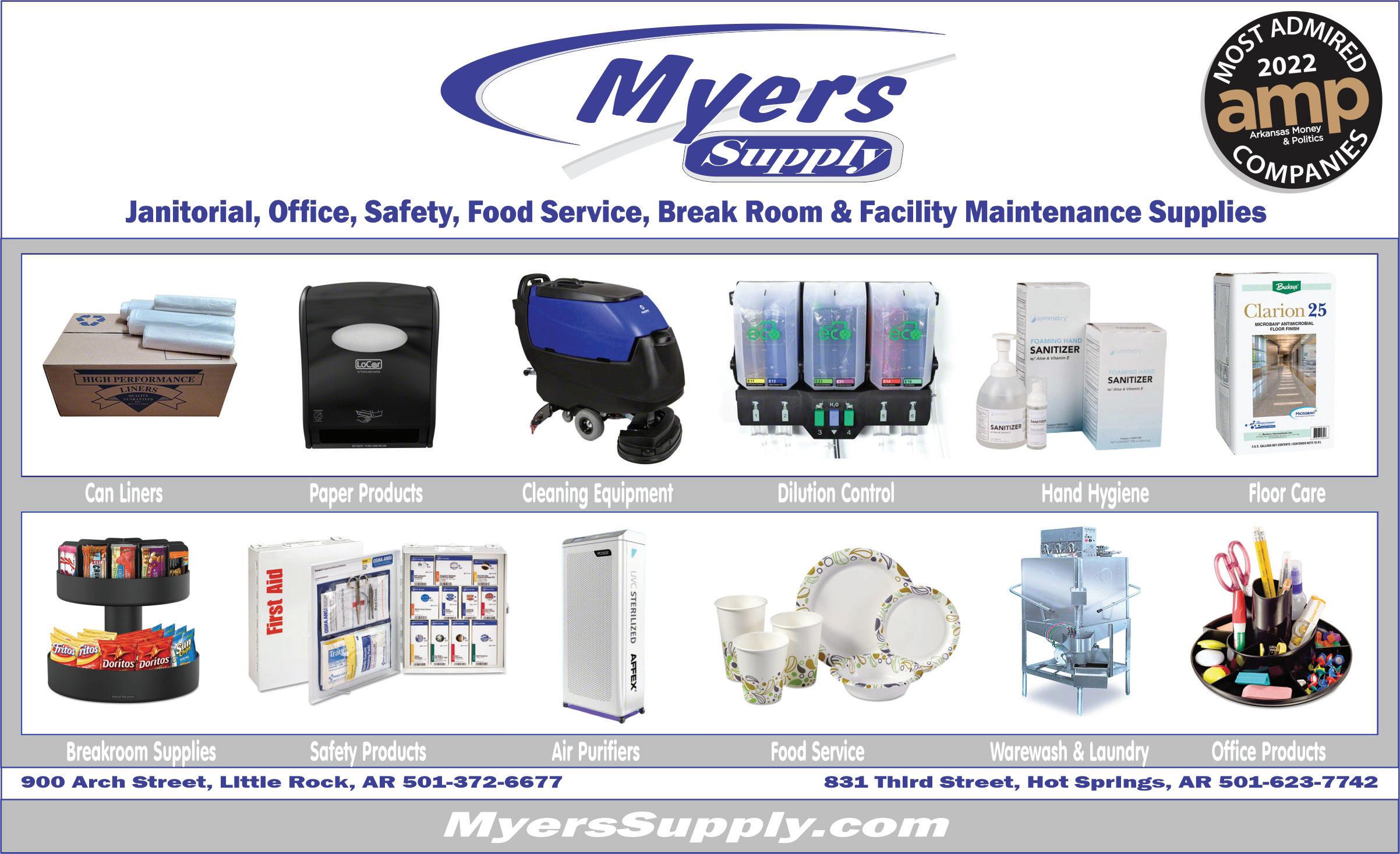
800,000 people in Arkansas and another 1.2 million through national accounts. As a private, not-for-profit, mutual health insurance company, Arkansas Blue Cross is owned by its policyholders. It invests in communities statewide, looking out for the physical and emotional health of Arkansans, connecting them with resources and helping them navigate the healthcare system — so they can live their best life, their whole life long.

From humble beginnings more than 100 years ago to the healing ministry it is today, Baptist Health’s purpose has remained the same — to create a healthier community through Christian compassion and innovative services. Baptist Health is Arkansas’ most comprehensive health care organization with more than 250 points of access that include 11 hospitals, urgent care centers, a senior living community, more than 100 primary and specialty care clinics, a college with studies in nursing and allied health, a graduate residency program and access to virtual care anytime, anywhere. It is also the largest private not-for-profit health care organization based in Arkansas, providing care through the support of approximately 11,000 employees, groundbreaking treatments, renowned physicians and community outreach programs. At Baptist Health, care of the whole person — body, mind and spirit — is an expression of Christian faith.
staff. As a result, Conway Regional’s patient experience, employee and physician engagement scores in the Press Ganey survey soared into the 95th percentile in 2020. Conway Regional has been recognized nationally, statewide and locally throughout Cleburne, Conway, Faulkner, Perry, Pope, Van Buren and Yell counties as a “Best Place to Work.”
An icon of Central Arkansas, the Capital Hotel has been considered the “front porch” of Little Rock for more than 145 years. Since its debut in 1876, the Capital Hotel has served as business and political hub for the metropolitan city, attracting politicians, CEOs and celebrities alike.
A series of renovations and restoration projects, completed in 2007, have allowed the Capital Hotel to maintain its historic character and charm without compromising its comfort and luxury.
The hotel has earned a reputation as one of the South’s most elegant hotels. The staff at the Capital Hotel is dedicated to the personal attention of guests and their visitors through warm and personal greetings, conveying to all who enter the Southern charm and warm hospitality that the capital city has to offer.
education facilities, hospitals, medical facilities, government buildings, commercial buildings, critical environments and manufacturing and industry. Powers has more than 10,000 projects installed and operating.
Conway Regional Health System demonstrates the value that it places on the community by empowering a medical staff of more than 200 physicians and an employee staff of 1,500 in crucial decision-making that impacts patients every day. These crucial stakeholders are energized through an accountable clinical management model for physicians and a patient care governing congress for the


Headquartered in North Little Rock, Powers serves as the largest privately held building HVAC, controls and service company in the state. With approximately 300 employees, including more than 200 installation and service technicians, Powers offers a wide range of building HVAC systems technologies. With offices in North Little Rock and Springdale and satellites in Jonesboro and Fordyce, Powers has staff located throughout the state, covering every county. Powers also has regional offices in Oklahoma, Mississippi and Louisiana. Serving more than 500 customers, Powers provides HVAC services to K-12 education facilities, higher
Since 1999, the staff at Elder Independence Home Care in Bryant has been committed to the dignity of the elderly. Elder Independence provides high-quality, client-centered and affordable homecare services to clients to assist clients in leading dignified and independent lives in the comfort and safety of their own homes. Their individual needs are carefully assessed, understood, and met through the selective assignment of qualified, trustworthy and compassionate caregivers. One of the greatest strengths of Elder Independence is that it is not a franchise company. Its attitude can be described as, “Your family is our family.” The staff at Elder Independence Home Care is honored when a client or loved one chooses Elder Independence to be their provider of choice. One of Elder Independence’s goals is to be able to provide client-centered and affordable home care throughout Arkansas. Respect, integrity and compassion are the core values of Elder Independence, which takes great pride in showing genuine care and concern for each person they meet.
Brown & Brown Inc. is the fifth-largest independent insurance brokerage in the nation, providing risk management solu-




























tions to help protect what their customers value most. Brown & Brown’s four business segments — retail, national programs, wholesale brokerage and services — offer insurance products and services to businesses, corporations, governmental institutions, professional organizations, trade associations, families and individuals. The Brown & Brown culture is built on integrity, innovation, superior capabilities and discipline. Its team members look at insurance differently and use their experience, carrier relationships and principled customer focus to deliver superior service and solutions. With more than 80 years of proven success, Brown & Brown is one of the industry’s most powerful and influential leaders. Founded in Daytona Beach, Florida, in 1939, Brown & Brown is a true success story and a testament to its vision and core values. Brown & Brown has locations in Little Rock and Northwest Arkansas.



Sunstar Insurance of Arkansas is part of a large, independent agency group serving Arkansas, Tennessee, Missouri, Kansas, Alabama and Georgia. Acquiring the property and casualty business from Simmons First Insurance in 2017, Sunstar Insurance of Arkansas includes Henry Jordan of Helena. The business formerly known as Town and Country Insurance Agency in Jonesboro was acquired in January of 2018 from Stephens Insurance, and Sunstart Insurance of Arkansas added Matson Agency the same year. That was followed by adding the Todd Agency in 2019 and David Todd and Madonna Lee to the management team. Most recently, Mark Miller Insurance of Paragould and Tom Tull Insurance of Jonesboro joined the group in 2021. Sunstar Insurance of Arkansas CEO, Andrew Meadors, is a 34year industry veteran and a Certified Risk Manager, focusing on all fields of business and commercial insurance.
Edafio’s focus on “powering IT through people” has made it the largest Arkansasbased managed services provider operating one of the region’s most extensive groups of IT engineers. Edafio’s origin, ownership,and engineers are all Arkansas-based. They support more than 200 mid-level to enterprise clients across health care, financial services, nonprofit, manufacturing, government and transportation. Their unique approach to diagnosing and managing network problems through a business-oriented assessment has helped them become a valued partner across multiple businesses in Arkansas. A hallmark of Edafio is its commitment to employing experienced, senior-level engineers with deep experience and industry knowledge. Edafio employs a large experienced local team of highly qualified engineers and analysts whose sophisticated technological expertise ensures that clients’ networks remain stable, efficient and safe.
McDaniel Wolff PLLC is a law firm based in Little Rock, serving private individuals and businesses of all sizes throughout Arkansas. The firm’s premier team of attorneys has an established history of distinction in representing the individuals, businesses make up the industries and regional economies of Arkansas by providing a full range of litigation, corporate and transactional service areas. McDaniel Wolff’s clients include some of America’s largest social media and technology companies, health care organizations, manufacturers, real estate developers, trucking and logistics companies, multistate retailers, securities institutions, counties and municipalities, school districts, as well as corporations engaged in highly regulated industries such as tobacco, medical cannabis and casino gaming. With decades of experience, the firm has the knowledge and experience necessary to offer its clients the highest caliber of legal services.
Dave Hughes opened Jan-Pro of Arkansas in 2005, the same year his son, Nolen, was a senior in high school. Nolen worked in the business during its first few years, learning how to clean and eventually becoming a floor care technician, in addition to taking care of various customer needs. After graduating from the University of Central Arkansas, Nolen started his own venture with College Hunks Hauling Junk and Moving. He owned the business for nine years before eventually selling it in 2018. For customers tired of commercial cleaning vendors who are long on promises but short on performance, Jan-Pro is the solution.
Lockheed Martin’s Camden Operations facility is a manufacturing, final assembly, test and storage operation for Lockheed Martin Missiles and Fire Control (MFC) programs. Located in the Highland Industrial Park in East Camden, it occupies a combined floor space of nearly 2 million square feet spread over more than 2,000 acres of land. More than 1,000 employees work in the facility’s manufacturing and support buildings. Established in 1978 as the home of the Multiple Launch Rocket System (MLRS) production programs, Camden Operations is Lockheed Martin’s Precision Fires operations center of excellence. It continues to produce the MLRS launcher and family of munitions, which includes the Guided MLRS Unitary Rocket. It is home to the Tactical Missile Sys-








tem (TACMS) missile and the High Mobility Artillery Rocket System (HIMARS) launcher, which fires both MLRS rockets and TACMS missiles. The PAC-3 Missile Segment Enhancement (MSE), the world’s most advanced air defense missile, and the Terminal High Altitude Area Defense (THAAD) Weapon System also are manufactured here.
to families and friends, physicians prefer for their patients, purchasers select for their clients, employees are proud of and investors seek for long-term results. The BridgeWay’s campus stretches across 18 acres and has grown from a capacity of 66 to 127. Despite its place as one of the largest psychiatric hospitals in the state, each patient receives individualized care in small, comfortable settings.
OrthoArkansas provides specialized care for specific orthopedic needs and serves as a primary orthopedic care provider. Offering expert care across the state for all orthopedic injuries, aches and pains, OrthoArkansas currently has 10 locations in Little Rock, North Little Rock, Arkadelphia, Bryant, Conway, Camden, Clinton, Heber Springs, Hot Springs and Monticello. Offering fellowship-trained physicians, OrthoArkansas has a team that uses the latest advances in medicine, rehabilitation and surgical and nonsurgical options. No matter what stage of injury or recovery, OrthoArkansas has its patients covered with urgent care offered in both Little Rock and North Little Rock.


sion director Steve Wilson, the Arkansas Game and Fish Foundation is a nonprofit organization for people passionate about promoting hunting, fishing and conservation education for Arkansas youth. The foundation is known as a leader in the state for supporting the acquisition of property for hunting and fishing opportunities, as well as creating and supporting conservation education. As a partner with the Arkansas Game and Fish Commission, AGFF provides creative opportunities to develop young Arkansans’ interests in fishing and hunting, plus informing and educating the public on a variety of issues important to the future of hunting, fishing and wildlife conservation.

Founded in 1983 in North Little Rock, The BridgeWay Hospital is the only freestanding psychiatric hospital in Arkansas with programs for acute mental health, serious mental health and substance use disorder treatment for adults and behavioral health care for adolescents and children. The BridgeWay’s team of mental health professionals includes board-certified psychiatrists, master’slevel clinical therapists and nurses and mental health associates. The mission of The BridgeWay is to provide health care services that patients recommend
First Horizon’s story began in 1864 when Ohio businessman Frank S. Davis arrived in Memphis to open the city’s first national bank. Davis saw a genuine need for banking and credit to finance rebuilding and new commercial growth. Davis’ foresight led him to found First National Bank of Memphis, which has evolved into the First Horizon Bank seen today. First Horizon has grown into The Natural State as well, with locations in Bentonville, Bryant, Fayetteville, Jonesboro, Little Rock, Newport, North Little Rock, Pocahontas and Walnut Ridge. Today, the Arkansas subsidiary of First Horizon Bank has helped Arkansans across the state with personal banking, owning a small business, wealth management and mortgage lending. When it comes to making big decisions in your life, First Horizon has a reputation for helping Arkansans take the first step.

Presbyterian Village is owned and operated by a nonprofit organization, Presbyterian Village Inc., and is sponsored by 11 Presbyterian churches in the greater Little Rock metropolitan area. Presbyterian Village has provided more than 50 years of housing and services to the community. Its mission is to provide comprehensive continuing care for older adults that promotes health, comfort, security and spiritual well-being in a living environment that fosters personal dignity and independence. From independent living to skilled nursing and rehabilitation and everything in-between, Presbyterian Village strives to offer a healthy, secure and joyful environment for all residents.

Created in 1982 through the efforts of former Arkansas Game and Fish Commis-
WER Architects was founded in 1978 and believes that quality architecture lends to creating better places to learn, live, heal and work. With a team of architects and interior designers, WER Architects





believes all projects should be beautiful, purposeful, efficient, durable, belong to their surroundings and elevate the human spirit. Noted for its tradition of architectural excellence, WER Architects has a commitment to academic and scientific institutions, corporate and cultural institutions and celebrates its achievements in historic preservation. As one of the largest firms in Arkansas, WER continues with its commitment in creating projects that consider individual needs and combine form and function in order to create powerful architecture. Recognized for refined structures, WER creates architecture that is well-suited to its context. With offices in downtown Little Rock and Northwest Arkansas, WER offers full architectural services for new construction, renovation and rehabilitation, existing building analysis and utilization plans, historic preservation and structure reports, interior design and furniture selection, programming, space planning, site selection and evaluation, feasibility studies, cost estimates, master planning and Way Finding design.
manufacturers and suppliers. Serving large and small businesses, Pettus Office Products sells a wide range of products at great prices.

with E. Ritter and Company, which also operates Ritter Agribusiness and Ritter Investment Holdings.
Established in 1989 by Lynn and Amanda Pettus, Pettus Office Products set out with a main goal to create a family-run business offering products, exceptional value and remarkable customer service. Growing into the largest independent office supply dealer in Arkansas, Pettus Office Products retains the core principles it was founded on, promising that once customers buy from Pettus, they will never need to try another office supply company again. With dedicated, professional sales and furniture design teams, Pettus Office Products offers custom, tailored furniture sets for the office. As a member of Trimega, an office-products buying group, Pettus Office Products has buying power of more than $10 billion, allowing it to source bargains directly from major

Complete Payroll of Little Rock began as Combined Financial Services, founded by Guy Dillahunty in 1992. When he retired in October of 2000, the company was purchased by Betty Jo King, who continued to grow the company with the same principles on which it was founded. Eventually, the company became Complete Payroll Services and moved forward by adding services such as online payroll, web-based time-keeping administration, biometric time clocks, pay cards and more. Staying on top of technological advancements in the industry, Complete Payroll is proud to offer the very best from HR services to 401(k) management.


Ritter Communications is a leader among local independent communications providers, offering business, residential and wholesale customers advanced internet, phone, video and cloud services. Invested heavily in the communities it serves, Ritter Communications has deployed proven, best-in-class infrastructure and technology while coupling it with a world-class customer focused experience. Founded in 1906 and headquartered in Jonesboro, Ritter Communications is committed to growing and evolving to meet the demands of today’s ever-connected world. Grain Management LLC, a leading investor in the communications sector, is the majority owner of the company in partnership
The Arkansas Trucking Association promotes the health of the Arkansas trucking industry on issues that directly impact member companies and our state and national economies. Shannon Newton, who has been behind the wheel of the ATA since 2014, has worked hard to make sure the association works like a well-oiled machine. The ATA is owned and governed by more than 300 trucking companies and important industry suppliers. Members range from firms with five or fewer trucks to some of the nation’s largest freight and logistics companies. The ATA’s mission is to advance the trucking industry’s image, efficiency, competitiveness and profitability. ATA’s comprehensive range of services, products and member benefits are designed to help members compete and succeed. The association was started in 1932 as the Shippers and Carriers Association of Arkansas. Ninety years later, the association is still around promoting and supporting the trucking industry and all the ways it has flourished in the state.
Merger & Acquisition Specialists is a team of experienced business brokers and M&A agents working across industries with businesses of all shapes and sizes. The team prides itself on finding


solutions to meet client’s needs and secure their financial futures. Whether it is merging a publicly traded company with a privately owned company or finding the right owner-operator for the Main Street business, their professionals will help you and work to find solutions.
The business brokers and M&A agents comprises professionals from diverse backgrounds, but all are experts in the process of buying and selling businesses. They work across the spectrum of disciplines and with several professionals, from CPAs to lawyers, bankers, investors, business owners, entrepreneurs and executives of companies big and small. As a brokerage company, they have decades of experience and have completed hundreds of deals. Their focus is on finding solutions to meet the needs and goals of our clients; their mission is to get the deal done to the client’s satisfaction; and their passion is helping people and companies take that next step in life and business.
promotional items, or even laser die cutting, Arkansas Graphics is here to serve

The Natural State. Arkansas Graphics was founded in 1974 by Dale Wilcox, father of current President and CEO Kevin Wilcox. Wilcox started off as a janitor at the company in high school and worked in different departments throughout college before starting full-time in 1990. Wilcox took full ownership of Arkansas Graphics in 2013.
limited to) education, economic development, banking, tourism, hospitality, health care and more. The agency also supplies photography and video services to a variety of clients, including Visit Hot Springs. Since 2016, SixtyOne Celsius has helped to secure $75 million in community improvement projects for the City of Hot Springs and Garland County through ballot initiative campaign consulting. From highway infrastructure projects that will improve transportation throughout the county to expanded museum facilities, plus a state-of-the-art baseball complex, the firm partnered with community leaders and local advocates on ballot issue campaigns that seek to improve the quality of life for both residents and visitors.In 2022, SixtyOne Celsius became a certified Minority and Women-Owned Business Enterprise through the Arkansas Economic Development Commission.
Arkansas Graphics provides a vast range of products and services, from graphic design to printed forms, marketing materials and annual reports. Founded in 1974, the success of Arkansas Graphics is the result of hard work, perseverance and commitment to excellence. These core values drive the company today and will continue to drive it in the future. As one of the top offset and digital commercial printers in the region, Arkansas Graphics continues to expand its offerings to include digital storefronts, variable data printing, laser die cutting, UV Coating, promotional products and large format graphics and signage. Arkansas Graphics is more than just a printing company, offering many solutions to enable customers to communicate effectively. Whether it is traditional litho printing, new digital variable printing, web-based communication, large display graphics, branded
Westrock Coffee Company is a leading integrated coffee, tea, flavors, extracts and ingredients solutions provider in the U.S. It provides sourcing, supply chain management, product development, roasting, packaging and distribution services across a variety of industries. Known as the “brand behind the brands,” Westrock supports a number of blue-chip customers’ evolving needs on a global scale. Westrock strives to be the world’s most competitive provider of beverage solutions to the most distinguished brands in order to provide smallholder farmers and their families in developing countries the ability to advance their quality of life and economic well-being. Westrock has offices in 10 countries and sources coffee and tea from 35 origin countries.

An award-winning, full-stack creative communications agency, SixtyOne Celsius proudly partners with businesses, nonprofits and organizations that span a variety of industries, including (but not

Kelley Commercial Partners is Arkansas’ premier commercial real-estate firm. It maintains an award-winning team of trusted, skilled professionals who are experienced advisers in office, retail, investment, industrial and leasing. The company remains laser-focused on serving clients and delivering superior commercial real-estate services, providing the highest level of customer satisfaction through communication and accountability to produce optimal results. With more than 37 years of management experience, the team members at Kelley Commercial Partners is committed to managing property as if they themselves owned it, performing on-site visits at your property on a frequent basis to speak with tenants and monitor the property’s condition, enabling them to maximize your property’s value. In addition to property and development management, Kelley Commercial Partners offers a range of consulting services for retail business development, government consulting, debt restructuring and broker price opinions.




Lile Real Estate was founded in February of 1993 by Gar Lile, a licensed real estate broker in Arkansas, Louisiana, Mississippi, Tennessee and Texas; an Accredited Land Consultant (ALC); and an Arkansas state Certified General Appraiser. With a team of sportsmen, outdoorsmen and farmers, Lile Real Estate has the firsthand knowledge and experience needed to understand what Arkansans are looking for in a land agent. The company has sold $350 million worth of real estate in the last five years and $650 worth of real estate in the last decade, including recent successes like a combined $7.2 million sale on two adjacent duck hunting properties in early 2023. Lile Real Estate offers a full range of services for clients: sales and marketing, sealed bids, consulting, acquisitions, exchanges, property development and research and market analysis. From social media to traditional advertising, the company uses every marketing avenue available to connect clients with the properties, buyers, or investors for which they’re looking.

at the helm, and her original guiding philosophy has never changed: The Golden Rule. The company remains locally and family-owned and proudly independent. With 37 agents and a support staff of 11, The Janet Jones Company thrives in its family-like environment. Culture is its strongest asset, where team members support each other’s efforts, share ideas openly and collaborate to provide clients with their signature “legendary service” across Central Arkansas. Well-trained and experienced agents at The Janet Jones Company are renowned as the best of the best and consistently rank among the top producers in Arkansas.
Rock landmark, the name and menu dwelled in Greenville, Mississippi. George Eldridge, east Arkansas restaurateur and hobby pilot, periodically flew friends and clients to Doe’s Eat Place in Greenville for the legendary food, but he soon decided it would be easier to bring Doe’s to Arkansas. After acquiring the rights to the name and menu, Eldridge opened Little Rock’s location of the humble steakhouse on the corner of Ringo and West Markham in 1988. After years of local success, the Little Rock Doe’s Eat Place gained national recognition during the 1992 presidential election campaign when Bill Clinton and staff made the restaurant a frequent hangout spot. Doe’s has since been a regular stop for athletes, race car drivers, entertainers and other professionals. Under the ownership of Eldridge’s daughter, Katherine Eldridge, Doe’s Eat Place has maintained that original Doe’s spirit.
Jennifer and Daniel Menden opened Menco in 2007 and have continued to grow their team. Menco Construction is not just a team of home builders; it is hands on in many aspects and fully aware of the requirements of building. Daniel is on site daily and jumps in to help his subcontractors if needed. Jennifer custom draws each floor plan and has a serious eye for detail. They are heavily involved in their local Home Builders Association, with Daniel as president 2020. Jennifer serves as a board member for the Better Business Bureau along with other community volunteer opportunities. The Menco motto is to always learn and grow. Daniel has exemplified this by becoming a Certified Aging in Place Specialist. The management team includes Ryan, project coordinator and Deanna, office assistant, along with more than 100 subcontractors.


Over the years, The Janet Jones Company has consistently ranked as the top real estate agency in Central Arkansas, both in the dollar volume of homes sold and residential market share. Janet Jones, who founded the company in 1980, continues

Before Doe’s Eat Place became a Little
Founded in 2007, Entegrity started as a consulting firm, focusing on building sustainability, building performance and energy efficiency. By the early 2010’s, several key technologies started to advance, giving Entegrity the opportunity to combine existing energy-engineering expertise with construction and implementation experience to assist clients with turn-key energy projects. Entegrity joined forces with Nabholz, a construction and facility maintenance company with more than 70 years of experience, bringing a new business model to market with wide-ranging expertise in sustainability, building performance and energy efficiency. Uniquely qualified in delivering innovative and sustainable solutions to optimize building performance, Entegrity helps clients realize long-term operational savings by focusing on all of their needs — selecting the most cost-effective scope, contract structure, financing strategy and tying it all together with a performance-based guarantee.

UACCM OFFERS:
§ Relevant, high-wage career and technical programs

§ Associate degrees that comprise the first two years of a bachelor’s degree
§ Short-term, customized workforce training classes
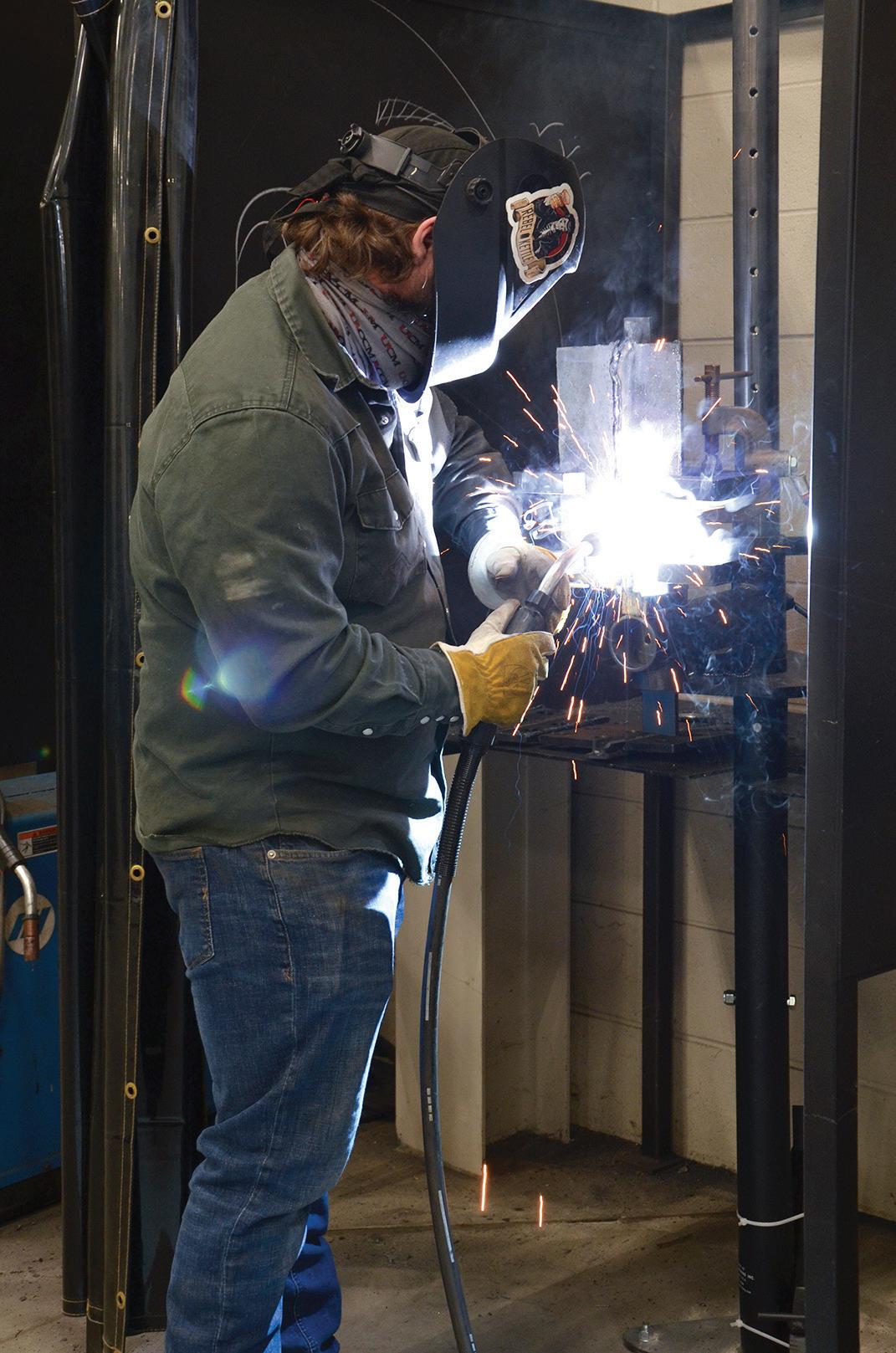
§ A robust concurrent student program that allows high school students to earn college credits or fast track into a career


State-of-the art equipment, technology, and labs
Tuition rate that provides an excellent value WWW.UACCM.EDU

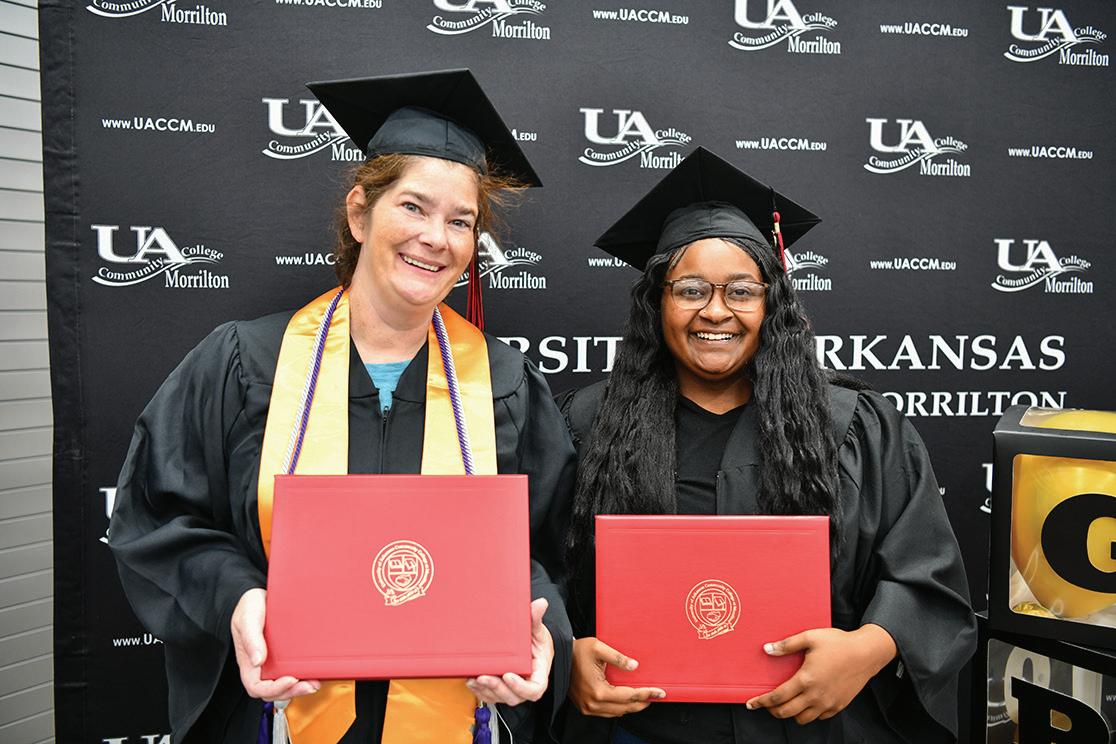
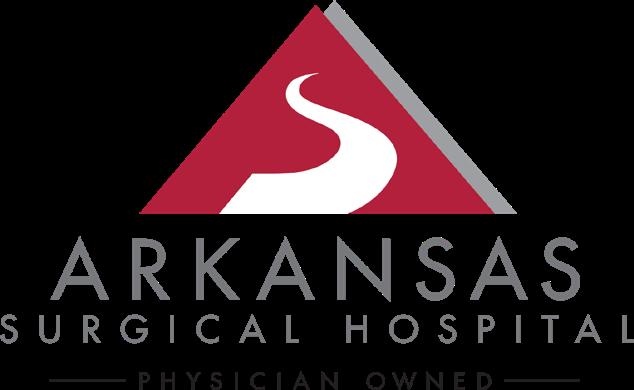
A leader in orthopedic and spine surgery, the Arkansas Surgical Hospital is widely recognized for its achievements and has been ranked within the top 5 percent of health care providers in the nation by Press Ganey for four years running. The hospital was also recently named by Arkansas Blue Cross Blue Shield as a Blue Distinction Center+ for Spine Surgery and Knee and Hip Replacement by demonstrating expertise resulting in fewer patient complications and readmissions compared to other facilities. Dedication to quality outcomes and patient safety have shown results, with an infection rate of less than 0.3 percent as compared to national average of 3 percent; staffing designed to allow nurses more time with their patients; hourly rounding by members of the clinical care team; and an entirely Advanced Cardiac Life Support (ACLS)-certified nursing staff. Its facility features 41 private patient suites, each of which includes a separate space for a patient’s loved ones to rest while the patient recovers, 13 state-of-the-art operating rooms and the River Trail Grille Restaurant.
of running for office is filing monthly and quarterly reports to the FEC. Raise The Money has streamlined this process: Every time a donor makes a contribution, data is uploaded to a spreadsheet that can be downloaded at any time for candidates to file financial reporters. Raise The Money is built by candidates for candidates, so they are not only knowledgeable but also committed to serving your campaign endeavors.
Raise The Money is a Little Rock-based startup designed to process online payments for contributions to political campaigns, PACs and committees. Raise The Money serves the United States, New Zealand, United Kingdom, Australia and Canada, and can also process contributions for nonprofits and social causes in the U.S. The team at Raise The Money realized that one of the most tedious tasks

First National Title Company is an independent, locally owned-and-operated company serving Arkansas. First National Title has put together a complete team of experts in the title industry. Its services are professional, efficient and customized to clients’ needs. First National Title was formed in June of 1997 and has since grown from two to roughly 250 employees in 26 locations across the state. The company’s experienced team of closers and title examiners close realestate transactions promptly, professionally and accurately. First National Title closes both residential and commercial real estate transactions as well as loan refinancing transactions. Additional services include the provision of title insurance through both owner and mortgagee policies, providing title search and examination services for all real estate transactions and providing services for both 1031 and reverse 1031 tax exchanges.
help keep the global supply chain moving, fueled by the simple notion of finding a way to get the job done, no matter what. The company celebrates its 100th anniversary this year, having started in 1923 as a local Arkansas freight hauler. Through organic growth, strategic acquisitions, visionary leadership and a mindset focused on the future, Arcbest has developed from those humble beginnings into a publicly traded, $5 billion logistics powerhouse. Yet since its beginning, the heart of the company’s mission has remained: to connect and positively impact the world through solving logistics challenges. With more than 15,000 employees across nearly 250 campuses and service centers, ArcBest serves as a trusted adviser to some of the world’s biggest and most recognizable brands, creating smart logistics solutions that make it easier to do business. By thoughtfully analyzing real-time industry data and listening to customers, ArcBest implements transformative logistics solutions that save money, drive growth and get the job done.
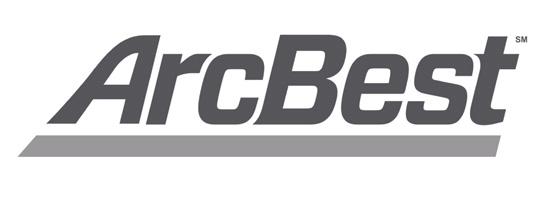
ArcBest is a multibillion-dollar integrated logistics company that leverages a full suite of shipping and logistics solutions to meet its customers’ needs and


For generations, the knowledgeable team at Simmons Bank Wealth Management has been a premier provider of trust, investment management and fiduciary services. For more than 117 years, Simmons Bank has been trusted for what matters. Its wealth professionals have deep industry experience and are ready to provide personalized solutions to help you build and manage your wealth, provide for your family and protect your legacy.
Simmons puts its clients at the center of everything they do. With a full array of resources backed by expert advisers and portfolio managers, they are here to help simplify your financial decision-making, so you can address your needs for today and realize your dreams for tomorrow. With a disciplined approach to asset allocation that carefully addresses your goals for stability and growth, Simmons can help implement a personalized strategy


















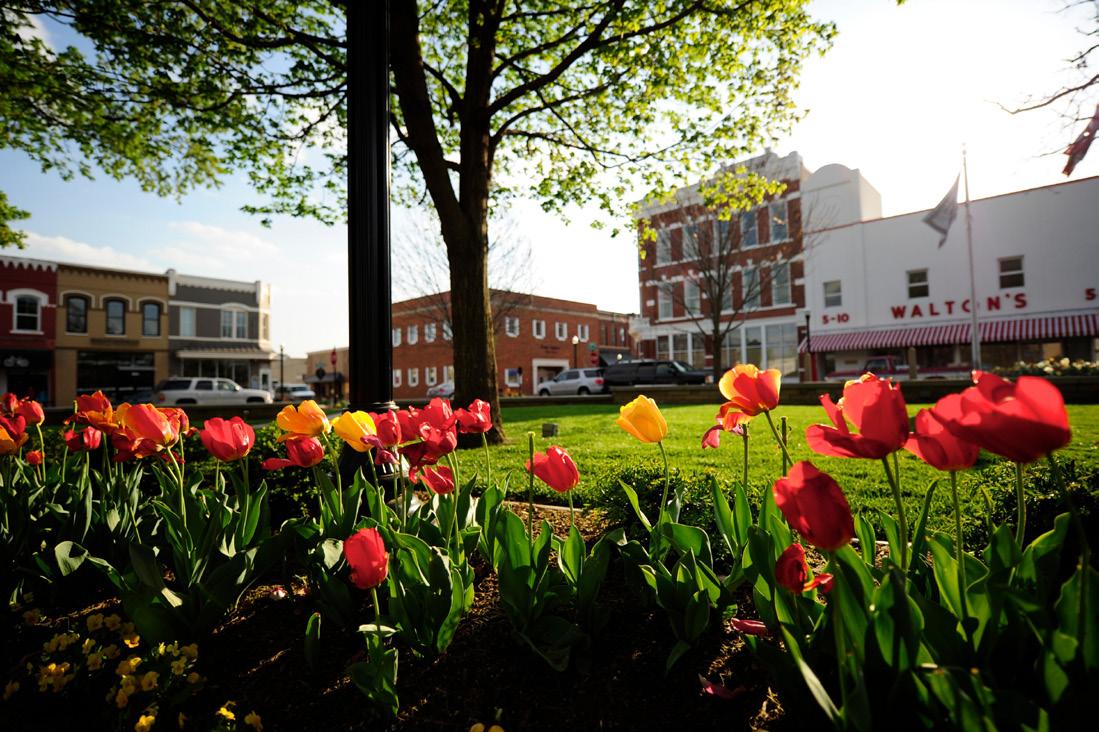



to bring your financial goals within reach and create a long-term plan to support your loved ones’ financial security.
residential and commercial customers as well as to support economic development through reliable energy solutions.

Entergy Arkansas is a division of the Entergy Corporation, an integrated energy company engaged in electric power production, transmission and retail distribution operations. Entergy delivers electricity to 3 million utility customers in Arkansas, Louisiana, Mississippi and Texas, in addition to owning and operating one of the cleanest large-scale U.S. power-generating fleets as well as nuclear power options. Entergy has annual revenues of $10 billion and more than 13,000 employees. Entergy strives to create sustainable value for customers, employees, communities and owners. That concentrated focus drives the way Entergy thinks as an organization, allowing the company to effectively navigate through numerous transitions, both revolutionary and evolutionary, and still deliver on its commitments to its stakeholders.


Summit Utilities Inc. is the natural gas provider for the state of Arkansas. The Little Rock firm purchased assets from CenterPoint Energy in a 2022 deal worth $2.1 billion. The acquisition covered customers in Arkansas, Oklahoma and Texarkana, Texas. Summit now serves 525,000 customers and operates 17,000 miles of gas main pipeline across three states. Its mission is to provide cleanburning, safe and reliable service to
Serving one in every six Arkansans, Central Arkansas Water and its more than 300 employees provide water service to almost 500,000 customers across eight counties. Direct service boundaries include the communities of Little Rock, North Little Rock, Alexander, Brushy Island Public Water Authority, Cammack Village, College Station, Maumelle, Paron, Sherwood, Wrightsville, 145th Street Water and Sewer Improvement District and unincorporated Pulaski County. Central Arkansas Water also provides treated water supply for the cities of Shannon Hills and Bryant in Saline Country, as well as Ridgefield Estates Public Facilities Board. It also provides supplemental supply to Cabot, Salem, Sardis, North Pulaski Water Works Association, Woodland Hills and Jacksonville, whose service area includes the Little Rock Air Force Base. CAW has been named a Leading Utility of the World, which is the gold standard for utility performance. CAW has also been recognized as top five best drinking water in North America by the American Water Works Association.
Little Rock strives to gain an in-depth understanding of all facets of clients’ financial, tax and planning life – including estate plans, corporate and entity structure (if relevant), income tax considerations as well as investment and insurance portfolios. The in-house team at Legacy Capital includes a variety of professionals with different areas of expertise — attorneys, 4 CFPs, 2 CFAs, ,an LLM in tax and an FALU, as well as investment professionals and insurance experts. Instead of one person trying to meet every need, the professionals at Legacy Capital function as a team, which ensures that each member serves in their area of highest competence. Having a team mentality, the firm also values clients’ other trusted professionals, including accountants, lawyers, trust officers and other family members. Legacy believes that everyone typically sees things from a different perspective and working together as a team delivers better results for clients.
With offices in Little Rock and northwest Arkansas, the team at Legacy Capital in

WELSCO Inc. was founded as Welder’s Supply Company in 1941 by R.G. Harrison (with the backing of his father, Claude G. Harrison) after he returned to Arkansas from serving in World War II. The first retail location was opened in Little Rock. Ultimately, R.G. Harrison turned the leadership of the company over to his sons, Stephen E. and Richard G. Harrison, and that leadership continued through the 1970s and ‘80s. Today, the company proudly remains familyowned and led by Angela E. Harrison, the granddaughter of R.G. Harrison, who serves as owner and CEO. Today, WELSCO has 16 locations, including 14 retail stores throughout Arkansas and in Tulsa. WELSCO is the largest independent welding supply and industrial gas distributor in the world owned and operated by a woman. With a strong team of experienced professionals and a particular focus on customer service, WELSCO is poised to continue its growth and expansion into new markets both now and in future generations.


Dr. Suzanne Yee is one of the Natural State’s most accomplished cosmetic surgeons. Dr. Yee graduated from the University of Arkansas for Medical Sciences and was ranked 1st in her graduating class. She completed her surgery internship at the University of Arkansas for Medical Sciences and her facial plastics and reconstructive surgery fellowship at the University of Texas at Houston. Dr. Yee has been serving the state of Arkansas through her medical skills and fashion sensibilities at her cosmetic and laser surgery center since 2003. Congratulations to Dr. Suzanne Yee for being named AY About You’s Best Cosmetic Surgeon in Best Of 2023!


“I love Dr. Yee and her incredible staff! After getting back in the gym regularly, I still had some stubborn fat areas, so I did CoolSculpting at Dr. Yee’s office and love my results!”
 - Heather Baker, President/Publisher AY Media Group
- Heather Baker, President/Publisher AY Media Group

In late December, Southland Casino Hotel celebrated the culmination of a $320 million expansion that included a new 300-room, 20-story hotel; a 113,000-square-foot gaming floor with 2,400 slot machines and 50 live table games; six new restaurants and new bars and entertainment venues. Besides providing what it bills as the best Las Vegas-style casino offerings in the region, Southland Casino Hotel has given a major boost to the local economy by adding 500 new jobs since 2019. That brings the total workforce to 1,500.

Southland President and General Manager Osi Imomoh said the company has become the employer of choice in the region.
“There were businesses in the area that were laying people off, and we were hiring and providing people in this area an opportunity to go back to work,” Imomoh said. “All non-tip positions start at $15 an hour or more. Tip positions start at $10 per hour or more. We made commitments early to meet the wage gap to be able to attract people to work with us.”
Delaware North has operated Southland for decades and owns and operates 10 other gaming facilities. As Southland transitioned into casino gaming, revenues kept growing, Imomoh said. The decision was made that West Memphis was a great spot for a game-changing expansion.
“That decision is a tribute to this being the crossroads of the South, a place where three states come together,” Imomoh said. “There are great opportunities to be a regional presence in this market. There is not a bad view from any room in our truly world-class, new hotel facility that looks out over the Memphis skyline. The Dragon Link and Buffalo slot machines are two of the most popular games, and this is the premier facility in the South for those products.
“Of course, there are exceptional restaurants here. Delaware North has a long tradition of fantastic restaurant experiences in its facilities across the globe. From the steakhouse to the finest buffet you could ever imagine, there is great food for anyone who comes in the door at Southland. Whether you are a foodie or just want a cocktail, we have a great facility to visit.”
One advantage for employees is the opportunities for advancement both at Southland and at other Delaware North
By Becky Gillettecompanies. Imomoh is an example of that. He started at Southland 16 years ago, transferred to work in a Delaware North facility in West Virginia and then one in Illinois before coming back to Southland a year ago.
“There are a lot of opportunities throughout the organization,” Imomoh said. “And this is only phase one of the Southland expansion. This first expansion is an exciting time for us. Over the next few years, we see opportunities ahead. We sit on 99 acres of land. We have the new structure, the old structure
and a ton of land to grow a lot of diverse offerings. Imagining what this will be like 10 to 15 years down the line, the possibilities are endless.”
The expansion that took three years to complete also provided major employment during construction.
The present-day product would have been hard to imagine 16 years ago when Southland began the transformation from the greyhound racetrack popular for decades into casino gaming with the addition of 750 gaming machines.
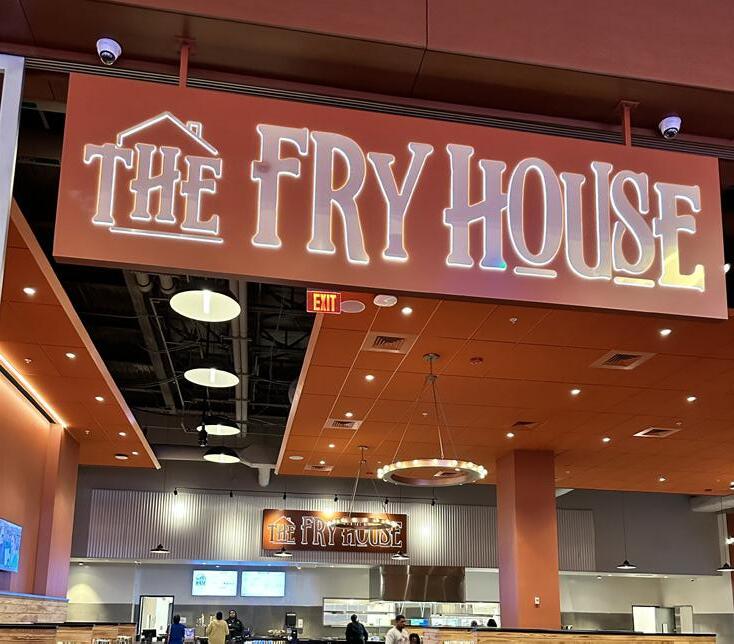
Before Southland’s most recent expansion, it were very focused on the local market. Now its reach has expanded to attract people from all over the Mid-South and beyond, such as a recent bus group from Chicago.
West Memphis Mayor Marco McClendon said the completion of Southland Casino Hotel was particularly welcome because it undoubtedly enhanced the area’s tourism industry and put West Memphis on the map as a premier destination.


“We’re grateful for Southland’s significant investment and long-standing commitment to our community,” McClendon said. “We are looking forward to the positive impact that this will have toward driving economic growth in the city of West Memphis.”
Luisa Woods, vice president of marketing for Delaware North’s gaming division, said now that Southland is an integrated resort, there really is something for everyone. In addition to the casino offerings, the eight different dining and bar concepts provide expanded entertainment options.
“The addition of a 300 room hotel, together with the addition of exciting new dining options, transforms Southland Casino from a regional favorite to a true destination gaming and entertainment hub,” Woods said. “Today, Southland is welcoming close to double the number of individual guests at our facility compared to before the opening of the hotel, and we see that the majority of those new guests are travelling in excess of 75 miles to experience our property.”
Experiences in the field from Delaware North’s operations in the United States, the United Kingdom and Australia facilities — including casinos, racinos and poker rooms — give the company the ability to take best practices from the field to expand and refine operations at every property.
There are also advantages for patrons. Delaware North’s Lucky North Club loyalty program gives discounts and other
benefits that allow patrons to access “bucket list” destinations where Delaware North’s other divisions operate, including national parks, sports venues and Delaware North-owned hotels.
“You can play with us at Southland, spend a weekend at Saratoga, or head out to the Grand Canyon or other really fabulous destination resorts in our portfolio,” Woods said. “That is something very unique. Lucky North Club members have access to preferred dining and preferred access to concerts and sporting events at stadiums in areas where we have facilities.”
Woods said the company works hard to be fundamentally integrated with West Memphis and the other communities served.
“We are a major employer, a major taxpayer and a major purchaser of goods and services in the regions where we have facilities,” Woods said. “At Southland, we are a gathering place for the community when people are looking for entertainment. Where we are located is ideal to serve the Memphis market and people traveling to Memphis. We are a seven-minute drive from Beale Street. This is an attractive place for local residents and people traveling through with friends and families.”
Southland also has a significant impact on charitable giving in the town of 24,100, with about $1 million in donations in 2022. That includes revenue from Southland’s “Game Changer” program. Any money from gaming that patrons don’t cash out is donated to charities selected each quarter by Southland.
After more than 25 years of navigating through many career moves that took him all over the country, fate brought Arthur Orduña to Little Rock to manage The Venture Center.

For Orduña, the road to The Venture Center has been a long one — full of twists and even a bit serendipitous. First, he received a Bachelor of Arts from Cornell and then, with some NYU dramatic writing courses under his belt, he worked as an editor for a small newspaper. From there, he pivoted into marketing and technology by helping a Des Moines startup software company grow into an IPO. Then, he went to Silicon Valley (mid bubble) and worked in software management for progressively larger and larger companies until he pivoted into media.
He was hired away from Silicon Valley to help launch the North American division of France’s largest entertainment provider, Vivendi. He rode the wave of mergers and acquisitions
that led to Vivendi Universal, one of the biggest entertainment companies in the world. Then, another move. This time to Syracuse to help run product and technology for Bright House Networks. That led to the launch of Canoe, a joint venture between the top six cable companies. He took on the roles of CEO and CTO. From there, he went on to manage technology and innovation for PayPal and, later, ADT.
Then, another pivot with a move to New Jersey to work with Avis Budget Group. Again, the role was to leverage new technology, new products and new services, and not only significantly improve the core business of global car rental and car share (Avis Budget owns Zipcar) but also to leverage assets and technologies into new mobility markets. According to Orduña, that’s how to find the next billion-dollar mobility marketplace. Up until two years ago, he was busy creating partnerships between the car rental giant and Google (for its self-driving cars), Uber and
Lyft. He focused on providing fleets for rideshare drivers while bringing in telematics and electrification.
“And then, just like with cable, I needed a break,” Orduña recalled. As he figured out what to do next, he considered all the disparate industries he had been a part of — some at the C-Suite level, some multinational companies and some at the startup stage — and what he found was one great overlap. In every role, he had helped create new products and services.
“From early-stage companies to later-stage companies, it all had to do with translating technology into services and products that meant something to people in their homes or in their businesses,” he noted.
To figure out his next steps, he decided to test out three different business options, beginning with startups. Did he want to go back to working in a startup environment? He tested that by becoming an adviser to a few early-stage businesses, and the answer was, “yes.” He liked helping new businesses grow, and he continues to advise several early-stage technology companies today. The second question he asked himself was: Did he want to work with an accelerator or an incubator? To answer that, he connected with Newlab — a leading accelerator and pioneer technology incubator — and thrived on helping them create new mobility studios with Ford Motor Company. Lastly, he thought about going into capital investment and helping to fund earlystate businesses. That was when Jeff Fox came in.
The two men had met back when Orduña worked at Avis Budget Group and Fox was on the board of directors. Now, Fox was reaching out to him as the founder and chairman of Circumference Group with an idea. They could create a partnership between his business and The Venture Center. For Orduña, the perfect combination of everything he had been looking for careerwise had just presented itself.
He had just gone through two years of advising companies, helping accelerators and being a part of investment decisions. It had all been good training. “To join as a colleague with the existing team and to become the executive director,” he explained, “seemed like — and I know it sounds weird — like the natural culmination of all those different things I’ve done for the last 20 to 25 years. They all came to a head with The Venture Center.”
Orduña joined The Circumference Group as chief innovation officer, overseeing CG Ventures and then accepted the position of executive director for The Venture Center in January of this year. In his current role, he guides the company’s growth, strategic direction and business accelerator programs. “Well, that’s our mission,” he said, “to use our platform, our programs, our processes and our people to help entrepreneurs be successful at every stage of their journey.”
It couldn’t have been planned any better. Every job from college until now checked a box that prepared him for this position. Even his role as an Eagle Scout, which might count as his actual career start, played a part. As an Eagle Scout, he learned one of his most valuable business lessons.
“Never make a promise that you know you cannot keep,” he emphasized. “Only promise when you are absolutely sure that you will do it or you’re going to die trying.” As Orduña steers The Venture Center, this mentality informs many of his decisions.
In the short term, the executive director plans to keep broadening and enriching the firm’s fintech expertise while expanding it into other industries. The Venture Center is already known for its strong, award-winning fintech capabilities. The long-term goal is to help make Arkansas, and by extension the whole central region of the U.S., into a roaring economic engine. Together with other organizations — including FIS and ICBA and agencies such as the Little Rock Regional Chamber of Commerce — The Venture Center team plans to bring in “a lot of capital into the area, so that it becomes recognized as one of the leading areas for entrepreneurship and businesses in the country.”
Orduña, meanwhile, plans to do all this while maintaining a company culture that is founded on mutual respect. “That begins with building trust and earning it. It begins with honesty,” he said. That’s where that important Eagle Scout lesson comes in — keeping promises. “Culture may be maintained and derived in all parts of the company, but everybody always looks to leadership, especially when there are times of uncertainty, especially during periods of change.”
He also wants to make sure The Venture Center is a place where they’re not only supporting the entrepreneurs who are their clients, but they have entrepreneurs who work for The Venture Center as well. “A mark of our success is that we’re helping entrepreneurs on the outside, and we’re helping our own people become entrepreneurs and launch their own businesses as well.”
Orduña is incredibly proud of how much his colleagues have accomplished. “The team is amazing, and it’s a small team that has done and continues to do incredible things.” He notes that when he started working with them many important relationships with other organizations “were already in flight.”
“My job,” he added, “is to make sure to knock down barriers for them as fast as I can and to put tools into their hands and resources on their desks so ,that they can see what they can do.” Lastly, he noted, “What I’m most proud about is the fact that they’re filled with this mission and this passion, and they’re inspiring me. I would love for The Venture Center to continue to be a place that attracts the best.”
“What I’m most proud about is the fact that they’re filled with this mission and this passion, and they’re inspiring me.”
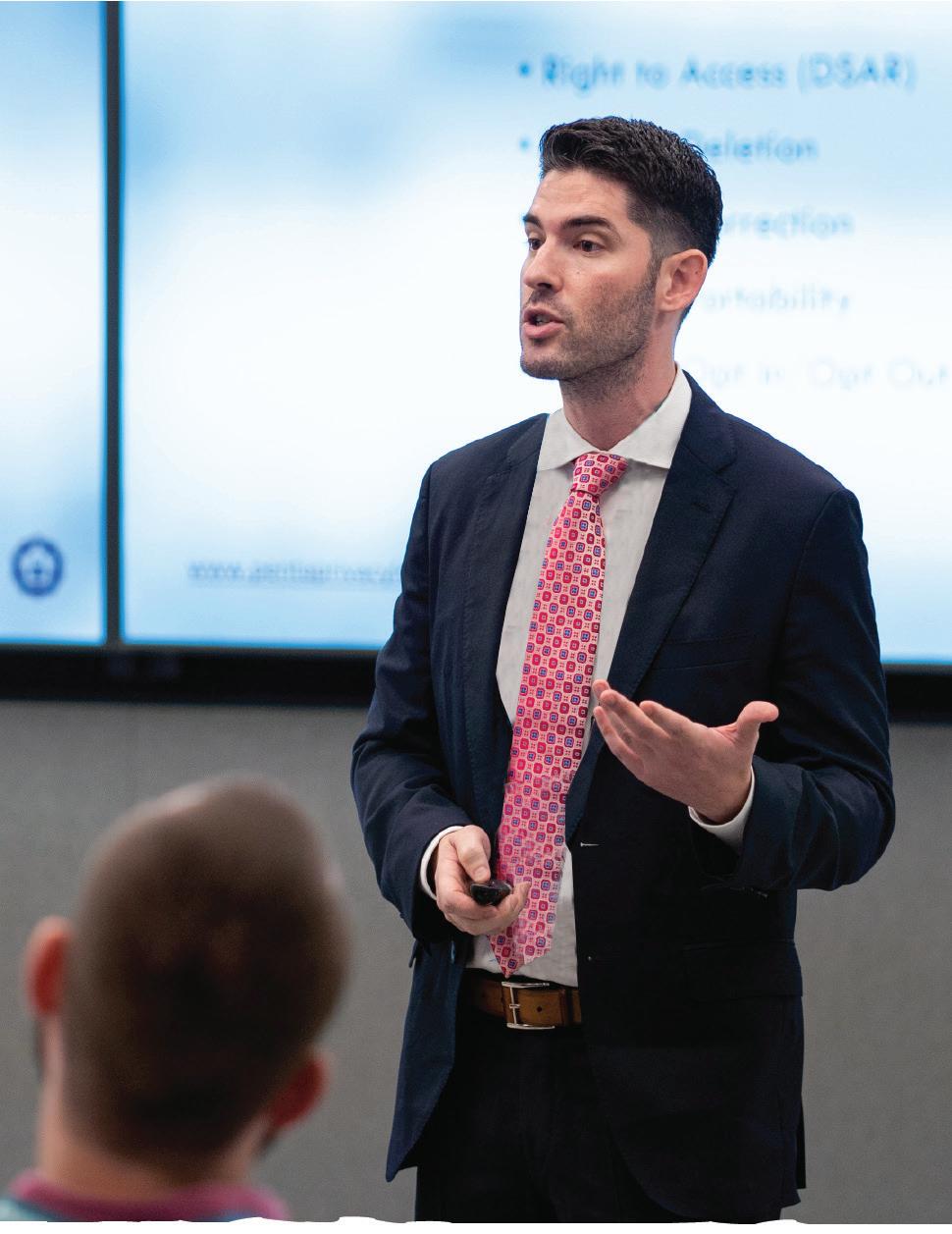


In the heart of downtown Little Rock, you’ll find The Venture Center, a nonprofit entrepreneurial support organization that serves as the go-to for innovators, dreamers and our state’s future business leaders. As part of its robust programming, The Venture Center created Spark!, an exclusive 10-week accelerator in partnership with the Little Rock Regional Chamber of Commerce. The purpose of the Spark! program is to
help founders scale their company with a robust curriculum targeting small businesses, activities, mentors and subject-matter experts.
Members of the Spring Cohort represent unique businesses and backgrounds, from janitorial services to trucking and logistics, but all have one thing in common: the desire to scale small businesses that will thrive in Arkansas.
Tim is a dedicated entrepreneur who started his business, Kingdom Made Treats, selling real Italian ice at a variety of venues including fairs and festivals, sporting events, school fundraisers, corporate catering and kiosk locations throughout Arkansas. His entrepreneurial journey began when he developed a desire to create a legacy and build generational wealth for his family. With five successful years under his belt as a small business owner, he takes pride in overcoming the challenges that come with a growing a thriving business.
Tim’s aspirations for his business include becoming a household name in Arkansas and beyond, providing a blueprint for other aspiring entrepreneurs. He values mentorship and hopes to gain knowledge, tools, and a supportive network through Spark! to continue scaling and strengthening his business.

Eve is the inspired entrepreneur behind Made to Manifest, a life coaching service hoping to help women of all ages, particularly those between the ages of 18 and 35, manifest positive changes in areas of their lives by helping them tap into their innate abilities and strengths. Despite facing difficulties, she has taken significant strides, including publishing the “Made to Manifest” book series and hosting the ManifestHER Empowerment Brunch.
With the help of Spark!, Eve hopes to gain a deeper understanding of business operations, form a comprehensive growth plan and cultivate a supportive network.

Tiara is the dynamic entrepreneur and “momager” behind Zoe’s Lemonade Stand, a specialty beverage business inspired by her 6-year-old daughter. Despite challenges, she has successfully grown the business over the past three years and has an ambitious vision for the future. Tiara hopes to transform the stand into a lemonade café, creating a nurturing environment for young entrepreneurs to learn and develop their own ventures. She sees the value in Spark! for its networking opportunities, mentorship and community support to help her reach her goals.
Beyond its commercial success, Zoe’s Lemonade Stand is deeply committed to community enrichment, offering employment opportunities to local children, along with free books, and collaborating with Project Renew Inc. in community engagement activities. Tiara’s entrepreneurial spirit is coupled with a strong drive to give back to her community, making her business a source of both economic and social value.

XtremeClean Janitorial & Cleaning Services is a minority- and womanowned business servicing the Central Arkansas area specializing in sanitizing and disinfecting.
Keytia, the resilient entrepreneur behind XtremeClean, started her business in response to unexpected adversity in the form of job loss during the 2020 pandemic. Despite the sudden setback, she and her husband saw it as an opportunity to build a brighter future and generational wealth for her family. Despite her struggle with the unknowns of entrepreneurship, finding potential customers, and lack of experience, she’s proud of her achievements, including securing new funding from winning local pitch competitions.
Keytia’s vision for XtremeClean is to become a top-rated, minority-owned business known for exceptional service and for its inspiring story of transformation. She hopes to gain knowledge, guidance and mentorship from Spark! to elevate her business to the next level.


Abby is the passionate founder of Willroth Consulting, a firm committed to providing personalized consulting and empowerment services to aspiring entrepreneurs who are ready to leave their jobs. She embarked on her entrepreneurial journey after leaving her corporate job and seeking a platform where she could engage in fulfilling work suited to her strengths.
Abby appreciates the challenges and obstacles that come with running a small business, but has learned to stay motivated and focused on her goals. She aspires to grow her business while maintaining a personal connection with her clients. By participating in Spark!, Abby hopes to gain new insights, ideas and connections that will inspire her and help her take her business to new heights.
 By Sarah Coleman
By Sarah Coleman

Bicycle riders enjoy Little Sugar Trail near Bella Vista. Little Sugar is currently a 40-mile open network that runs across Sugar Creek, leading toward Tanyard Creek, and wraps around Windsor and Avalon lakes.
The Natural State affords its residents many opportunities to experience all the best parts of being outdoors. From hunting and fishing to water sports, from hiking and biking to exploring, Arkansas has one of the best scenes for enjoying nature; outdoor recreation brings in thousands of tourists each year, while remaining relevant for locals.
The United States Department of Commerce Bureau of Economic Analysis economic data for 2021 revealed the positive impact of outdoor recreation all over the country. The report noted that Arkansas’ outdoor recreation economy grew 23 percent from 2020 to 2021, bringing in an economic value of $3.5 billion. That includes the 39,929 jobs in the state associated with the outdoor rec economy. According to the report, this was the largest-recorded measure for Arkansas since the BEA began measuring the impacts of economic growth in outdoor recreation in 2012.
Outdoor recreation includes, as one might guess, anything pertaining to the outdoor experience. And in the case of Arkansas, this includes anything that occurs on lakes, rivers, forests, mountains, inside of caves, on creeks, trails and yes, even airstrips.
When it comes to biking, Arkansas is full of possibilities that entice almost any rider, with various levels, skills and areas included for riders to enjoy. These trails include monument trails at Arkansas State Parks and other worldclass rides through several cities in the state as well as longform travel connectivity.
Mountain biking has steadily increased in popularity throughout the state over the past decade, particularly in Bentonville, which has been dubbed “The Mountain Biking Capital of the World.” Bentonville is well-known for its ef-

forts in community biking, and for good reason. OZ Trails Northwest Arkansas is headquartered in the city, and boasts a world-class network of shared-use trails. This biking community includes ambassadors, adventure seekers, riders, runners and hikers. The trails encompass eight cities in the region and world-renowned trails such as Coler MTB Preserve in Bentonville and Little Sugar in Bella Vista.
The rapid growth of interest in mountain biking in the region led to the U.S. National Mountain Bike Team to place its headquarters in Bentonville leading up to the 2028 Summer Olympics. This news was announced in December of last year, along with the news of USA Cycling hosting events to draw out young talent in the state. USA Cycling, in a December news release, expressed gratitude to the Walton Family Foundation, Steuart Walton, Tom

Walton, the Rob and Melani Walton Foundation and the Penner Family Foundation for making the national team camps possible.
While the U.S. National Mountain Biking Team will be headquartered in Bentonville, USA Cycling’s corporate headquarters will continue to be located in Colorado Springs. But USA Cycling’s Jim Miller said having training and support facilities based in Bentonville will provide riders with “an ideal launching pad to succeed on the world stage.”
“Northwest Arkansas, which we affectionately call OZ, is becoming a cornerstone of the U.S. Mountain Bike Race scene,” Steuart Walton said in a December release. “When you add in world cyclo-cross events and epic gravel riding, you can see how the region is becoming more of a tourist destination. Our hometown is quickly becoming a global hub for both professional cyclists and emerging talent to develop to their fullest potential in the ‘Mountain Biking Capital of the World.’”


FAYETTEVILLE: GOLDEN FOR CYCLING
Fayetteville may be home of the Razorbacks, but it is also known for connecting NWA through a 40-mile cycling trail, the Razorback Greenway. This initiative connects the communities of Fayetteville, Johnson, Springdale, Lowell, Rogers, Bentonville and Bella Vista and offers recreation, innovation and transportation. While the trail belongs to all of NWA, the Greenway is a launching pad for cycling initiatives in the area.

The League of American Bicyclists has been around since 1880, and it’s ranked several cities in Arkansas through its BFA Awards Database. Arkansas has eight communities recognized: Bentonville, Springdale, Conway, North Little
Rock and Little Rock were noted as bronze communities; Benton and Washington Counties and the city of Rogers were ranked as silver communities; and Fayetteville was the sole community to be ranked gold.
This coincides with Arkansas colleges and universities receiving a ranking — the University of Central Arkansas and Hendrix College receiving a bronze ranking; Arkansas State University receiving a silver ranking and the University of Arkansas was rated gold.
Brannon Pack, director of cycling tourism at Experience Fayetteville, said a lot of Fayetteville’s success in biking has boiled down to the entire community making an effort to create bike-friendly spaces.
“What we’re seeing in Fayetteville is families leaning into biking for recreation, more people opting to be biking commuters and the sporting side to biking rising in popularity,” Pack said. “It’s been 20 years since Fayetteville adopted a bicycle-friendly plan, and when we started there were no bike routes and no bike lanes. Slowly we started to see huge support in the beginning of a trails program.”
Pack explained that the rise of popularity of cycling boils down to community support, starting with public input.
“Northwest Arkansas, which we affectionately call OZ, is becoming a cornerstone of the U.S. Mountain Bike Race scene.”
–Stuart Walton
Fayetteville hosted the UCI Cylco-Cross World Championships, sponsored by Walmart, in 2022. It was just the second time in history the event had been hosted in the United States. Meanwhile, local organizations like Bentonville Moves (opposite page) are encouraging everyone to ride with events like the Bentonville Bike Train for students.
“In Fayetteville, and across NWA, trails and trail development continues to find its way at the top. The awardwinning trail development has made for a vibrant community as well as a cycling destination,” Pack said.
According to Pack, cycling tourism has become big in Fayetteville with the No. 1 thing tourists look for being quick and easy access to trails, close to lodging.
“Over 80 percent of cycling tourists are basing travel on the drive markets. Fayetteville and the rest of NWA is a 10 hour drive or less from major metropolitan areas, so this sets a stage for there to be a lot of gravity to tourists,” Pack said. “After the ride, cyclist tourists want to be local. They want to eat and drink locally. At this point, in every season, we have cycling tourists who come to Fayetteville to ride our trails.”
Experience Fayetteville, the city of Fayetteville and the Fayetteville Town Center have partnered to drive success of a bicycle-friendly community through its Bicycle Friendly Business Bootcamp. This training workshop is based on specific programming through the League of American Bicyclists that allows organizations to bring business owners together and further support the initiative of making Fayetteville more bicycle-friendly.
According to Pack, a few things that have been continuously observed in these training sessions are what he considers to be low-hanging fruit for businesses to accomplish. Pack recommends that businesses owners understand investment in trails around their business and use this in talent-recruitment initiatives. He also recommends that business owners prioritize bicycle parking and provide it in a visible setting in addition to incentivizing guests to cycle to the business.
Competition has also been a major key to Fayetteville’s cycling success, as it was selected to host the 2022 Walmart UCI Cyclo-Cross World Championships, a global sporting event that put Fayetteville on the map as a cycling destination. This marked the second time the championships had ever been hosted on U.S. soil.


Locals, nonprofits, businesses and cycling clubs work together to create an environment that encourages recreational bicycling.
“Community support has always been really big in Fayetteville, and there are multiple weekly group rides
that start and finish from local businesses, which happen to be the same businesses that cyclists are looking for as well,” Pack said, explaining that Ozark Gravel Cyclists host a community ride every Thursday night which starts and finishes at Puritan Coffee & Beer.
All in all, Pack says he believes that cycling infrastructure has served the entire community, where families are adopting healthy, active lifestyles, and cyclists are traveling in order to experience these trails.
“Cycling infrastructure in Fayetteville did not happen overnight. This was an interest of Fayetteville residents, and it started at a community level,” Pack said.
In Bentonville, it is not uncommon to see bicyclists commuting to work, riding the trails recreationally or even to see kids ride their bikes to school. The Bentonville Moves Coalition is a local organization committed to making Bentonville the safest active transportation city in the heartland by 2027. The coalition, in collaboration with parents, teachers and Bentonville Public Schools, has been passionate about holding bike trains for students in the city.
Jennifer Standerfer, coalition member and organizer of the last day of the school bike train, has been a force behind getting this initiative launched. Previously, Standerfer worked with Bentonville Moves Coalition in order to bring a Bike to School Week to Willowbrook Elementary and Bright Field Middle School.
“After the Bike to School Week, some of my friends on PTO and I began to map the bike train out. We work with peer volunteers to lead this, and because we had such a huge response on Bike to School Week, we were able to lead larger and larger crowds to school each week,” Standerfer said. “It’s fascinating to see, because my kids are excited to get out of bed on bike train day. They’re excited to go out and meet their friends, and we’re excited to teach them all about the healthy values of biking.”
As a mom and lifelong resident of NWA, Standerfer has been able to see firsthand the growth of cycling in the area, and has been impressed by the initiative to involve children in cycling.

“Before each ride, we talk to them about cycling safety, as far as staying on the right side of the road, not passing the parent leaders, signaling left and right and pretend-
ing that there’s a ghost rider in front of them so they are spaced out evenly,” Standerfer said. “We are hoping that we can expand the bike train into other schools and continue to build more interests with bike trains on Fridays. In the meantime, we still need cycling connectivity with the infrastructure.”
Standerfer is also a lawyer with Waymack Standerfer PLLC and has continued to work with the community, lawyers, politicians and corporate leaders to continue to expedite the zoning and cycling infrastructure in the community.
In addition to bike trains, camps and club riding, the National Interscholastic Cycling Association has entered into Arkansas with the Interscholastic Arkansas Cycling League. Arkansas NICA Student Mountain Biking is included in the Interscholastic Arkansas Cycling League, with the mission of getting more kids on bikes. Organized in 2015, the Arkansas Interscholastic Cycling League is a safe, fun and high quality mountain biking program for students in grades 6-12.
“NICA has brought forth mountain biking as an athletic activity in schools. This offers an opportunity to race mountain bikes and also engage their families. After a kid is involved in it, we have seen parents also adopt it, and before you know it, the entire family is involved,” Pack said, explaining that the league has grown to more than 850 athletes in more than five years, with close to 1,000 athletes expected for this next season.
Throughout Arkansas there are more than 30 teams, 15 located in NWA and the rest spanning the state.
Central Arkansas’ Metroplan has mapped out its own regional greenways plan, and (opposite) the U.S. Bicycle Route System that will traverse the state acts as a bike “interstate.”
While NWA has made massive strides in both mountain biking and street biking, Central Arkansas’ push for cycling has not gone unnoticed. The Arkansas Department of Transportation is focused on providing a modern transportation system that enhances safety and quality of life in Arkansas. However, it recognizes that pedestrian and bicycle facilities have provided a place for recreation as well.
“As a matter of policy, ArDOT includes sidewalks in all major highway reconstruction or widening projects in urban areas,” Kimberly Sanders, ArDOT bicycle-pedestrian coordinator, said. “We also work with cities and counties to identify partnership opportunities to provide enhanced accommodations for pedestrians and cyclists in our major projects.”
ArDOT currently administers two federal-aid programs, the Transportation Alternatives Program and the Recreational Trails Program, to provide competitive grant funding for local governments, schools and other agencies to construct pedestrian and bicycle facilities. In addition to its work in these arenas, ArDOT recently worked with local authorities and other bicycle stakeholders to designate a special bicycling route, United States Bicycle Route 80, which travels from Little Rock to West Memphis.
This 50,000-mile planned network of bicycle routes follows urban streets, county roads, greenways, trail systems and state highways for the purpose of long-distance, or “interstate,” bicycle travel. USBR 80 is part of nearly 19,000 miles within the USBR system, currently designated in 34 states.
“This establishment of a statewide bikeway network, including USBR corridors, is part of the implementation effort for the Arkansas State Bicycle and Pedestrian Transportation Plan. The benefits of designating USB routes in Arkansas include increasing bicycle tourism, furthering efforts to promote the state as a bicycling hub and improve bicycle connectivity across the state,” Sanders said.
According to Sanders, the next step for this project is having Central and western Arkansas stakeholders explore options for extending USBR 80 from Little Rock to the Fort Smith area, which would create a cross-state route from Tennessee to Oklahoma.
Currently, there are two other USBR routes that have been highlighted within the state as part of the National Corridor Plan, including USBR 51 and USBR 84. USBR 51 would travel through the northern part of the state and USBR 84 the southern part.
Sanders has been a cyclist for almost 20 years, years and has seen incredible growth in the number of recreational

cyclists in the area.
“This growth has coincided with the growth of the trail system, in particular. In Washington and Benton Counties alone, there are over 500 miles of trails. In the future, I hope to see similar growth in the number of people who cycle to work and other transportation destinations,” Sanders said.
Currently, Sanders is focusing on collaborating with stakeholders across the state to identify, study and document support for future USB routes.
“Currently, there is a proposed route from Missouri to Alma that generally follows Highway 71 and the Razorback Greenway, in addition to the extension of USBR 80,” Sanders said. “I am also working as a project manager for the development of a complete streets policy for ArDOT in order to develop some bicycle-safety outreach methods targeting children.”

Little Rock has been ranked as a bronze-level Bicycle Friendly Community for several years, and with that in mind, Sanders says the city is in its final stages of devel-
oping a complete streets plan, which will complement the Complete Streets Ordinance.
The Complete Streets Ordinance includes a bicycle plan that is meant to aid in creating a safe, comfortable transportation environment for people of all ages and abilities.
The Metropolitan Planning Organization for Central Arkansas also has a Regional Greenways Plan that will tie Little Rock to other areas in Central Arkansas.
The Metropolitan Planning Organization for Central Arkansas (Metroplan) also has a regional greenways plan that will tie Little Rock to other areas in Central Arkansas. “There are many opportunities to enjoy the scenic beauty of Arkansas on a bicycle, both on-road and off-road, and we encourage Arkansans to take advantage of those opportunities,” Sanders said. “However, across the nation, as well as here in Arkansas, the numbers of crashes and fatalities involving cyclists and pedestrians have increased recently. We encourage all road users, motorists, pedestrians or cyclists, to safely share the road.”
Name: Syllamo Trail
Location: Mountain View/Ozark
National Forest
Length: 50 miles
Name: Upper Buffalo Headwaters
Location: Pettigrew/Ponca/Ozark
National Forest
Length: 20 miles
Name: Ouachita National
Recreation Trail
Location: Mena/Ouachita
National Forest
Length: 108 miles
Name: Lake Ouachita Vista Trail
Location: Lake Ouachita/Ouachita
National Forest
Length: 38 miles
Name: Womble Trail
Location: Mt. Ida/Ouachita
National Forest
Length: 37 miles
Name: Hobbs State Park-
Conservation Area
Location: Rogers/Lowell
Length: 40 miles
Name: Mount Nebo State Park
Location: Rogers/Lowell
Length: 25 miles
Name: Devil’s Den State Park
Location: Fayetteville
Length: 16 miles
Name: Pinnacle Mountain
State Park
Location: Little Rock/Roland
Length: 27 miles
Name: The Back 40 Trail System
Location: Bella Vista
Length: 40 miles
(Back 40 Loop: 21 miles)
Name: Blowing Springs Park
Location: Bella Vista
Length: 18 miles
Name: Little Sugar Trail System
Location: Bella Vista
Length: 46 miles
Name: Coler Mountain Bike Preserve
Location: Bentonville
Length: 22 miles
Name: Slaughter Pen Trail System Location: Bentonville
Length: 40 miles
Name: The Great Passion Play Trail System
Location: Eureka Springs
Length: 15 miles
Name: Lake Leatherwood Trails
Location: Eureka Springs
Length: 25 miles
Name: Marble Flats Location: Eureka Springs
Length: 5 miles
Name: Lake Fayetteville Location: Fayetteville
Length: 6 miles
Name: Mount Kessler Location: Fayetteville
Length: 9 miles
Name: Centennial Park Location: Fayetteville
Length: 12 miles
Name: Buffalo Outdoor Center
(BOC) Downhill Trails
Location: Ponca
Length: 10 miles
Name: Lake Atalanta Trails
Location: Rogers/Lowell
Length: 18 miles
Name: Fitzgerald Mountain
Location: Springdale
Length: 12 miles
Name: City Lake
Location: Siloam Springs
Length: 3 miles
Name: Pension Mountain
Location: Berryville
Length: 9 miles
Name: Northwoods Trail System
Location: Hot Springs
Length: 31 miles
Name: Iron Mountain Bike Trails
Location: Arkadelphia
Length: 17 miles
Name: Ozark Mountain Bike Festival Location: Devil’s Den State Park
Name: Arkansas Mountain Bike Championship Series
Location: Multiple
Name: U.S. Pro Cup
Location: Fayetteville
Name: Arkansas Enduro Series
Location: Multiple
Name: Arkansaw High Country Bike Race
Location: Hot Springs (host city)
Name: Big Sugar Classic
Cycling Festival
Location: Bentonville/Bella Vista


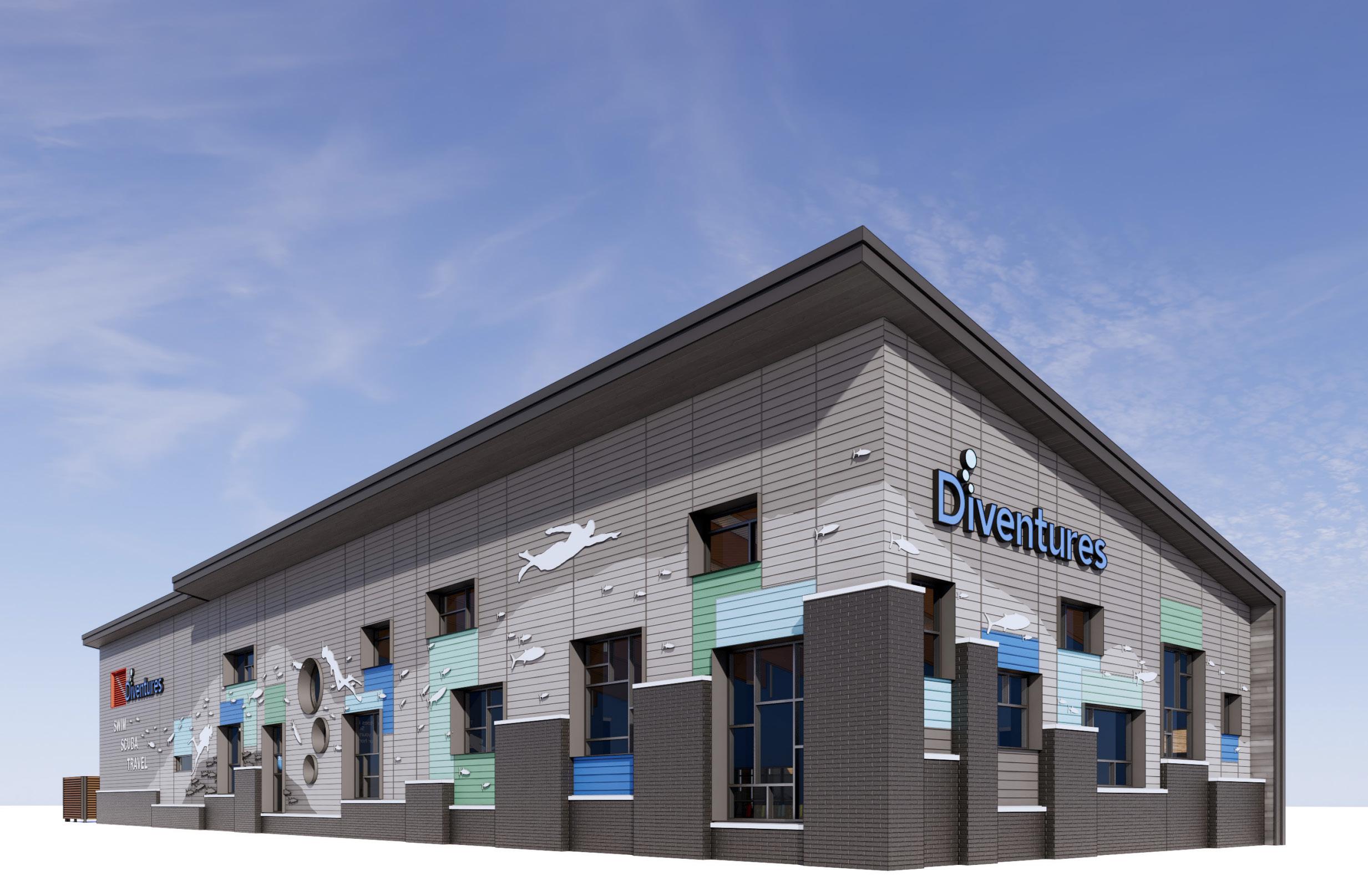 By Dwain Hebda
By Dwain Hebda
There’s an old adage in business that warns against launching a company that’s too closely aligned with one of your hobbies, but that’s a wetsuit that never really fit Dean Hollis.
Hollis, a longtime diving enthusiast and lifelong child of the water, rides herd over the largest and fastest-growing company of its kind in the nation, Diventures. The Omaha, Neb.-based company offers swim lessons and scuba training to consumers of all ages in 12 states. But the owner and founder sees the success of the company less for what it brings in than for who it reaches and what it does, which in his view is nothing short of saving lives.
“Teaching people to swim is a very important part of our business economically and emotionally,” Hollis said. “Twentytwo people are going down today and tomorrow and the next
day, and 11 of those people are going to die, and half of those deaths are going to be kids. That’s a pretty compelling reason to say we’ve got to grow, and we’ve got to get to where the families are so we can teach kids how to be safe around the water.
“Water safety really drives our expansion. Our passion is to help as many people as possible be safer and have fun around the water. The business opportunities come along with that.”
Diventures has pursued this mission zealously over the past couple of years, completing a sweeping round of acquisitions that have brought many new markets within reach of the company’s swim centers. Two years ago, Diventures snapped up New Horizons Diving Center in Lexington, Ky.; Kansas City-based TD Scuba; Atlanta-based SeaVentures; AQUATREC in Lincoln, Neb.; and The Playground Dive Shop in Blue Springs, Mo.
In 2022 alone, the firm bought Sub-Aquatic Sports and Services of Battle Creek, Mich.; Scuba Professionals of Arizona/Arizona Dive Shop in Phoenix; Virginia-based Nautilus Aquatics and The Dive Shop, headquartered in Memphis. The latter deal also included a center in Little Rock, which checked two boxes off Hollis’ to-do list.
“We’d already started looking around the geography in Arkansas, and Little Rock was on our list,” Hollis said. “I knew Doug McNeese, the previous owner of the Dive Shops, and I started talking to him about an exit strategy and talking to the local Little Rock team about how and why it makes sense to be part of the Diventures family.
“It worked out great. It’s a market we want to be in and the type of people we want to be in the market with.”
If you’re surprised to hear Little Rock even had such a location, chances are you’re not into snorkeling or scuba diving, as focusing on that small subset of the population tends to be the traditional business model for dive shops from coast to coast. As such, such centers generally don’t have to worry about their location as their specialized target audience will go where the programs are, especially in landlocked areas of the country. Thus, Little Rock’s 6,000-square-foot center currently sits in a neighborhood clutch of nondescript Midtown strip centers so homogenous you’d only know it’s there if you’re looking for it.
That’s where Diventures’ business model veers sharply from the industry norm. Once Hollis decided his company would be as much about general swim education as the specialized diver’s market, the rules of location and facility changed dramatically.

“There’s 35 markets in the United States that are within two hours of about 85 percent of the U.S. population,” he said. “Why is that important? We know divers will drive up to two hours for a good dive shop. They do here in Omaha, and they do elsewhere. So, we get to those 35 markets, we can take care of 85 percent of the divers in the United States.
“When I started, learn-to-swim wasn’t even on my radar. I was just going to open up a little dive shop like every other dive shop. Once we made that decision to offer general swim lessons, we learned that the key is making it convenient for moms and dads, those with young kids. We discovered even though divers will drive two hours, Mom won’t drive more than 15 or 20 minutes to get to swim-
Dean HollisWe have to find a piece of property first, and we’re pretty picky about that. We want to make it super-convenient for Mom.
ming lessons, so we’ve got to be close by for the family.”
Accordingly, Diventures swim centers are large, mostly freestanding facilities that turn on visibility and access. The typical footprint of a location is right at 10,000 square feet, although smaller versions are still used depending on the market. Little Rock is in line for one of the larger models, once Hollis and team can find a suitable location. At present, the search has only narrowed to a general area of the city, the Chenal Parkway corridor through the city’s western neighborhoods, as they actively research potential building sites.

Hollis said the company is unapologetically painstaking in its site selection, meaning the new center won’t be completed until 2024 at the earliest.
“We have to find a piece of property first, and we’re pretty picky about that,” Hollis said. “We want to make it super-convenient for Mom. It’s important to have access to the
building, parking is important, getting close to where the population is. We have learned not to rush. We have learned we have to make it really easy on our customers and make it really easy for them to get in and out of the building. That’s priority number one.
“We have two different [building] prototypes. The pool is going to require a slope from the shallow end to the deep end. That determines our footprint. But we have those two designs done, so that takes time out of the equation. We already have the design done, and we already have our general contractor selected, our pool contractor. Then, it’s a matter of putting it up for bid and breaking ground.”
For as big of a component as swim lessons are to the success of Diventures, Hollis is quick to point out the diver population isn’t given short shrift by any means. In fact, he said, maximizing the swimming lessons market is one of the best things the company does
to support the diver side of the house.

“As I looked at the economic side where we have complete swim programs, it does about 60 percent of our revenue,” he said. “It is obviously very important economically to us, but it’s also very important for the future of diving because if we don’t teach people to swim, we aren’t going to have divers. But if we teach people to swim and teach them to love the water and be safe around the water, now we’ve created an opportunity for those people to become divers.
“Where we have our full-scale facilities, during the peak season we’ll get up to 1,000 kids a week in learning to swim. That’s per location. So, if we come to Little Rock and we have 1,000 kids a week in learning to swim, that’s a lot of future divers.”
Another service Diventure provides with the diver in mind is its diver excursion service, a specialized travel agency run through the Omaha headquarters that helps divers plan their vacations and trips quickly and easily.
“We have a centralized fleet-travel department in Omaha where we have four full-time people in travel,” Hollis said. “It makes it really easy for the local dive shops to focus on taking care of the customer while we take care of the back end. For instance, probably in Little Rock, they’d run maybe three or four international dive trips a year. Diventures, we’ll do over 100 trips; I think we did 150 trips last year.
“That immediately gives all the customers in the Little Rock market the opportunity to travel pretty much wherever they want to go, whenever they want to go. That’s a big advantage we have, because they don’t have to worry about negotiating with airlines and negotiating with resorts. They make one phone call to our travel department, and we take care of everything.”
As the one-stop shop for all things aquatic — save for competitive swimming teams, which are not offered — Diventures accommodates clients from infants to special needs to seniors in the most basic swim instruction on up to highly technical and specialized skills. And almost daily, Hollis said, the staff works with people for whom the water has been something to be feared as dangerous and deadly all their lives.
“Adult learn-to-swim was also something that wasn’t initially on my radar, because I grew up in Florida. Everybody knew how to swim from a very early age,” he said. “When I learned how many people didn’t get that opportunity or suffered something traumatic, it was shocking. I can’t tell you how many people come in and it’s hard for them to even walk in the building. Some people can’t even take a shower for years because of some sort of trauma that happened early in their life that involved water. It’s scary.
“That’s probably one of the most rewarding things is to see these people and just be so patient with them. Just move slowly and teach them how to overcome whatever that was in their past and to eventually get in the water and swim. It is unbelievable. Just such an incredible experience.”
If we don’t teach people to swim, we aren’t going to have divers.The Diventures space will include a natatorium (see rendering on opposite page), classrooms and retail space. (Images provided)
The United States Marshals Museum opens in its full grandeur next month in Fort Smith, and the time is ripe for casting a light on the city’s influential past as law enforcement evolved to address a growing nation.
Larger-than-life figures — the real-life Rooster Cogburns — were in and out of Fort Smith throughout the late 19th century and served as a test chamber for federal policies and law enforcement organizations around the country.
The Fort Smith that came to be depicted in “True Grit” got its start when the Court for the Western District of Arkansas was moved from Van Buren to Fort Smith by the 32nd Congress on March 3, 1851. The court had gotten off to a rocky start under the oversight of Judge William Story — a series of fires ruined judicial buildings, and corruption throughout the Western District sparked an investigation. While some bills were drafted to abolish the court altogether, Story resigned under fire. The Senate was unsure what to do with the Western District, and the court system in the area was back to the drawing board.
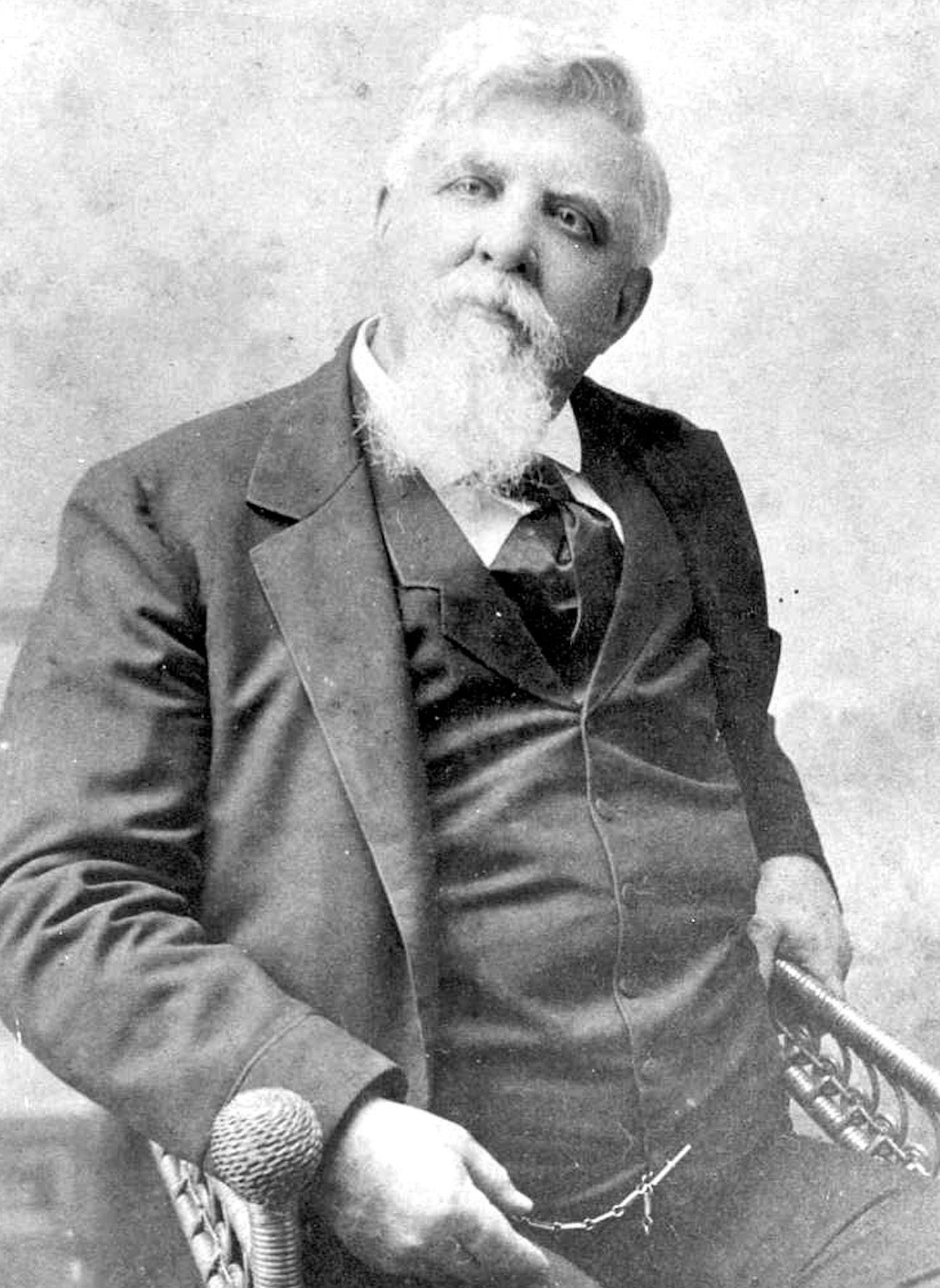
“I do not desire to hang men. I never hung a man. It is the law.”
— Judge Isaac Charles ParkerJudge Isaac Parker (Photos provided)
But in March of 1875, President Ulysses S. Grant appointed Judge Isaac Charles Parker to the recently vacated Fort Smith judicial post to clean up the mess. A farmer and teacher before becoming a lawyer, Parker had been involved in politics and official positions before enlisting in a home guard unit for Union forces before the Civil War. His upbringing had made Parker a no-nonsense man, and his work was cut out for him in Fort Smith.
Parker arrived on May 4, 1875, and held court less than a week later. During his first term, Parker found eight men guilty of murder, and six of them were hanged four months later at the infamous gallows of Fort Smith. Parker’s court was only supposed to be in session four months out of the year, but his caseload was so heavy that he held court in session from February to November to catch up.
“Parker held court six days a week, each day often lasting up to 10 hours each, in order to try as many cases as possible,” wrote Fort Smith historian Maranda Radcliff.
In spite of Parker’s dogged work, changing laws regarding nearby “Indian Territory” and a steady stream of settlers passing through the area on the way to the West led to increases in crime.
“Just as Judge Parker would conclude that he had crime defeated in the Indian Territory, it would break out again, sometimes more heinous and revolting than it had been before,” wrote historian Edwin C. Bearss in 1964.
Parker knew that work had to be done outside of the courtroom to make a difference on the streets of Fort Smith. Parker appointed 200 additional deputies to the U.S. Marshals Service, which had become largely responsible for the capture of fugitives who fled to Native American reservations in Oklahoma in an attempt to escape prosecution.
Some of the best-known marshals in history served in the Western District under Parker, including Heck Thomas, Zeke Proctor, Frank Dalton, Addison Beck and several others. But perhaps one of the best-known U.S. marshals from the Fort Smith area is Bass Reeves, who is theorized by historians to be the inspiration behind the Lone Ranger.
Born as a slave in Crawford County, Bass Reeves was one of the first Black lawmen west of the Mississippi River. Reeves fled
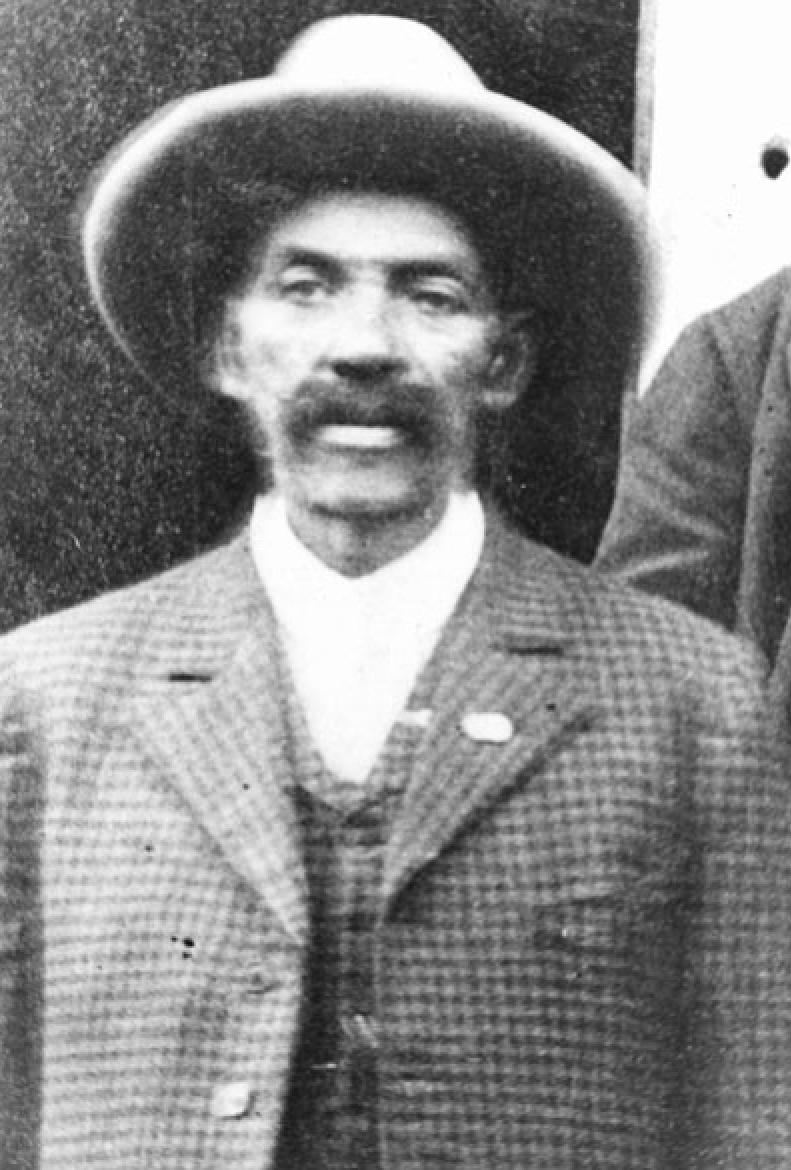
from his owner to the security of Native American territory in Oklahoma. While there, he fought alongside Native Americans as part of the Union forces in the Civil War. Afterward, Reeves was hired as a commissioned deputy U.S. marshal due to his familiarity with Native American territory.
Oral history shares that Reeves had a knack for escaping dire situations. Fort Smith was known as “Hell on the Border,” and the mostly likely place for danger between lawmen and criminals. Of the 200 deputies that Parker appointed, 65 died in the line of duty. Reeves, on the other hand, escaped harm by inches, often finding bullet holes in his hat and coat after arresting a criminal. Reeves was responsible for bringing fugitives to stand trial before Parker in the dozens, even capturing and arresting 19 horse thieves at one time in Oklahoma. Public officials and civic leaders were impressed with Reeves’ dedication to the law and with Parker’s ability to pick impressive lawmen.
Reeves began bringing back some of the most notorious criminals in the West to stand before Parker, including Seminole outlaw Greenleaf, Cherokee outlaw Ned Christie, even his own son who had committed murder. Infamous female outlaw Belle Starr turned herself in to Fort Smith authorities after she found out Reeves was working her case.
Many police departments, marshal offices and courts took note of the judicial process developing in Fort Smith, and began working to
replicate a similar justice system in their own cities. Reeves often helped other law enforcement agencies by explaining his own techniques and training police recruits in Muskogee, Okla., where he later became a police officer.
As for Parker, over the course of his career, law and jurisdiction saw great shifts that resulted from precedents set and work done in Fort Smith. Parker sentenced 160 men and women to hang at his gallows (sometimes several at once), a replica of which can be visited today just a few hundred feet away from the old federal courtroom.
Parker was often given the alias of “The Hanging Judge.” At the time of his tenure, rape and murder were punished by death. Parker often reminded reporters during interviews that Fort Smith had come a long way — no one person could take responsibility for the justice system in Fort Smith. Rather, it was a system of lawfulness that had been built up in the city over several decades.

“I do not desire to hang men. I never hung a man. It is the law,” Parker was quoted as saying in the St. Louis Republic on Sept. 1, 1896.
Fort Smith became known as the place “where the Lawless West met the Civilized East,” according to writers of the well-known travel blog Roadside America.
“After Judge Parker dispatched his last outlaw on July 30, 1896, the town quickly tore down the original gallows and burned it, convinced that it gave the wrong impression of Fort Smith,” the writers contend. “For 60 years, it was only a
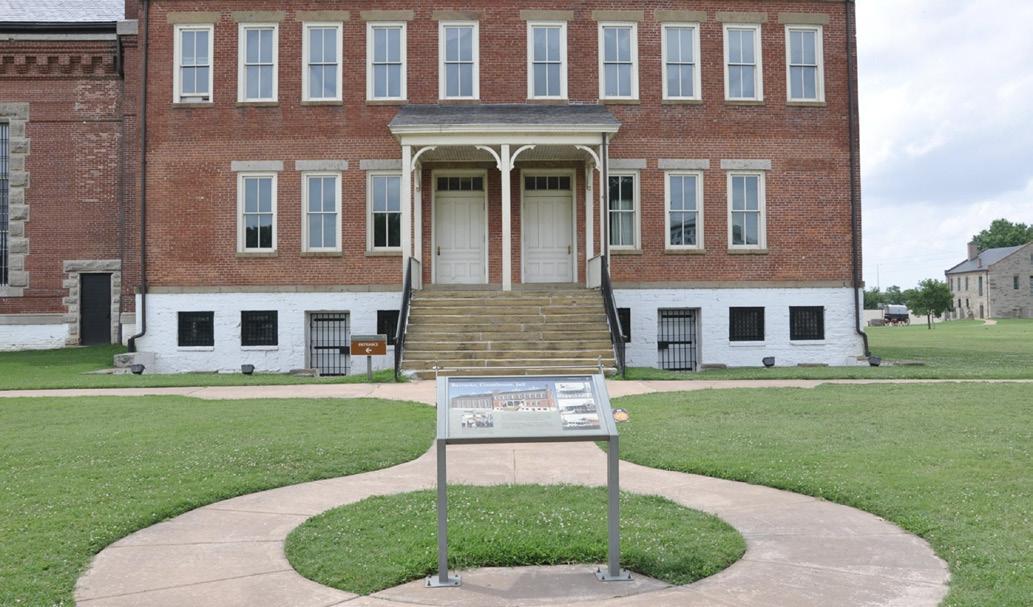
memory. But anger gradually turned to curiosity, and in the late 1950s, the first replica gallows was built. It tapped a reservoir of tourists that has flowed ever since.”
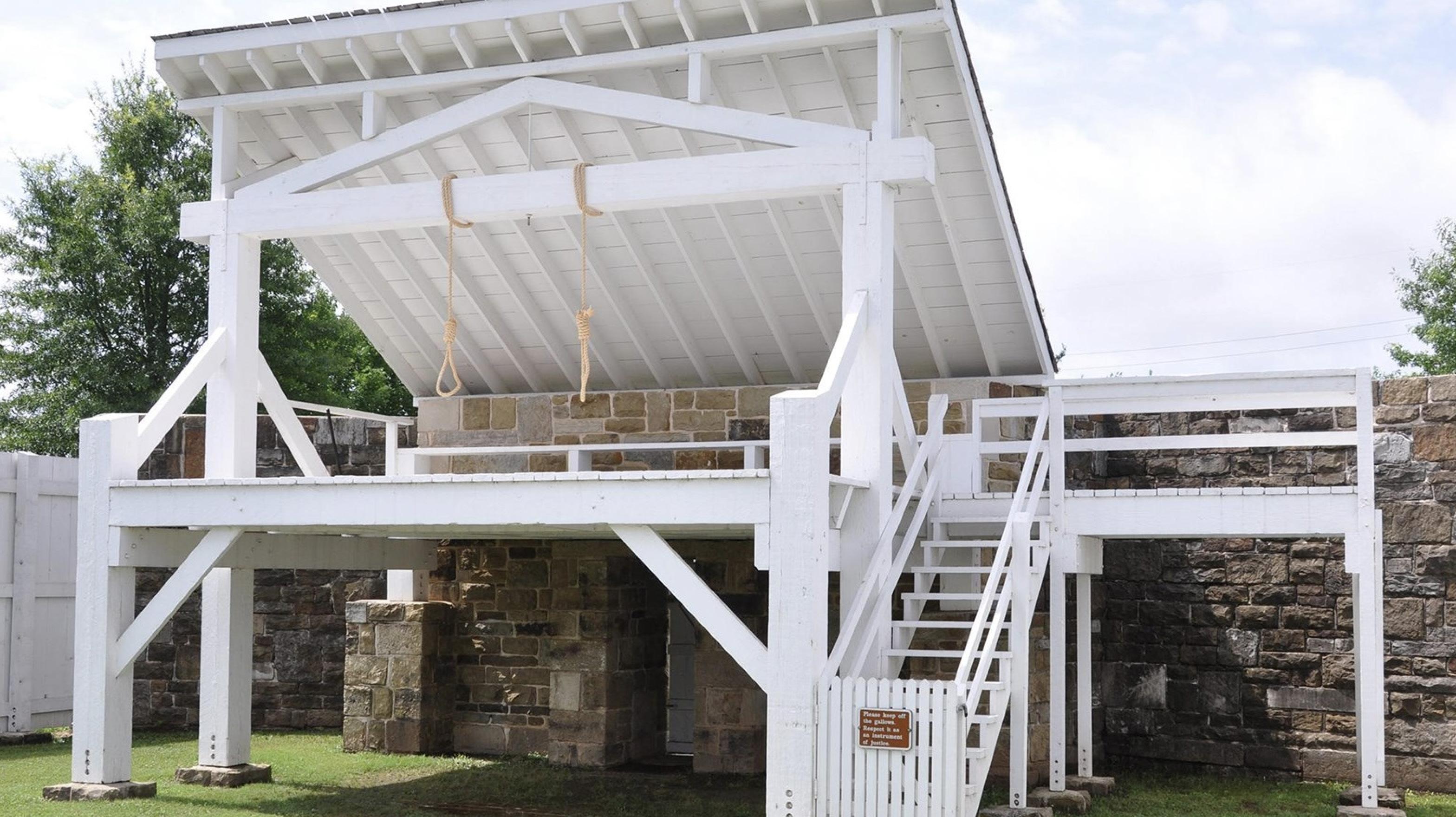
Just a few months after his interview with the St. Louis Republic, Parker passed away in November of 1896, and Reeves passed away in January of
1910. But their legends and influence live on.
It’s easy to see why the U.S. Marshals Museum will call Fort Smith home — the city has been instrumental not just in the development of one law enforcement organization, but in criminal justice and legal reform across the Wild West and into the 21st century.
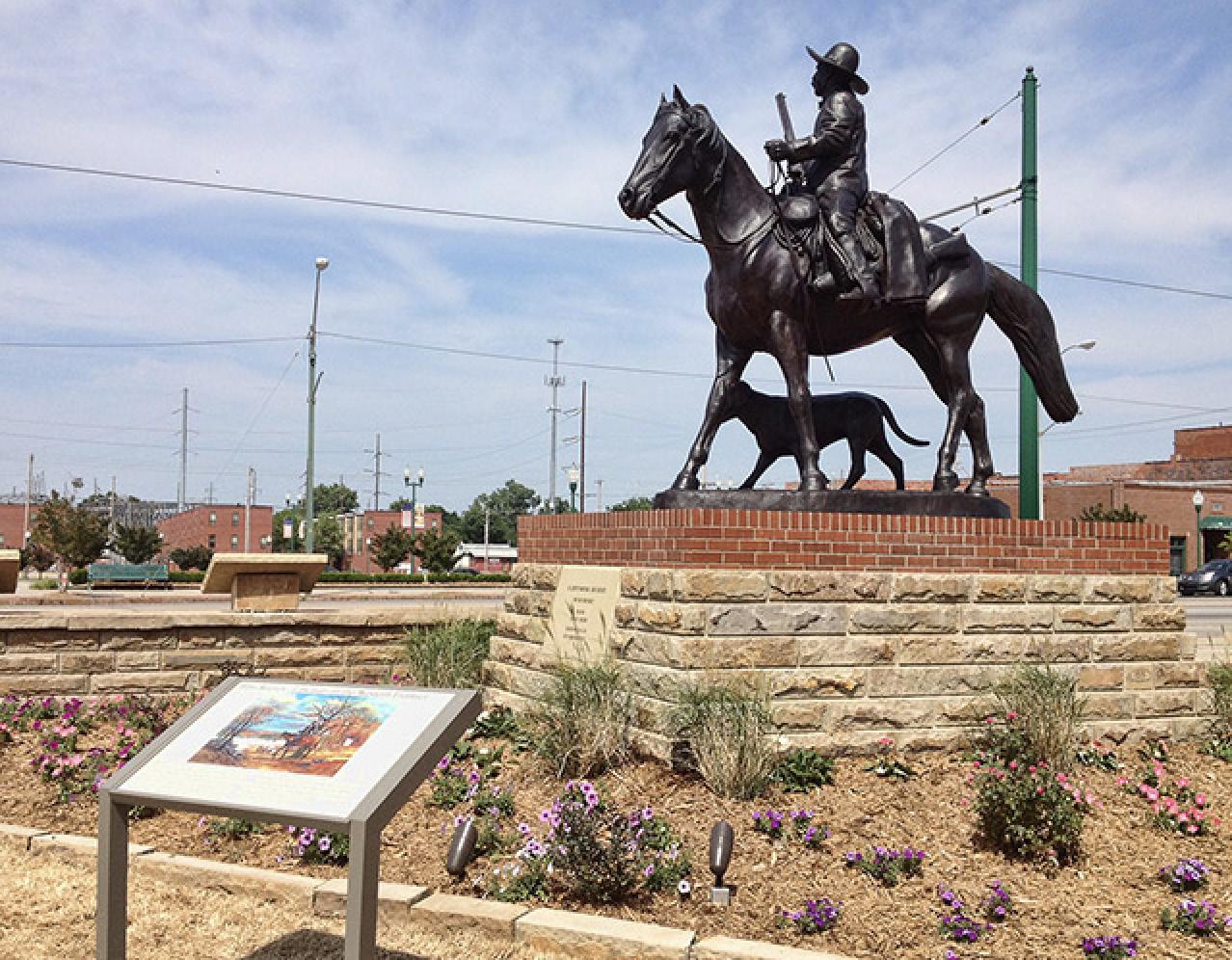
Fort Smith became known as the place “where the Lawless West met the Civilized East.”A monument to Bass Reeves in Fort Smith; a replica of the Hanging Judge’s infamous gallows.
For those of us native Little Rockers old enough to remember, Capitol Avenue downtown once lived out the vision of the city’s original planners. That of promenade connecting the central business district with the state’s seat of government, that magnificent Capitol dome framing the western horizon. And so it was — along its thoroughfare, scores of hotels, offices, restaurants and businesses once thrived.
Capitol Avenue was the beating heart of the city for business and commerce.
Little Rock, of course, wasn’t immune to the “surbanization” that afflicted most U.S. cities. Beginning in the latter half of the 20th century, the once grand Capitol Avenue corridor grew less vibrant as more workers headed home at the each of each work day to the likes of Conway, Bryant or Cabot. And those who lived in town were drawn to the eventual retail siren calls of University Avenue, Rodney Parham Road and eventually, Chenal. (We’re coming for you, Perryville.)
But Capitol Avenue once teemed with life; it didn’t shut down after 5 and on weekends. One of my favorite old photos, believed to have been taken in the late 1940s, depicts my grandparents, Lib and Gordy Price. In it (shown at right), wearing satisfied if not slightly mischievous grins and looking like they know where the loot is buried, Gran and Papa are walking armin-arm past the original Franke’s Cafeteria on Capitol.
And that iconic dining establishment by no means represented the typical cafeteria experience that came to be defined by Luby’s. Men in white coats and gloves carried one’s tray to the table — the antique light fixtures on the walls providing an elegant soft yellow vibe that exuded “fine dining.” One may have been eating chopped steak and Jello served on a tray, but one still dressed for dinner. And dinner was good. Franke’s was no weekday lunch spot, either; it was destination dining seven days a week.
But then came the late ‘60s, and Little Rock stretched its cramped arms westward.
I don’t know whether Gran and Papa had just come out of Franke’s when that photo was taken. But in it, they look content — Papa’s fedora slipped back on his head just so and cocked to the side. (For some reason, every time I see that picture, I think of Bonnie and Clyde — in a good way, of course — and wonder

Capitol Avenue in downtown Little Rock once buzzed like a hive; the scene captured in that old photo somehow conveys the white noise of a beating urban heart. Gran and Papa may as well have been strolling down Madison Avenue. A picture paints a thousand words and all…
Today, the sounds of worker bees can still be heard along the four blocks that lay between Main and Broadway — inside those weekday hours labeled “rush” and “lunch,” anyway.
Downtown Little Rock itself seems to be doing just fine — COVID notwithstanding. The River Market, brought to life in the 1990s out of a forgotten corner of the CBD, remains a success story. And the ongoing evolution of lower Main as well as the South Main and East Village districts has infused some life back into downtown and its periphery. And don’t forget about the transformation of the old Arts Center into the Arkansas Museum of Fine Arts and its embrace of McArthur Park. Important pieces of the puzzle are being placed.
But the key word in most of that is periphery. To complete the puzzle, the Capitol Avenue corridor needs to be brought back to something its former self.
I’m not pointing out anything new. As the venerable scribe, Rex Nelson, has written extensively, a healthy heart is crucial to the vibrancy of a city. And as he reminds, like it or not (for those expats north of the tunnel) — as Little Rock goes, so goes Arkansas.
Signs of life are there to be found on Capitol Avenue. The swanky AC Hotel, opened on Capitol in 2020, defied a pandemic. Developers recently purchased two of Little Rock’s iconic skyscrapers, each with a Capitol Avenue address, with plans to plant retail and entertainment seeds along the corridor.
Capitol Avenue has its corps of believers, among them investors willing to bet on its future. Perhaps one day soon the Capitol corridor of old, at least between Main and Broadway, will re-emerge and the buzz of worker bees return after 5 and on weekends.
For Little Rock to fully realize its potential, that final piece of the big-picture puzzle needs to be placed. The city could use more re-enactments of Lib and Gordy’s carefree jaunt down Capitol some 75 years ago.













